Bachelor's degree in Primary Education
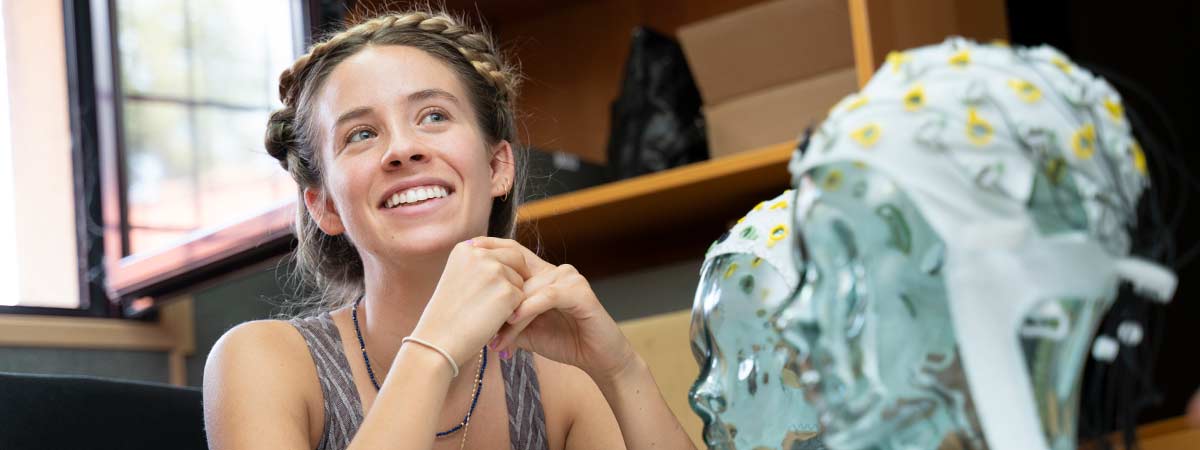
With the option of studying the Bachelor's Degree in Spanish and English
The Bachelor's Degree in Primary Education prepares the student to be aware of the current reality in classrooms, training the so-called teachers of educational change. It is a Degree that seeks to make a vocation the student's future. The program includes extensive language skills training, both in Spanish and English, to respond to the demands of educational administrations and society in general for this profession.
To this end, framed within the European Higher Education Area, it intends to promote the internationalization of students, improving their language skills and their knowledge about other cultures and teaching models. In this way, future teachers will be prepared to teach students according to the educational needs of society.
The changing Spanish society has provoked in universities the need to respond to these demands. The curricula have been updated to satisfy all aspirations and adapt their content to the different problems and needs of the population.
Our students, future educators at the beginning of our children's school life, can choose the way that best suits them to study the Degree: class attendance, blended or online. In this way, it responds to a current demand of students, who need the possibility to combine their studies with their work or family life.
Some of the general objectives of the program are:
- Provide all children with an education that will strengthen their personal development and their own well-being.
- Acquire basic cultural skills related to oral expression and comprehension, reading, writing and calculation.
- Develop social skills, work and study habits, artistic sense, creativity and affectivity.
- Integrate students’ different experiences and learning styles.
- Respect different work paces.
Becas atracción de Talento - Reconocemos tu potencial y queremos impulsarlo.
Talent Attraction Scholarships – We recognize your potential and want to help you grow.
Si cuentas con un perfil académico destacado, puedes optar a una beca de hasta el 40% para comenzar tu formación universitaria con nosotros.
If you have an outstanding academic profile, you may be eligible for a scholarship of up to 40% to begin your university studies with us.
Solicita información Request informationThe School of Languages and Education teaches all its degrees in the renovated facilities of the Madrid-Princesa Campus, a few steps from Puerta del Sol and close to museums, galleries, institutions and transport.
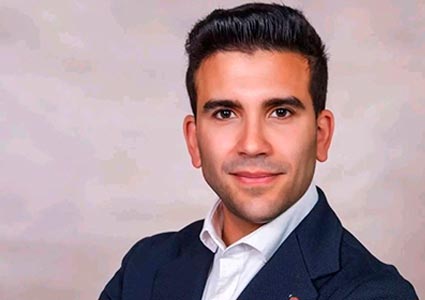
Alfonso González Garrido, Nominated for the EDUCA ABANCA Best Teacher in Spain 2024 Award
At Nebrija University, we pride ourselves on having the best. Our very own professor, Alfonso González Garrido, has been nominated for the Best Teacher in Spain 2024 at the EDUCA ABANCA Awards. Congratulations, Alfonso!
Neuroscience applied to the teaching and learning process
Curriculum
All our degrees and curricula have been prepared in accordance with the new guidelines set by current legislation, having already been verified by the National Agency for Quality Assessment.
The student must complete 240 credits
First year 60 ECTS
First Semester 30 ECTS- 6 ECTS | The curriculum in Primary Education
- 6 ECTS | Society, family and school
- 6 ECTS | Behavior Modification in the classroom
- 6 ECTS | Strategies for oral and written communication in English I

- 6 ECTS | Spanish Language and Communication I
Second Semester 24 ECTS- 6 ECTS | Educational Theories and Systems
- 6 ECTS | Organization of the Classroom and the School Center
- 6 ECTS | Educational Development Psychology
- 6 ECTS | Attention to Linguistic and Cultural Diversity

Yearly 6 ECTS- 6 ECTS | Practicum I
Second year 60 ECTS
First Semester 28 ECTS- 6 ECTS | Educational Methodology, Innovation and Research

- 6 ECTS | Tutorial action and guidance
- 6 ECTS | Strategies for oral and written communication in English II

- 6 ECTS | Spanish Language and Communication II
- 6 ECTS | Mathematics
Second Semester 24 ECTS- 6 ECTS | Special educational needs in the classroom
- 6 ECTS | Principles of Experimental Sciences

- 6 ECTS | ICTs in Education

- 6 ECTS | Teaching Mathematics
Yearly 8 ECTS- 8 ECTS | Practicum II
Third year 60 ECTS
First Semester 24 ECTS- 6 ECTS | Literature
- 6 ECTS | Social sciences and its didactics

- 6 ECTS | Teaching language and literature
- 6 ECTS | Uses and functions of the English language I

Second Semester 24 ECTS- 6 ECTS | Physical education and its didactics

- 6 ECTS | Music education and its didactics

- 6 ECTS | Didactics of plastic and creative expression

- 6 ECTS | Elective/concentration
Yearly 12 ECTS- 12 ECTS | Practicum III

Fourth year 60 ECTS
First Semester 24 ECTS- 6 ECTS | Uses and functions of the English language II

- 6 ECTS | Teaching experimental sciences

- 6 ECTS | Elective/concentration
- 6 ECTS | Elective/concentration
Second Semester 24 ECTS- 6 ECTS | Elective/concentration
- 6 ECTS | Elective/concentration
- 12 ECTS | Final Research Project
Yearly 12 ECTS- 12 ECTS | Practicum IV

More info about the subjects
In accordance with article 12.6 of R.D. 1393/2007 of October 29, students can obtain academic recognition in credits for participation in cultural, sports, student representation, solidarity and cooperation activities up to a maximum of 6 credits.
- 6 ECTS | Competence Seminar I
- 6 ECTS | Competence Seminar II
- 6 ECTS | Competence Seminar III
- 6 ECTS | Contemporary Spain
- 6 ECTS | Introduction to the religious and Christian fact
- 6 ECTS | Behavior and Learning Disorders
Concentration in Foreign Language (English)
- 6 ECTS | Second language learning (3rd year, 2nd Semester)

- 6 ECTS | English methodologies and didactic resources (4th year, 1st Semester)

- 6 ECTS | Rhythm, play and games (4th year, 1st Semester)

- 6 ECTS | Literature & culture of English-speaking countries (4th year, 2nd Semester)

- 6 ECTS | English Phonics: Reading and writing (4th year, 2nd Semester)
 (4º curso, 2º semestre)
(4º curso, 2º semestre)
Concentration in Foreign Language (French)
- 6 ECTS | Littérature et culture dans les pays francophones (4º curso, 2º semestre)
- 6 ECTS | Enseignement des langues secondes (3º curso, 2º semestre)
- 6 ECTS | Méthodologies et ressources didactiques pour l'enseignement du français (4º curso, 1º semestre)
- 6 ECTS | Rythme, jeux et chansons (4º curso, 1º semestre)
- 6 ECTS | Phonétique française: lire et écrire (4º curso, 2º semestre)
Concentration in Therapeutic Pedagogy
- 6 ECTS | Learning difficulties and neurodevelopmental disorders (3rd year, 2nd Semester)
- 6 ECTS | The child with hearing impairment (4th year, 1st Semester)
- 6 ECTS | Visual impairment (4th year, 1st Semester)
- 6 ECTS | Motor deficiency (4th year, 2nd Semester)
- 6 ECTS | Education of children with high abilities (6 ECTS) (4th year, 2nd Semester)
Concentration in Physical Education
- 6 ECTS | Basic physical education (3rd year, 2nd Semester)
- 6 ECTS | Learning and motor control (4th year, 1st Semester)
- 6 ECTS | Physical education and health in school contexts (4th year, 1st Semester)
- 6 ECTS | Design, development and evaluation of physical education (4th year, 2nd Semester)
- 6 ECTS | Motor games and physical education (6 ECTS credits) (4th year, 2nd Semester)
Concentration in Hearing and Language
- 6 ECTS | Communication and language (3rd year, 2nd Semester)
- 6 ECTS | Alterations of voice and articulation (4th year, 1st Semester)
- 6 ECTS | Alterations of written language (4th year, 1st Semester)
- 6 ECTS | Hearing difficulties (4th year, 2nd Semester)
- 6 ECTS | Augmentative and alternative systems of communication (4th year, 2nd Semester)
- 6 ECTS | Competence Seminar I (3rd Year, 2nd Semester)
- 6 ECTS | Competence Seminar II (4th Year, 1st Semester)
- 6 ECTS | Competence Seminar III (4th Year, 2nd Semester)
The recognition of 6 credits will be assessed depending on the different activities that the student performs throughout his degree. They will be awarded for university cultural activities, sports, student representation, solidarity and cooperation, or for taking one of the following subjects: Ethics of volunteering or Human Rights.
School internships whose objective is to favor the practical training of the students, under the continuous supervision of a tutor of the University, the academic department of Education and a tutor of the corresponding educational center.
The Professional Internships allow our students to experience their activity as a future professional of education in educational environments, thus combining it with the theoretical knowledge obtained in the different subjects. For this, external internships are carried out in all the academic years.
The evaluation process for each practicum employs a weighted approach to ensure a thorough assessment of acquired skills and knowledge:
The center tutor report carries the primary weight, making up 75% of the total score. This report extensively evaluates the student's performance during their professional internships. Additionally, the Final Practicum Report contributes 25%, allowing students to present a comprehensive summary of their experience and engage in reflective analysis.
- 38 ECTS | CDS Subjects
- 6 ECTS | Practicum I
- 8 ECTS | Practicum II
- 12 ECTS | Practicum III
- 12 ECTS | Practicum IV
Internal procedure for Management of external internships
The University carries out the allocation of internship placements in the Educational Centers according to the regulations in force in each Autonomous Community.
The procedure for assigning placements is carried out in the following phases:
- a)Application for Center: the student completes the request form for Preferential Centers to carry out the internship, taking into account the regulations of each Autonomous Community.
- b)Documentation collection phase: in this phase, the Department of Professional Careers reviews the applications and confirms if they meet the requirements established by each Community.
- c)Center allocation phase: The Professional Careers Department establishes the communication process with the Centers to assign placements to students. In this sense, the deadlines set by each Ministry and the availability of the Centers and the students are taken into account.
- d)Submission of documentation: the student submits the required documents to the Department of Professional Careers, and once it is reviewed and approved, authorization is given to the student to start the internship on the dates established according to availability of the Educational Center.
- e)Submission of documentation to the Center: the Practicum Academic Coordination Department of the University sends the professional tutor the orientation guides of the Practicum and the certificates to evaluate the performance of the student during the Practicum.
This project involves the development of research tasks regarding different subjects by the student under the advice of one or several professors of the Department and, occasionally, professionals from the business world. For this, the student has the possibility to choose a project from among those offered.
Nebrija University, which is committed to languages and quality, provides the student with added value with the Diploma in English Professional Communication, which will allow him/her to achieve with confidence the competence demanded to successfully join the labor market.
It corresponds to level C1.
More information here2015 Curriculum (to be discontinued)
The student must take 240 créditos
First year 60 ECTS
First Semester 30 ECTS- 6 ECTS | The curriculum in Primary Education
- 6 ECTS | Sociology of Education
- 6 ECTS | General Didactics
- 6 ECTS | Spanish Language and Communication I
- 6 ECTS | Development of the Participatory and Solidarity Spirit
Second Semester 30 ECTS- 6 ECTS | Educational Theories and Systems
- 6 ECTS | Attention to Linguistic and Cultural DiversityAtención a la Diversidad Lingüística y Cultural

- 6 ECTS | Organization of the Classroom and the School Center
- 6 ECTS | Psychology of Educational Development from 6 to 12 years
- 6 ECTS | Competence Development Seminar ISeminario de Desarrollo de Competencias I

Second year 60 ECTS
First Semester 30 ECTS- 6 ECTS | Educational Methodology, Innovation and Research

- 6 ECTS | Spanish Language and Communication II
- 6 ECTS | Strategies for Oral and Written Communication in the English Language I

- 6 ECTS | Mathematics
- 6 ECTS | Teaching of language and literature
Second Semester 30 ECTS- 6 ECTS | ICTs in Primary Education

- 6 ECTS | Natural Sciences

- 6 ECTS | Strategies for Oral and Written Communication in the English Language II

- 6 ECTS | Professional Competences II

- 6 ECTS | Practicum I
Third year 60 ECTS
First Semester 30 ECTS- 6 ECTS | Uses and Functions of the English Language I

- 6 ECTS | Uses and Functions of the English Language I

- 6 ECTS | Learning a Second Language

- 6 ECTS | Literature
- 6 ECTS |
Practicum II

Second Semester 30 ECTS- 6 ECTS | Didactics of Plastic and Creative Expression

- 6 ECTS | Didactics of Music Education

- 6 ECTS | Physical Education and its Didactics

- 12 ECTS |
Practicum III

Cuarto curso 60 ECTS
First Semester 30 ECTS- 6 ECTS | Teaching Mathematics

- 6 ECTS | Social Sciences and its Didactics

- 6 ECTS | Introduction to the Religion and Christianity
- 6 ECTS | Attention to other educational abilities
- 6 ECTS | Literature and Culture of English-Speaking Countries I

- 12 ECTS |
Practicum IV

Second Semester 30 ECTS- 6 ECTS | Teaching experimental sciences
- 6 ECTS | Professional Competences III

- 4 ECTS | Literature and Culture of English-Speaking Countries II

- 4 ECTS | Contemporary Spain
- 4 ECTS | Special Educational Needs in the Classroom
- 14 ECTS | Final Research Project
More information on these subjects
Concentration in Foreign Language (English)In order to obtain a Concentration in Foreign Language, students must pass 54 credits of the Curriculum by taking courses that are offered in Spanish and English. Obtaining the concentration in a foreign language requires that the subjects be taken in English.
Below are the subjects that make up the concentration:
- Professional competences I, II and III (Compulsory/18 ECTS credits)
- Strategies for oral and written communication in the English Language I and II (Compulsory/12 ECTS credits)
- Uses and functions of the English language I and II (Compulsory/12 ECTS credits)
- Learning second languages (Compulsory/6 ECTS credits)
- Literature and culture of English-speaking countries I (Elective/6 ECTS credits)
- 6 ECTS | CD Seminar: Communication and Emotional Intelligence
- 6 ECTS | CD Seminar: Teamwork and Project Management
- 6 ECTS | CD Seminar: Leadership and Negotiation
The recognition of 6 credits will be arranged according to the different activities that the student carries out throughout his/her degree. They will be awarded for cultural activities, sports, student representation, solidarity and cooperation, and/or to attend one of the following subjects: Ethics of Volunteering or Human Rights.
A program whose objective is to favor the practical training of the students, under the continuous supervision of the Department of Professional Careers of the University, the academic department corresponding to the degree and the company or collaborating institution where the internships are carried out. We provide advice on the choice of internships and follow-up and tutoring, always considering the professional orientation of each student.
- 6 ECTS | Practicum I
- 6 ECTS | Practicum II
- 12 ECTS | Practicum II
- 12 ECTS | Practicum IV
Links of interest
More information on Internships in CompaniesThis project involves the development of research tasks regarding different subjects by the student under the advice of one or several professors of the Department and, occasionally, professionals from the business world. For this, the student has the possibility to choose a project from among those offered.
Bachelor's Degree in Early Childhood Education for Teachers in Primary Education
Program for: Program aimed at graduated professionals of Early Childhood Education who want to obtain the Undergraduate Degree in Primary Education.
Modality: Classroom attendance and distance learning. Schedule adapted to professionals.
Required English level: A2 (Monolingual modality), B2 (Bilingual modality)
Official degree: Bachelor's Degree in Primary Education.
Professors
| Profesores Professors | Porcentaje de Doctores Percentage of PhD holders |
| 136 | 60% |
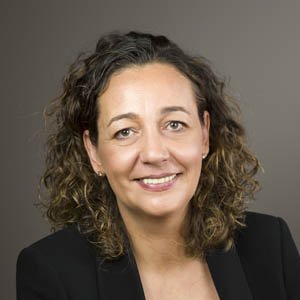 Nuria Camuñas Sánchez-Paulete
Vicedecana de la Facultad de Lenguas y Educación
Vice Dean of the Faculty of Languages and Education
Doctora en Psicología por la UCM. Máster en Intervención en la Ansiedad y el Estrés (UCM). Licenciada con grado en Psicología (UCM). Vicedecana y directora del Departamento de Educación, Facultad de Lenguas y Educación. Profesora de grado y postgrado en esa misma facultad. Docente de distintos cursos de formación y máster, sobre ansiedad, emociones y educación, estrés, modificación de conducta y dificultades del aprendizaje. Autora de distintas publicaciones y presentaciones en congresos relacionadas con procesos cognitivos, emoción y educación, prevención y control del estrés, etc. Miembro del grupo de investigación CEDI (Cognición, Educación y Diferencias Individuales). Otras líneas de investigación: Cognición, Emoción, Salud y Educación.
ncamunas@nebrija.es
Nuria Camuñas Sánchez-Paulete
Vicedecana de la Facultad de Lenguas y Educación
Vice Dean of the Faculty of Languages and Education
Doctora en Psicología por la UCM. Máster en Intervención en la Ansiedad y el Estrés (UCM). Licenciada con grado en Psicología (UCM). Vicedecana y directora del Departamento de Educación, Facultad de Lenguas y Educación. Profesora de grado y postgrado en esa misma facultad. Docente de distintos cursos de formación y máster, sobre ansiedad, emociones y educación, estrés, modificación de conducta y dificultades del aprendizaje. Autora de distintas publicaciones y presentaciones en congresos relacionadas con procesos cognitivos, emoción y educación, prevención y control del estrés, etc. Miembro del grupo de investigación CEDI (Cognición, Educación y Diferencias Individuales). Otras líneas de investigación: Cognición, Emoción, Salud y Educación.
ncamunas@nebrija.es
 María del Pilar Salvá Soria
Coordinadora de alumnos (Modalidad presencial)
Student coordinator (Clashroom attendance modality)
Doctora en Filosofía con Mención Internacional por la Universidad Complutense de Madrid (UCM). Posee un Máster Universitario en Epistemología de las Ciencias Naturales y Sociales (UCM) y un Máster en Formación del Profesorado de Educación Secundaria y Bachillerato (Pontificia Comillas). Actualmente, es Profesora Ayudante Doctora, Profesora de Universidad Privada y está acreditada como Profesora Contratada Doctora por ANECA. Sus líneas de investigación se centran en la epistemología, la metodología de la investigación científica y el pragmatismo americano. Ha publicado en revistas y editoriales de prestigio internacional. Ha participado en tres proyectos de innovación educativa financiados por la UCM y es miembro del grupo de investigación financiado por el Ministerio, Cognitive Vulnerability, Verisimilitude and Truth (FFI2017-84826-P). Ha sido cofundadora y presidenta de la Asociación de Epistemología de la UCM y miembro de la Sociedad Richard Rorty. Además, coordinó el Máster Propio en Ciencia y Filosofía: Construyendo el Futuro (UCM) y colabora con distintas universidades impartiendo clases y seminarios. Actualmente, es docente y coordinadora de los Grados en Educación de la Universidad Nebrija.
msalva@nebrija.es
María del Pilar Salvá Soria
Coordinadora de alumnos (Modalidad presencial)
Student coordinator (Clashroom attendance modality)
Doctora en Filosofía con Mención Internacional por la Universidad Complutense de Madrid (UCM). Posee un Máster Universitario en Epistemología de las Ciencias Naturales y Sociales (UCM) y un Máster en Formación del Profesorado de Educación Secundaria y Bachillerato (Pontificia Comillas). Actualmente, es Profesora Ayudante Doctora, Profesora de Universidad Privada y está acreditada como Profesora Contratada Doctora por ANECA. Sus líneas de investigación se centran en la epistemología, la metodología de la investigación científica y el pragmatismo americano. Ha publicado en revistas y editoriales de prestigio internacional. Ha participado en tres proyectos de innovación educativa financiados por la UCM y es miembro del grupo de investigación financiado por el Ministerio, Cognitive Vulnerability, Verisimilitude and Truth (FFI2017-84826-P). Ha sido cofundadora y presidenta de la Asociación de Epistemología de la UCM y miembro de la Sociedad Richard Rorty. Además, coordinó el Máster Propio en Ciencia y Filosofía: Construyendo el Futuro (UCM) y colabora con distintas universidades impartiendo clases y seminarios. Actualmente, es docente y coordinadora de los Grados en Educación de la Universidad Nebrija.
msalva@nebrija.es
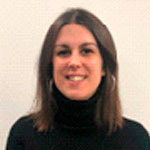 Renata Valle Lapeña
Coordinadora académica (modalidad virtual)
Academic coordinator (online format)
Licenciada en Pedagogía y Diplomada en Educación Social por la UCM, Graduada en Educación Primaria por la UCJC, así como en posesión de Máster Universitario en Dirección y Gestión para la Calidad de Centros Educativos por la UFV y Máster Experto en Enseñanza del Español como Lengua Extranjera por la UNED. Su trayectoria profesional en la última década se ha orientado a la formación de futuros maestros en diversas Universidades españolas, así como a la gestión y coordinación académica de los Grados en Educación en la Universidad Antonio de Nebrija.rvalle@nebrija.es
Renata Valle Lapeña
Coordinadora académica (modalidad virtual)
Academic coordinator (online format)
Licenciada en Pedagogía y Diplomada en Educación Social por la UCM, Graduada en Educación Primaria por la UCJC, así como en posesión de Máster Universitario en Dirección y Gestión para la Calidad de Centros Educativos por la UFV y Máster Experto en Enseñanza del Español como Lengua Extranjera por la UNED. Su trayectoria profesional en la última década se ha orientado a la formación de futuros maestros en diversas Universidades españolas, así como a la gestión y coordinación académica de los Grados en Educación en la Universidad Antonio de Nebrija.rvalle@nebrija.es
 Andreina Sordo Castro
Coordinadora académica del Grado en Educación Primaria (Modalidad A distancia)
Academic Coordinator of the Degree in Primary Education (Online Modality)
Graduada en Pedagogía por la Universidad de Oviedo. Técnico Superior en Integración Social. Inició su trayectoria profesional en centros de atención a menores en riesgo de exclusión social ofreciendo apoyo en tareas escolares y orientación pedagógica. También participó durante varios años como coordinadora y monitora de campamento. Posteriormente, fue enfocando su profesión a la vertiente empresarial de la pedagogía ejerciendo funciones de organización y gestión de formación para profesionales del sector educativo, hasta adentrarse en la labor docente en el ámbito universitario principalmente como docente en la asignatura Competencias Profesionales III y de TFG de alumnos en los Grados en Educación de la Universidad Camilo José Cela y de la Universidad Antonio de Nebrija.
asordo@nebrija.es
Andreina Sordo Castro
Coordinadora académica del Grado en Educación Primaria (Modalidad A distancia)
Academic Coordinator of the Degree in Primary Education (Online Modality)
Graduada en Pedagogía por la Universidad de Oviedo. Técnico Superior en Integración Social. Inició su trayectoria profesional en centros de atención a menores en riesgo de exclusión social ofreciendo apoyo en tareas escolares y orientación pedagógica. También participó durante varios años como coordinadora y monitora de campamento. Posteriormente, fue enfocando su profesión a la vertiente empresarial de la pedagogía ejerciendo funciones de organización y gestión de formación para profesionales del sector educativo, hasta adentrarse en la labor docente en el ámbito universitario principalmente como docente en la asignatura Competencias Profesionales III y de TFG de alumnos en los Grados en Educación de la Universidad Camilo José Cela y de la Universidad Antonio de Nebrija.
asordo@nebrija.es
 Esther Tietje Fonollosa
Coordinadora de alumnos (Modalidad A distancia)
Student Coordinator (Online Modality)
Graduada en Educación Infantil en la Universidad de Alicante y Máster Universitario en Educación Especial por la Universidad Complutense de Madrid. Experiencia como maestra la etapa de Infantil y actualmente dedicada a la formación de maestros.
Esther Tietje Fonollosa
Coordinadora de alumnos (Modalidad A distancia)
Student Coordinator (Online Modality)
Graduada en Educación Infantil en la Universidad de Alicante y Máster Universitario en Educación Especial por la Universidad Complutense de Madrid. Experiencia como maestra la etapa de Infantil y actualmente dedicada a la formación de maestros.
etietje@nebrija.es
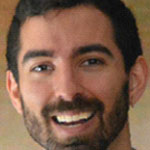 Javier Agüera Hernández
Profesor y Director TFG
Professor and FRP Director
Graduado en Psicología por la Universidad de Murcia. Habilitado como mediador por esta misma universidad. Con máster en Psicología General Sanitaria. Ejerce como psicólogo general sanitario en población general. Además de divulgar a través del canal Neuroentropía. Canal dedicado a la difusión de contenido científico relativo a la salud mental.
Javier Agüera Hernández
Profesor y Director TFG
Professor and FRP Director
Graduado en Psicología por la Universidad de Murcia. Habilitado como mediador por esta misma universidad. Con máster en Psicología General Sanitaria. Ejerce como psicólogo general sanitario en población general. Además de divulgar a través del canal Neuroentropía. Canal dedicado a la difusión de contenido científico relativo a la salud mental.
jaguera@nebrija.es
 Zeina Alhmoud
Profesora y Directora TFG
Professor and FRP Director
Doctora en Lingüística Aplicada a la enseñanza de lenguas por la Universidad de Granada (2016). Licenciada en Lenguas Modernas (español e inglés) por la Universidad de Jordania (2006). Tiene más de cuatro años de experiencia como profesora de inglés como lengua extranjera. Ha hecho varios trabajos de ilustración y elaboración de presentaciones didácticas, entre ellos el proyecto de investigación, financiado por el Ministerio de Educación y Ciencia de España, “Gramática avanzada de español lengua” extranjera (FFI2009-13107). Universidad de Granada (Investigador Principal Alejandro Castañeda Castro). Actualmente es profesora del Departamento de Lenguas aplicadas de la Universidad Nebrija. Imparte clases en el Grado de Lenguas Modernas, el Máster en Didáctica de ELE y el Máster en Lingüística Aplicada. Es miembro del grupo de investigación LAELE de la Universidad Nebrija y participa en el proyecto de investigación del Plan Regional (IN.MIGRA2-CM). Su área de investigación se centra en la lingüística cognitiva y su aplicación a la enseñanza de segundas lenguas, y el uso de las imágenes y animaciones en el aula de L2. Tiene especial interés en el diseño de ilustraciones y materiales didácticos.
Zeina Alhmoud
Profesora y Directora TFG
Professor and FRP Director
Doctora en Lingüística Aplicada a la enseñanza de lenguas por la Universidad de Granada (2016). Licenciada en Lenguas Modernas (español e inglés) por la Universidad de Jordania (2006). Tiene más de cuatro años de experiencia como profesora de inglés como lengua extranjera. Ha hecho varios trabajos de ilustración y elaboración de presentaciones didácticas, entre ellos el proyecto de investigación, financiado por el Ministerio de Educación y Ciencia de España, “Gramática avanzada de español lengua” extranjera (FFI2009-13107). Universidad de Granada (Investigador Principal Alejandro Castañeda Castro). Actualmente es profesora del Departamento de Lenguas aplicadas de la Universidad Nebrija. Imparte clases en el Grado de Lenguas Modernas, el Máster en Didáctica de ELE y el Máster en Lingüística Aplicada. Es miembro del grupo de investigación LAELE de la Universidad Nebrija y participa en el proyecto de investigación del Plan Regional (IN.MIGRA2-CM). Su área de investigación se centra en la lingüística cognitiva y su aplicación a la enseñanza de segundas lenguas, y el uso de las imágenes y animaciones en el aula de L2. Tiene especial interés en el diseño de ilustraciones y materiales didácticos.
zdalhmoud@nebrija.es
 Rosa Amor del Olmo
Profesora y Directora TFG
Professor and FRP Director
Doctora acreditada en Filosofía y Letras (Filología Hispánica) por la UAM, además de completar sus estudios con un segundo Doctorado en Teología y Ética (UNED) y un Máster en Formación del profesorado (Nebrija). Profesora de Lengua, Literatura y filosofía en diversas universidades, es considerada en la profesión académica como una de las cinco mejores hispanistas del mundo especializada en la obra galdosiana, tal y como lo demuestran sus trabajos de investigación en manuscritos decimonónicos y su programa de traducción de la obra de Benito Pérez Galdós a diferentes lenguas y con distintos traductores bajo un mismo proyecto apoyado por el Ministerio de Cultura Español. Es autora de numerosas publicaciones de crítica literaria, ensayo y ediciones especializadas en Literatura del siglo XIX y XX.
ramorol@nebrija.es
Rosa Amor del Olmo
Profesora y Directora TFG
Professor and FRP Director
Doctora acreditada en Filosofía y Letras (Filología Hispánica) por la UAM, además de completar sus estudios con un segundo Doctorado en Teología y Ética (UNED) y un Máster en Formación del profesorado (Nebrija). Profesora de Lengua, Literatura y filosofía en diversas universidades, es considerada en la profesión académica como una de las cinco mejores hispanistas del mundo especializada en la obra galdosiana, tal y como lo demuestran sus trabajos de investigación en manuscritos decimonónicos y su programa de traducción de la obra de Benito Pérez Galdós a diferentes lenguas y con distintos traductores bajo un mismo proyecto apoyado por el Ministerio de Cultura Español. Es autora de numerosas publicaciones de crítica literaria, ensayo y ediciones especializadas en Literatura del siglo XIX y XX.
ramorol@nebrija.es
 Sonia Andrés García
Profesora y Directora TFG
Professor and FRP Director
Licenciada en Psicología. Compagina la docencia universitaria con la elaboración y actualización de materiales precisos para alumnos opositores a Maestros de Pedagogía Terapéutica y Maestros especialistas en Audición y Lenguaje. Posee experiencia en formación de adultos relacionada con Recursos Humanos en sector bancario, impartiendo cursos de bienvenida, política de empresa y clima laboral.
sandres@nebrija.es
Sonia Andrés García
Profesora y Directora TFG
Professor and FRP Director
Licenciada en Psicología. Compagina la docencia universitaria con la elaboración y actualización de materiales precisos para alumnos opositores a Maestros de Pedagogía Terapéutica y Maestros especialistas en Audición y Lenguaje. Posee experiencia en formación de adultos relacionada con Recursos Humanos en sector bancario, impartiendo cursos de bienvenida, política de empresa y clima laboral.
sandres@nebrija.es
 Alba Aranda Larrey
Profesora y Directora TFG
Professor and FRP Director
Graduada profesionalmente en Música Moderna por la Escuela de Música Creativa de Madrid con la especialidad de Flauta Travesera y formada en Música Clásica en el Conservatorio profesional de Música de Cuenca. Postgrado en Estudios africanos por la Universidad Autónoma de Madrid y Licenciada en Ciencias políticas por la Universidad Complutense de Madrid.
Ha trabajado como docente en Escuelas de Música Municipales de la Comunidad de Madrid, en Colegios y academias privadas(EMC). Ha participado como música y docente en Festivales Internacionales de Música, así como en residencias artísticas y proyectos internacionales. Además, ha participado como flautista en la grabación de varios álbumes como Flamenco Americana de Kati Golenko.
Actualmente trabaja en la Escuela de Música Creativa de Madrid, dirige un coro de Mujeres en el espacio de igualdad del ayuntamiento de Madrid Hermanas Mirabal. Es docente para la Mención de Música del grado de educación de la Universidad del Atlántico Medio, donde también dirige TFG. Es docente de Educación musical y su didáctica y directora de TFG en la Universidad Nebrija.
aaranda@nebrija.es
Alba Aranda Larrey
Profesora y Directora TFG
Professor and FRP Director
Graduada profesionalmente en Música Moderna por la Escuela de Música Creativa de Madrid con la especialidad de Flauta Travesera y formada en Música Clásica en el Conservatorio profesional de Música de Cuenca. Postgrado en Estudios africanos por la Universidad Autónoma de Madrid y Licenciada en Ciencias políticas por la Universidad Complutense de Madrid.
Ha trabajado como docente en Escuelas de Música Municipales de la Comunidad de Madrid, en Colegios y academias privadas(EMC). Ha participado como música y docente en Festivales Internacionales de Música, así como en residencias artísticas y proyectos internacionales. Además, ha participado como flautista en la grabación de varios álbumes como Flamenco Americana de Kati Golenko.
Actualmente trabaja en la Escuela de Música Creativa de Madrid, dirige un coro de Mujeres en el espacio de igualdad del ayuntamiento de Madrid Hermanas Mirabal. Es docente para la Mención de Música del grado de educación de la Universidad del Atlántico Medio, donde también dirige TFG. Es docente de Educación musical y su didáctica y directora de TFG en la Universidad Nebrija.
aaranda@nebrija.es
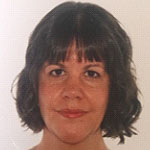 Nadia M. Arias González
Profesora y Directora TFG
Professor and FRP Director
Licenciada en Filología Inglesa y Filología Hispánica (USAL). Máster en Enseñanza del español como lengua extranjera (USAL). Profesora de grado en la Universidad de Salamanca y en la Universidad Antonio de Nebrija.
nariasg@nebrija.es
Nadia M. Arias González
Profesora y Directora TFG
Professor and FRP Director
Licenciada en Filología Inglesa y Filología Hispánica (USAL). Máster en Enseñanza del español como lengua extranjera (USAL). Profesora de grado en la Universidad de Salamanca y en la Universidad Antonio de Nebrija.
nariasg@nebrija.es
 Tania Ariza Castilla
Directora TFG
FRP Director
Doctora acreditada. Licenciada en Pedagogía, Máster en Diseños de Investigación y Aplicaciones en Psicología y Salud, y Doctora en Psicología por la Universidad de Granada. Además, tiene el título de Experto Universitario en Aprendizaje y Enseñanza Universitaria Online. Ha impartido docencia en el departamento de Psicología evolutiva y de la educación y en el de Metodología de las Ciencias del Comportamiento de la Universidad de Granada, así como en el departamento de Psicología de la educación y psicobiología de la Universidad Internacional de La Rioja. También, pertenece al grupo de investigación “Procesamiento de la información y toma de decisiones” de la Universidad de Granada. Sus publicaciones científicas se centran en el estudio bibliométrico de revistas relacionadas con la educación, la evaluación de la educación superior y el síndrome de burnout en colectivos en riesgo de padecerlo. Ha sido miembro del comité científico y organizador de congresos internacionales sobre Educación Superior y es revisora de artículos de revistas de psicología y educación.
Tania Ariza Castilla
Directora TFG
FRP Director
Doctora acreditada. Licenciada en Pedagogía, Máster en Diseños de Investigación y Aplicaciones en Psicología y Salud, y Doctora en Psicología por la Universidad de Granada. Además, tiene el título de Experto Universitario en Aprendizaje y Enseñanza Universitaria Online. Ha impartido docencia en el departamento de Psicología evolutiva y de la educación y en el de Metodología de las Ciencias del Comportamiento de la Universidad de Granada, así como en el departamento de Psicología de la educación y psicobiología de la Universidad Internacional de La Rioja. También, pertenece al grupo de investigación “Procesamiento de la información y toma de decisiones” de la Universidad de Granada. Sus publicaciones científicas se centran en el estudio bibliométrico de revistas relacionadas con la educación, la evaluación de la educación superior y el síndrome de burnout en colectivos en riesgo de padecerlo. Ha sido miembro del comité científico y organizador de congresos internacionales sobre Educación Superior y es revisora de artículos de revistas de psicología y educación.
tariza@nebrija.es
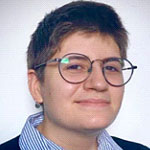 Elena Bermejo Solera
Profesora y Directora TFG
Professor and FRP Director
Graduada en Estudios Ingleses y máster en Literatura y Cultura de los Países de Habla Inglesa por la Universidad Autónoma de Madrid. Actualmente es doctoranda en el programa de Estudios Artísticos, Literarios y de la Cultura en la UAM y cursa los estudios del máster en Formación del Profesorado en la VIU. Cuenta con experiencia como docente de EFL para niños, jóvenes y adultos en diversos centros educativos y universidades. Es miembro del grupo de investigación Limen Group (UAM). Desde 2018 coorganiza el seminario mensual Madrid Fantasy Seminar en la UAM, dedicado a la investigación de la literatura fantástica a nivel de grado y posgrado. Sus áreas de investigación conciernen a la literatura popular, el género fantástico y los estudios liminares.
ebermejos@nebrija.es
Elena Bermejo Solera
Profesora y Directora TFG
Professor and FRP Director
Graduada en Estudios Ingleses y máster en Literatura y Cultura de los Países de Habla Inglesa por la Universidad Autónoma de Madrid. Actualmente es doctoranda en el programa de Estudios Artísticos, Literarios y de la Cultura en la UAM y cursa los estudios del máster en Formación del Profesorado en la VIU. Cuenta con experiencia como docente de EFL para niños, jóvenes y adultos en diversos centros educativos y universidades. Es miembro del grupo de investigación Limen Group (UAM). Desde 2018 coorganiza el seminario mensual Madrid Fantasy Seminar en la UAM, dedicado a la investigación de la literatura fantástica a nivel de grado y posgrado. Sus áreas de investigación conciernen a la literatura popular, el género fantástico y los estudios liminares.
ebermejos@nebrija.es
 Sergio Berodia Pero
Profesor y Director de TFG
Professor and FRP Director
Graduado y diplomado en Magisterio con las menciones de Ed. Física y Lengua Extranjera (inglés) por la Universidad Complutense de Madrid (CES Don Bosco) y por la Universidad Camilo José Cela. Más de veinte años de experiencia docente, de los cuales ocho han sido ejerciendo la función de Director General en el Colegio Malvar, un centro educativo en el que se imparten todas las etapas educativas no universitarias. Durante tres cursos escolares como profesor de CFGS “Educación Infantil”. En el curso 22/23 ponente en la Universidad Nebrija dos talleres para los alumnos del Máster de Formación del Profesorado: “Análisis de legislación y documentación institucional” y. “Análisis y reflexión de innovaciones educativas para la planificación y el diseño de propuestas didácticas en contextos reales” En la actualidad Jefe de Estudios en la etapa de Ed. Primaria en el Colegio Malvar.
sberodia@nebrija.es
Sergio Berodia Pero
Profesor y Director de TFG
Professor and FRP Director
Graduado y diplomado en Magisterio con las menciones de Ed. Física y Lengua Extranjera (inglés) por la Universidad Complutense de Madrid (CES Don Bosco) y por la Universidad Camilo José Cela. Más de veinte años de experiencia docente, de los cuales ocho han sido ejerciendo la función de Director General en el Colegio Malvar, un centro educativo en el que se imparten todas las etapas educativas no universitarias. Durante tres cursos escolares como profesor de CFGS “Educación Infantil”. En el curso 22/23 ponente en la Universidad Nebrija dos talleres para los alumnos del Máster de Formación del Profesorado: “Análisis de legislación y documentación institucional” y. “Análisis y reflexión de innovaciones educativas para la planificación y el diseño de propuestas didácticas en contextos reales” En la actualidad Jefe de Estudios en la etapa de Ed. Primaria en el Colegio Malvar.
sberodia@nebrija.es
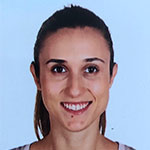 Elisabetta Bertola López
Profesora y Directora TFG
Professor and FRP Director
Doctor en psicología por la Universidad de Murcia. Posgrado de Especialización en TMO, Máster en Intervención y Diplomada en Logopedia. Ha trabajado como logopeda en diversos centros y colegios.
ebertola@nebrija.es
Elisabetta Bertola López
Profesora y Directora TFG
Professor and FRP Director
Doctor en psicología por la Universidad de Murcia. Posgrado de Especialización en TMO, Máster en Intervención y Diplomada en Logopedia. Ha trabajado como logopeda en diversos centros y colegios.
ebertola@nebrija.es
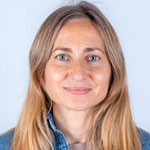 Carmen Boquete Pumar
Profesora y Directora TFG
Professor and FRP Director
Licenciada en Ciencias de la Actividad Física y del Deporte por la Universidad de Gales (University of Wales-Prifysgol Cymru). Máster para la Formación del Profesorado por la Universidad Internacional de Valencia. Doctora en Ciencias de la Salud en la Universidad de Jaén. Proviene del ámbito educativo e investigador en Ciencias de la Salud y de la Actividad Física, ha sido docente de educación formal en Secundaria, Formación Profesional y en el Grado de Ciencias del Deporte. Entre sus líneas de investigación se encuentra la función cognitiva, el entrenamiento y la condición física. Es coordinadora académica, de educación no formal, en Five Stars Fitness y docente en los Grados de Educación Infantil y Primaria en la Universidad Nebrija.
cboquete@nebrija.es
Carmen Boquete Pumar
Profesora y Directora TFG
Professor and FRP Director
Licenciada en Ciencias de la Actividad Física y del Deporte por la Universidad de Gales (University of Wales-Prifysgol Cymru). Máster para la Formación del Profesorado por la Universidad Internacional de Valencia. Doctora en Ciencias de la Salud en la Universidad de Jaén. Proviene del ámbito educativo e investigador en Ciencias de la Salud y de la Actividad Física, ha sido docente de educación formal en Secundaria, Formación Profesional y en el Grado de Ciencias del Deporte. Entre sus líneas de investigación se encuentra la función cognitiva, el entrenamiento y la condición física. Es coordinadora académica, de educación no formal, en Five Stars Fitness y docente en los Grados de Educación Infantil y Primaria en la Universidad Nebrija.
cboquete@nebrija.es
 Cristina Candil San Julián
Profesora y Directora TFG
Professor and FRP Director
Máster en psicopedagogía. Máster en Neuropsicología y Educación por la Universidad Internacional de La Rioja (UNIR). Grado en Educación Primaria con Mención en Lengua Extranjera por la Universidad Camilo José Cela. Diplomatura de Magisterio en Educación Infantil por la Universidad Villanueva. Su línea de investigación en Orientación Psicopedagógica y programas de colegios con proyectos bilingües en las etapas de Infantil y Primaria. Autora de diferentes materiales didácticos universitarios. Actualmente, docente en los Grados de Educación Infantil y Primaria en la Mención de Lengua Extranjera de la Universidad Nebrija
ccandil@nebrija.es
Cristina Candil San Julián
Profesora y Directora TFG
Professor and FRP Director
Máster en psicopedagogía. Máster en Neuropsicología y Educación por la Universidad Internacional de La Rioja (UNIR). Grado en Educación Primaria con Mención en Lengua Extranjera por la Universidad Camilo José Cela. Diplomatura de Magisterio en Educación Infantil por la Universidad Villanueva. Su línea de investigación en Orientación Psicopedagógica y programas de colegios con proyectos bilingües en las etapas de Infantil y Primaria. Autora de diferentes materiales didácticos universitarios. Actualmente, docente en los Grados de Educación Infantil y Primaria en la Mención de Lengua Extranjera de la Universidad Nebrija
ccandil@nebrija.es
 Patricia Jara Calaforra Faubel
Profesora y Directora TFG
Professor and FRP Director
Doctora en Psicología por la Universidad Complutense de Madrid.
Pedagoga, Maestra de Educación Primaria y maestra de Audición y Lenguaje en colegios y gabinetes psicopedagógicos.
Patricia Jara Calaforra Faubel
Profesora y Directora TFG
Professor and FRP Director
Doctora en Psicología por la Universidad Complutense de Madrid.
Pedagoga, Maestra de Educación Primaria y maestra de Audición y Lenguaje en colegios y gabinetes psicopedagógicos. Ha trabajado como profesora en los grados de Educación infantil y Primaria, en las menciones de audición y Lenguaje y Pedagogía Terapéutica en la Universidad Internacional de la Rioja, así como profesora de Psicología Básica en la Universidad Complutense de Madrid. Miembro del equipo del Proyecto: Utilización de códigos QR para la evaluación continua en alumnos de Psicología Básica (prácticas), aprobado en la convocatoria de “Proyectos de Innovación y Mejora de la Calidad Docente” del año 2014.
Diversas publicaciones sobre estrategias metacognitivas en escritura y códigos QR. Ponente en el Congreso Internacional en Contextos Psicológicos, Educativos y de la Salud. pcalaforra@nebrija.es
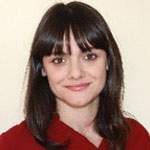 Carolina Callejo Lavado
Profesora y Directora TFG
Professor and FRP Director
Doctoranda en el programa de Comunicación, Información y Tecnología de la Sociedad en Red de la Universidad de Alcalá (UAH), actualmente elabora su tesis bajo el título El efecto de los recortes en la inversión en I+D en la producción científica y en sus indicadores de rendimiento: una aproximación cienciométrica al caso español en el contexto internacional. Obtuvo los títulos de Grado en Periodismo y Grado en Comunicación Audiovisual por la Universidad Rey Juan Carlos (URJC) y el de Máster Universitario en Información y Comunicación Científica por la Universidad de Granada (UGR). Es autora de una presentación en un congreso internacional y ha trabajado como responsable de comunicación, jefa de proyecto, editora, redactora y gestora de redes sociales en diversas empresas de los sectores de comunicación y marketing. En la actualidad, es docente en los grados de Educación Infantil y Educación Primaria en la Universidad Nebrija.
ccallejo@nebrija.es
Carolina Callejo Lavado
Profesora y Directora TFG
Professor and FRP Director
Doctoranda en el programa de Comunicación, Información y Tecnología de la Sociedad en Red de la Universidad de Alcalá (UAH), actualmente elabora su tesis bajo el título El efecto de los recortes en la inversión en I+D en la producción científica y en sus indicadores de rendimiento: una aproximación cienciométrica al caso español en el contexto internacional. Obtuvo los títulos de Grado en Periodismo y Grado en Comunicación Audiovisual por la Universidad Rey Juan Carlos (URJC) y el de Máster Universitario en Información y Comunicación Científica por la Universidad de Granada (UGR). Es autora de una presentación en un congreso internacional y ha trabajado como responsable de comunicación, jefa de proyecto, editora, redactora y gestora de redes sociales en diversas empresas de los sectores de comunicación y marketing. En la actualidad, es docente en los grados de Educación Infantil y Educación Primaria en la Universidad Nebrija.
ccallejo@nebrija.es
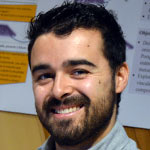 Manuel Carabias Herrero
Profesor y Director TFG
Professor and FRP Director
Doctor por la Universidad de Valladolid, Máster en Psicopedagogía, Graduado en Educación Primaria, mención lengua extranjera Inglés, Maestro de Educación Física y Maestro de Educación Infantil. Su carrera profesional ha girado en torno a la educación.
Ha trabajado como maestro en diferentes colegios, en las etapas de Educación Primaria y Educación Infantil, también como profesor e investigador en universidades como la Universidad de Valladolid, la Universidad Isabel I o la Universidad Internacional de la Rioja.
Ha participado en diversas investigaciones tanto nacionales como internacionales referentes a cualificaciones y competencias profesionales y transversales requeridas en los ámbitos sociales y laborales, así como su adaptación e integración en los procesos educativos.
A su vez participa en Congresos Internacionales como ponente y miembro del Comité Científico y Organizador.
mcarabias@nebrija.es
Manuel Carabias Herrero
Profesor y Director TFG
Professor and FRP Director
Doctor por la Universidad de Valladolid, Máster en Psicopedagogía, Graduado en Educación Primaria, mención lengua extranjera Inglés, Maestro de Educación Física y Maestro de Educación Infantil. Su carrera profesional ha girado en torno a la educación.
Ha trabajado como maestro en diferentes colegios, en las etapas de Educación Primaria y Educación Infantil, también como profesor e investigador en universidades como la Universidad de Valladolid, la Universidad Isabel I o la Universidad Internacional de la Rioja.
Ha participado en diversas investigaciones tanto nacionales como internacionales referentes a cualificaciones y competencias profesionales y transversales requeridas en los ámbitos sociales y laborales, así como su adaptación e integración en los procesos educativos.
A su vez participa en Congresos Internacionales como ponente y miembro del Comité Científico y Organizador.
mcarabias@nebrija.es
 Carmen Rita Castellano Hernández
Profesora y Directora TFG
Professor and FRP Director
Maestra de Educación Musical y Licenciatura en Psicopedagogía. Trabaja como maestra de Educación Musical en el CEIP Ciudad de Zaragoza (Madrid), y colabora como profesora en otras universidades, como la Universidad Camilo José Cela.
ccastellano@nebrija.es
Carmen Rita Castellano Hernández
Profesora y Directora TFG
Professor and FRP Director
Maestra de Educación Musical y Licenciatura en Psicopedagogía. Trabaja como maestra de Educación Musical en el CEIP Ciudad de Zaragoza (Madrid), y colabora como profesora en otras universidades, como la Universidad Camilo José Cela.
ccastellano@nebrija.es
 Pilar Cercos Pita
Profesora y Directora TFG
Professor and FRP Director
Doctora en Ciencias Químicas por la Universidad Complutense de Madrid. También tiene un máster en química orgánica por la Universidad Complutense de Madrid y la licenciatura en Ciencias Químicas por la misma universidad.
Ha participado en diferentes proyectos de investigación nacionales que cubren la fotoquímica aplicada, la ingeniería química, la química orgánica y la química médica. Además, ha participado en numerosos congresos nacionales: como comunicante y miembro del Comité Científico y Organizador.
Pilar Cercos Pita
Profesora y Directora TFG
Professor and FRP Director
Doctora en Ciencias Químicas por la Universidad Complutense de Madrid. También tiene un máster en química orgánica por la Universidad Complutense de Madrid y la licenciatura en Ciencias Químicas por la misma universidad.
Ha participado en diferentes proyectos de investigación nacionales que cubren la fotoquímica aplicada, la ingeniería química, la química orgánica y la química médica. Además, ha participado en numerosos congresos nacionales: como comunicante y miembro del Comité Científico y Organizador.Su docencia se centra en el área de las matemáticas en la Universidad Nebrija. pcercos@nebrija.es
 Irimia Cerviño Abeledo
Profesora y Directora de TFG
Professor and FRP Director
Doctora en Educación, Sociedad y Calidad de Vida por la Universidad de Lleida (UdL), con una estancia de investigación en el grupo CREDEF de la Universidad de Quebec en Montreal (UQAM). Cuenta con un Máster Euro-latinoamericano en Educación Intercultural por la Universidad Nacional de Educación a Distancia (UNED) y un Grado en Magisterio de Educación Infantil con mención en Lengua Castellana por la Universidad de Alcalá de Henares (UAH). Ha trabajado como Docente de Sociología de la Educación y como investigadora predoctoral en el programa de doctorado “Educación, Sociedad y Calidad de Vida” en el grupo GR-ASE de la Universidad de Lleida. Su labor investigadora incluye su participación en el proyecto “La diversidad cultural en la escuela: discursos, políticas y prácticas”, financiado por el Ministerio de Industria y Competitividad de España. Su línea de investigación se centra en el alumnado de origen extranjero en educación primaria, la convivencia y el clima escolar, y la convivencia intercultural en contextos escolares. Es autora de varias publicaciones científicas y capítulos de libros, además de haber presentado en congresos nacionales e internacionales sobre temas de diversidad cultural, interculturalidad y convivencia escolar. Actualmente, es miembro activo de la Red Internacional por el Derecho Educativo (RIIDE).
icervino@nebrija.es
Irimia Cerviño Abeledo
Profesora y Directora de TFG
Professor and FRP Director
Doctora en Educación, Sociedad y Calidad de Vida por la Universidad de Lleida (UdL), con una estancia de investigación en el grupo CREDEF de la Universidad de Quebec en Montreal (UQAM). Cuenta con un Máster Euro-latinoamericano en Educación Intercultural por la Universidad Nacional de Educación a Distancia (UNED) y un Grado en Magisterio de Educación Infantil con mención en Lengua Castellana por la Universidad de Alcalá de Henares (UAH). Ha trabajado como Docente de Sociología de la Educación y como investigadora predoctoral en el programa de doctorado “Educación, Sociedad y Calidad de Vida” en el grupo GR-ASE de la Universidad de Lleida. Su labor investigadora incluye su participación en el proyecto “La diversidad cultural en la escuela: discursos, políticas y prácticas”, financiado por el Ministerio de Industria y Competitividad de España. Su línea de investigación se centra en el alumnado de origen extranjero en educación primaria, la convivencia y el clima escolar, y la convivencia intercultural en contextos escolares. Es autora de varias publicaciones científicas y capítulos de libros, además de haber presentado en congresos nacionales e internacionales sobre temas de diversidad cultural, interculturalidad y convivencia escolar. Actualmente, es miembro activo de la Red Internacional por el Derecho Educativo (RIIDE).
icervino@nebrija.es
 Adela E. Cortijo Cantos
Profesora y Directora TFG
Professor and FRP Director
Doctora en Ciencias de la Educación, Licenciada en Psicopedagogía y Maestra especialista en Educación Física. Ha finalizado másteres y estudios de posgrados relacionados con sus dos vertientes de formación: educación física y psicopedagogía.
Adela E. Cortijo Cantos
Profesora y Directora TFG
Professor and FRP Director
Doctora en Ciencias de la Educación, Licenciada en Psicopedagogía y Maestra especialista en Educación Física. Ha finalizado másteres y estudios de posgrados relacionados con sus dos vertientes de formación: educación física y psicopedagogía.Entre otras, ha disfrutado de la beca de Iniciación a la Investigación, del plan propio de la Universidad de Granada, y de la beca de Colaboración Universitaria del Ministerio. Además, cuenta con diversas publicaciones en revistas de reconocido prestigio, aportaciones a congresos nacionales e internacionales y colaboraciones en proyectos de investigación.
Docente de vocación, con experiencia en Educación Infantil, Primaria y Secundaria, y tras haber trabajado en un centro de acogida de menores más de 7 años, actualmente dirige TFG en la Universidad Isabel I e imparte asignaturas en los grados de Educación Infantil y Primaria, y en Másteres de la Universidad de Nebrija donde también tutoriza TFG y TFM.
acortijo@nebrija.es
 Alejandro Cruz Serrano
Profesor y Director TFG
Professor and FRP Director
Graduado en Historia por la Universidad Complutense de Madrid y en posesión del máster de Formación del por la Universidad Internacional de Valencia.
Profesor de secundaria, impartidor de certificados de profesionalidad y docente en la Universidad Nebrija, así como tutor en la UNED.
acruzse@nebrija.es
Alejandro Cruz Serrano
Profesor y Director TFG
Professor and FRP Director
Graduado en Historia por la Universidad Complutense de Madrid y en posesión del máster de Formación del por la Universidad Internacional de Valencia.
Profesor de secundaria, impartidor de certificados de profesionalidad y docente en la Universidad Nebrija, así como tutor en la UNED.
acruzse@nebrija.es
 María D’orey Roquete Montenegro Correira
Profesora y Directora TFG
Professor and FRP Director
Doctora en Educación por la UCM. Máster en Educación Especial (UCM). Licenciada en Educación, mención Ciencias Pedagógicas (UCAB). Coordinadora del área de I+d+i de la Fundación Prodis y del Curso Experto Conecta2, formación e-learning adaptada en competencias digitales, para personas con discapacidad intelectual. Autora de distintas publicaciones y presentaciones en congresos relacionadas con procesos transdiagnósticos en la salud mental de personas con y sin discapacidad intelectual.
mdoreyro@nebrija.es
María D’orey Roquete Montenegro Correira
Profesora y Directora TFG
Professor and FRP Director
Doctora en Educación por la UCM. Máster en Educación Especial (UCM). Licenciada en Educación, mención Ciencias Pedagógicas (UCAB). Coordinadora del área de I+d+i de la Fundación Prodis y del Curso Experto Conecta2, formación e-learning adaptada en competencias digitales, para personas con discapacidad intelectual. Autora de distintas publicaciones y presentaciones en congresos relacionadas con procesos transdiagnósticos en la salud mental de personas con y sin discapacidad intelectual.
mdoreyro@nebrija.es
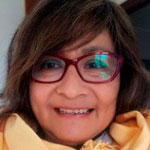 Matilde D’Arrigo Huapaya
Profesora y Directora TFG
Professor and FRP Director
Doctor en Veterinaria por la Universidad Complutense de Madrid (UCM) e Ingeniera en Industrias Alimentarias y Máster en Tecnología de los Alimentos por la Universidad Nacional Agraria la Molina (UNALM)- Perú. En la actualidad, trabaja para el Centro de Investigaciones Científicas y Tecnológicas de Extremadura (CICYTEX) en la unidad de cárnicos del Instituto Tecnológico Agroalimentario de Extremadura (INTAEX). Su desarrollo profesional siempre ha sido en investigación participando en proyectos de seguridad alimentaria y microbiología predictiva. Las habilidades, propias y obtenidas por la experiencia, encajan en las áreas de ciencia, tecnología e ingeniería, todas necesarias para obtener resultados óptimos y útiles para la sociedad. Su capacidad como docente a nivel académico fue perfeccionada en la Facultad de Industrias alimentarias UNALM impartiendo asignaturas en ciencias de los alimentos, lo que confirma la capacidad para dirigir a alumnos de carrera, formar a personal técnico e investigador: Por último, la divulgación científica, académica y social como autora, se muestran con las publicaciones en revistas científicas y de difusión, la participación en jornadas, conferencias y congresos.
marrigo@nebrija.es
Matilde D’Arrigo Huapaya
Profesora y Directora TFG
Professor and FRP Director
Doctor en Veterinaria por la Universidad Complutense de Madrid (UCM) e Ingeniera en Industrias Alimentarias y Máster en Tecnología de los Alimentos por la Universidad Nacional Agraria la Molina (UNALM)- Perú. En la actualidad, trabaja para el Centro de Investigaciones Científicas y Tecnológicas de Extremadura (CICYTEX) en la unidad de cárnicos del Instituto Tecnológico Agroalimentario de Extremadura (INTAEX). Su desarrollo profesional siempre ha sido en investigación participando en proyectos de seguridad alimentaria y microbiología predictiva. Las habilidades, propias y obtenidas por la experiencia, encajan en las áreas de ciencia, tecnología e ingeniería, todas necesarias para obtener resultados óptimos y útiles para la sociedad. Su capacidad como docente a nivel académico fue perfeccionada en la Facultad de Industrias alimentarias UNALM impartiendo asignaturas en ciencias de los alimentos, lo que confirma la capacidad para dirigir a alumnos de carrera, formar a personal técnico e investigador: Por último, la divulgación científica, académica y social como autora, se muestran con las publicaciones en revistas científicas y de difusión, la participación en jornadas, conferencias y congresos.
marrigo@nebrija.es
 Marco Antonio Da Costa Bodelón
Profesor y Director TFG
Professor and FRP Director
Doctor en Filología Hispánica por la Universidad de Barcelona. Premio Extraordinario de Doctorado. Máster Universitario en Formación de Profesores de Español por la Universidad de Alcalá de Henares. Licenciado en Filología Hispánica por la Universidad de Barcelona. Profesor asociado en la Facultad de Lenguas y Educación de la Universidad Nebrija. Profesor con amplia experiencia en facultades de Humanidades y Ciencias Políticas. Autor de distintas publicaciones y presentaciones en congresos relacionadas con la literatura, el cine y la propaganda. Otras líneas de investigación: Educación, E/LE, Lingüística
mdacostb@nebrija.es
Marco Antonio Da Costa Bodelón
Profesor y Director TFG
Professor and FRP Director
Doctor en Filología Hispánica por la Universidad de Barcelona. Premio Extraordinario de Doctorado. Máster Universitario en Formación de Profesores de Español por la Universidad de Alcalá de Henares. Licenciado en Filología Hispánica por la Universidad de Barcelona. Profesor asociado en la Facultad de Lenguas y Educación de la Universidad Nebrija. Profesor con amplia experiencia en facultades de Humanidades y Ciencias Políticas. Autor de distintas publicaciones y presentaciones en congresos relacionadas con la literatura, el cine y la propaganda. Otras líneas de investigación: Educación, E/LE, Lingüística
mdacostb@nebrija.es
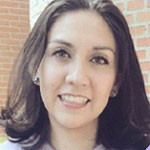 Virginia Danahe Sánchez Reza
Profesora y Directora TFG
Professor and FRP Director
Psicóloga especialista en psicología infantojuvenil, psicóloga educativa y psicóloga legal y forense. Experto universitario en detección y atención a niños de altas capacidades.
Doctoranda en psicología educativa y del desarrollo. "Detección del talento a través de
las Inteligencias Múltiples". Contribución en diferentes programas nacionales e internacionales sobre altas capacidades y talentos específicos. Profesora universitaria en psicología y educación.
Virginia Danahe Sánchez Reza
Profesora y Directora TFG
Professor and FRP Director
Psicóloga especialista en psicología infantojuvenil, psicóloga educativa y psicóloga legal y forense. Experto universitario en detección y atención a niños de altas capacidades.
Doctoranda en psicología educativa y del desarrollo. "Detección del talento a través de
las Inteligencias Múltiples". Contribución en diferentes programas nacionales e internacionales sobre altas capacidades y talentos específicos. Profesora universitaria en psicología y educación.
vsanchezre@nebrija.es
 Elena de Andrés Jiménez
Profesora y Directora TFG
Professor and FRP Director
Doctora en Psicología por la Universidad de Murcia.
Elena de Andrés Jiménez
Profesora y Directora TFG
Professor and FRP Director
Doctora en Psicología por la Universidad de Murcia.Profesora en el Grado en Educación de la Universidad Camilo José Cela, así como en la Universidad Europea de Madrid. Grado de Psicología (del Máster de Psicología Clínica y de la Salud (2013) y del Máster de Psicología de la Intervención Social (2013 y 2016) de la Universidad de Murcia.
Investigadora colaboradora del Grupo de investigación: Personalidad y Salud: Una perspectiva intercultural y de género del departamento de Personalidad, Evaluación y Tratamiento Psicológico de la Facultad de Psicología de la Universidad de Murcia. Ha publicado distintos artículos y ha participado en simposios, mesas de comunicaciones y póster, y, además, en distintos congresos nacionales e internacionales relacionados con la Psicología y las demencias.
eandres@nebrija.es
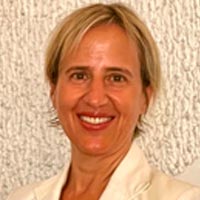 Ana de Biase
Profesora y Directora de TFG
Professor and FRP Director
Doctora en Psicología por la Universidad Autónoma de Madrid, con especialización en Adquisición del Lenguaje y Bilingüismo, y Máster en Psicología Cognitiva y Aprendizaje por la Fundación Latinoamericana de Ciencias Sociales (FLACSO). Licenciada en Sociología por la Universidad de Buenos Aires (UBA), donde se especializó en metodología e investigación. Es cofundadora y directora del Institute of Bilingual Education (ibE), institución dedicada a desarrollar proyectos educativos y culturales bilingües que promuevan contenidos de alta calidad y formación de excelencia a través de prácticas educativas y lingüísticas innovadoras.
Ana de Biase
Profesora y Directora de TFG
Professor and FRP Director
Doctora en Psicología por la Universidad Autónoma de Madrid, con especialización en Adquisición del Lenguaje y Bilingüismo, y Máster en Psicología Cognitiva y Aprendizaje por la Fundación Latinoamericana de Ciencias Sociales (FLACSO). Licenciada en Sociología por la Universidad de Buenos Aires (UBA), donde se especializó en metodología e investigación. Es cofundadora y directora del Institute of Bilingual Education (ibE), institución dedicada a desarrollar proyectos educativos y culturales bilingües que promuevan contenidos de alta calidad y formación de excelencia a través de prácticas educativas y lingüísticas innovadoras.
Es autora de diversas publicaciones y ponencias en congresos internacionales sobre procesos cognitivos relacionados con la adquisición del lenguaje y el aprendizaje de segundas lenguas. En 2020, la Universidad de Chicago la honró con el Outstanding Educator Award, un premio que reconoce a educadores excepcionales por su influencia, apoyo y contribución al desarrollo intelectual y personal de sus estudiantes.
abiase@nebrija.es
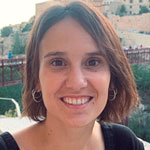 Ester De la Fuente Martín
Profesora y Directora TFG
Professor and FRP Director
Graduada en logopedia. Máster en Atención Temprana. Prevención, diagnóstico y tratamiento (Instituto Superior de Estudios Psicológicos). Especialización en evaluación e intervención en el Trastorno Específico del Lenguaje. (UAM). Logopeda con 10 años de experiencia en población infanto-juvenil. Docente de 3 ediciones del Máster en Intervención en Trastornos del Espectro del Autismo a lo largo del ciclo vital en la UCLM. Docente de distintos cursos de formación, sobre lenguaje, comunicación y autismo y de Atención Temprana. Coautora de posters y comunicaciones en congresos.
Ester De la Fuente Martín
Profesora y Directora TFG
Professor and FRP Director
Graduada en logopedia. Máster en Atención Temprana. Prevención, diagnóstico y tratamiento (Instituto Superior de Estudios Psicológicos). Especialización en evaluación e intervención en el Trastorno Específico del Lenguaje. (UAM). Logopeda con 10 años de experiencia en población infanto-juvenil. Docente de 3 ediciones del Máster en Intervención en Trastornos del Espectro del Autismo a lo largo del ciclo vital en la UCLM. Docente de distintos cursos de formación, sobre lenguaje, comunicación y autismo y de Atención Temprana. Coautora de posters y comunicaciones en congresos.
efuente@nebrija.es
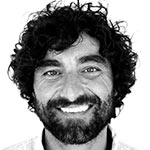 César De la Hoz Pérez
Profesor y Director TFG
Professor and FRP Director
Licenciado en Psicopedagogía (UCM). Master salud mental (Universidad León y AEU). Master Psicología Clínica (Instituto Psicología Aplicada Alborán). Mediador familiar (UNAF). Experto en Psicopatología y Psicodiagnóstico (Instituto Galene). Master en educación Ambiental (INIEC).
Profesor Universidad Castilla la Mancha, profesor escuela ciencias de la salud (UCM), profesor colegios profesionales, centros de Apoyo al Profesorado y asociaciones de intervención infancia y familia en: mediación escolar, familiar y procesal, intervención psicosocial con familias y adolescentes con trastornos de la conducta, bullying y resolución de conflictos.
Ha sido director de centro de menores con trastornos de conducta, coordinador programa de infancia y familia, mediador escolar en CEIP e IES y mediador familiar en centro de mediación e intervención familiar y punto de encuentro familiar.
Profesor de primaria y convivencia en escuela IDEO (Madrid). Profesor en master de mediación y orientación familiar de la UPSA. Profesor técnicas de modificación de conducta en el aula en Universidad Antonio Nebrija y acompañante terapeútico con menores y familias.
César De la Hoz Pérez
Profesor y Director TFG
Professor and FRP Director
Licenciado en Psicopedagogía (UCM). Master salud mental (Universidad León y AEU). Master Psicología Clínica (Instituto Psicología Aplicada Alborán). Mediador familiar (UNAF). Experto en Psicopatología y Psicodiagnóstico (Instituto Galene). Master en educación Ambiental (INIEC).
Profesor Universidad Castilla la Mancha, profesor escuela ciencias de la salud (UCM), profesor colegios profesionales, centros de Apoyo al Profesorado y asociaciones de intervención infancia y familia en: mediación escolar, familiar y procesal, intervención psicosocial con familias y adolescentes con trastornos de la conducta, bullying y resolución de conflictos.
Ha sido director de centro de menores con trastornos de conducta, coordinador programa de infancia y familia, mediador escolar en CEIP e IES y mediador familiar en centro de mediación e intervención familiar y punto de encuentro familiar.
Profesor de primaria y convivencia en escuela IDEO (Madrid). Profesor en master de mediación y orientación familiar de la UPSA. Profesor técnicas de modificación de conducta en el aula en Universidad Antonio Nebrija y acompañante terapeútico con menores y familias.
choz@nebrija.es
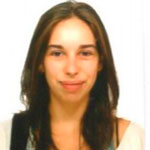 Elsa del Campo Ramírez
Profesora y Directora TFG
Professor and FRP Director
Doctora suma cum laude en Estudios Literarios por Universidad Complutense de Madrid. Licenciada en Filología Inglesa por la Universidad Complutense de Madrid. Profesionalmente ha ejercido la docencia en diversas universidades, y cuenta con una amplia experiencia profesional en el campo de la enseñanza del inglés como segunda lengua en diversas empresas y proyectos educativos para la formación del profesorado. Ha participado en múltiples congresos literarios de notoria repercusión tanto a nivel nacional como internacional. Posee diversas publicaciones en revistas científicas.
ecampo@nebrija.es
Elsa del Campo Ramírez
Profesora y Directora TFG
Professor and FRP Director
Doctora suma cum laude en Estudios Literarios por Universidad Complutense de Madrid. Licenciada en Filología Inglesa por la Universidad Complutense de Madrid. Profesionalmente ha ejercido la docencia en diversas universidades, y cuenta con una amplia experiencia profesional en el campo de la enseñanza del inglés como segunda lengua en diversas empresas y proyectos educativos para la formación del profesorado. Ha participado en múltiples congresos literarios de notoria repercusión tanto a nivel nacional como internacional. Posee diversas publicaciones en revistas científicas.
ecampo@nebrija.es
 Jonathan Delgado Adámez
Profesor y Director TFG
Professor and FRP Director
Doctor acreditado en Ciencias (Biología) por la Universidad de Extremadura. Premio Extraordinario de Doctorado. Estancia de investigación en el Centro de Apoio Tecnológico Agro-Alimentar (CATAA) de Castelo Branco (Portugal). Participación en numerosos Proyectos regionales, nacionales e internacionales y en la producción de artículos científicos en revistar incluidas en JCR, así como en libros y de publicaciones docentes. Experiencia docente a nivel universitario, en los Grados Educación Primaria y Educación Infantil, así como en la impartición de cursos de perfeccionamiento. jdelgadoa@nebrija.es
Jonathan Delgado Adámez
Profesor y Director TFG
Professor and FRP Director
Doctor acreditado en Ciencias (Biología) por la Universidad de Extremadura. Premio Extraordinario de Doctorado. Estancia de investigación en el Centro de Apoio Tecnológico Agro-Alimentar (CATAA) de Castelo Branco (Portugal). Participación en numerosos Proyectos regionales, nacionales e internacionales y en la producción de artículos científicos en revistar incluidas en JCR, así como en libros y de publicaciones docentes. Experiencia docente a nivel universitario, en los Grados Educación Primaria y Educación Infantil, así como en la impartición de cursos de perfeccionamiento. jdelgadoa@nebrija.es
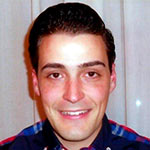 Fernando Evaristo Díaz Manzano
Profesor y Director TFG
Professor and FRP Director
Doctor acreditado en Ciencias por la Universidad de Castilla La Mancha. Máster en Biotecnología por la Universidad Autónoma de Madrid. Máster en Profesorado por la Universidad de Castilla La Mancha. Destacar su docencia desde 2010 a alumnos universitarios del Grado de Bioquímica (Fundamentos de Biología Celular, 1er curso) y del Grado de Ciencias Ambientales (Fisiología Vegetal, 2º curso) en la Universidad de Castilla-La Mancha; desde 2018, en el Grado de Educación Primaria (Didáctica de las Ciencias Experimentales, 4º curso) y Máster en Procesos Educativos (Cerebro y Aprendizaje) en la Universidad de Antonio de Nebrija; y a alumnos de Secundaria y Bachillerato en Institutos de la Consejería de Educación de Castilla La Mancha (Biología y Geología; Cultura Científica; Ciencias de la Tierra); y por último, desde 2019, a alumnos del Máster en Profesorado de la Universidad Internacional de La Rioja (especialidad en Ciencias Experimentales).
Fernando Evaristo Díaz Manzano
Profesor y Director TFG
Professor and FRP Director
Doctor acreditado en Ciencias por la Universidad de Castilla La Mancha. Máster en Biotecnología por la Universidad Autónoma de Madrid. Máster en Profesorado por la Universidad de Castilla La Mancha. Destacar su docencia desde 2010 a alumnos universitarios del Grado de Bioquímica (Fundamentos de Biología Celular, 1er curso) y del Grado de Ciencias Ambientales (Fisiología Vegetal, 2º curso) en la Universidad de Castilla-La Mancha; desde 2018, en el Grado de Educación Primaria (Didáctica de las Ciencias Experimentales, 4º curso) y Máster en Procesos Educativos (Cerebro y Aprendizaje) en la Universidad de Antonio de Nebrija; y a alumnos de Secundaria y Bachillerato en Institutos de la Consejería de Educación de Castilla La Mancha (Biología y Geología; Cultura Científica; Ciencias de la Tierra); y por último, desde 2019, a alumnos del Máster en Profesorado de la Universidad Internacional de La Rioja (especialidad en Ciencias Experimentales).
fdiazman@nebrija.es
 Ana Domínguez Gallego
Profesora y Directora de TFG
Professor and FRP Director
Graduada en Educación Primaria con mención en Pedagogía Terapéutica y Máster en Psicopedagogía. Posee una sólida experiencia como profesora en la Fundación Prodis desde 2014, donde se ha especializado en la enseñanza a adultos con discapacidad intelectual. Su labor incluye la coordinación de las actividades de comunicación y lenguaje, así como la tutorización del alumnado preuniversitario y la implementación de programas e-learning para mejorar sus competencias laborales.
Ana Domínguez Gallego
Profesora y Directora de TFG
Professor and FRP Director
Graduada en Educación Primaria con mención en Pedagogía Terapéutica y Máster en Psicopedagogía. Posee una sólida experiencia como profesora en la Fundación Prodis desde 2014, donde se ha especializado en la enseñanza a adultos con discapacidad intelectual. Su labor incluye la coordinación de las actividades de comunicación y lenguaje, así como la tutorización del alumnado preuniversitario y la implementación de programas e-learning para mejorar sus competencias laborales.
adominguezg@nebrija.es
 Jon Andoni Duñabeita Landaburu
Director TFG
FRP Director
Doctor acreditado en Psicología por la Universidad de La Laguna, Licenciado en Psicopedagogía por la Universidad de Deusto y Diplomado en Magisterio por la Universidad del País Vasco. Es experto en neurociencia cognitiva del lenguaje. Es Profesor Director e Investigador Principal de la Facultad de Lenguas y Educación de la Universidad Nebrija donde dirige el Grupo de Investigación LAELE, y además es científico asociado al Basque Center on Cognition, Brain and Language (BCBL), donde durante los últimos años ha dirigido el Grupo de Investigación Multilingual Literacy. Tiene amplia experiencia gestionando equipos de trabajo internacionales y proyectos de investigación en entornos interculturales. Su trabajo de investigación se centra en el estudio científico de los aspectos relacionados con la adquisición de lenguas nativas y extranjeras a lo largo del ciclo vital, explorando el papel de la alfabetización multilingüe y el rol de la alternancia de lenguas como medio de instrucción.
Jon Andoni Duñabeita Landaburu
Director TFG
FRP Director
Doctor acreditado en Psicología por la Universidad de La Laguna, Licenciado en Psicopedagogía por la Universidad de Deusto y Diplomado en Magisterio por la Universidad del País Vasco. Es experto en neurociencia cognitiva del lenguaje. Es Profesor Director e Investigador Principal de la Facultad de Lenguas y Educación de la Universidad Nebrija donde dirige el Grupo de Investigación LAELE, y además es científico asociado al Basque Center on Cognition, Brain and Language (BCBL), donde durante los últimos años ha dirigido el Grupo de Investigación Multilingual Literacy. Tiene amplia experiencia gestionando equipos de trabajo internacionales y proyectos de investigación en entornos interculturales. Su trabajo de investigación se centra en el estudio científico de los aspectos relacionados con la adquisición de lenguas nativas y extranjeras a lo largo del ciclo vital, explorando el papel de la alfabetización multilingüe y el rol de la alternancia de lenguas como medio de instrucción.
jdunabeitia@nebrija.es
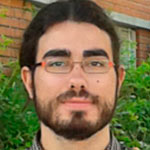 Pablo Escudero Abenza
Profesor y Director de TFG
Professor and FRP Director
Licenciado en Ciencias Físicas, con la especialidad en Física Fundamental (UCM), Máster de Profesorado en Matemáticas (UAH). Trabaja como profesor de Matemáticas en ESO y Bachillerato en centros de la Comunidad de Madrid desde hace diez años. Tiene estudios de Máster en Literatura Comparada (UNED) y ha ganado más de treinta premios literarios de ámbito nacional e internacional. Ha publicado dos novelas y un libro de relatos. Actualmente compagina ambas pasiones, la docente y la literaria en el desarrollo de su doctorado en Educación en la UNED, centrando su investigación y la implementación de su método en la Aplicación de las técnicas narrativas a la Enseñanza de las Matemáticas.
Pablo Escudero Abenza
Profesor y Director de TFG
Professor and FRP Director
Licenciado en Ciencias Físicas, con la especialidad en Física Fundamental (UCM), Máster de Profesorado en Matemáticas (UAH). Trabaja como profesor de Matemáticas en ESO y Bachillerato en centros de la Comunidad de Madrid desde hace diez años. Tiene estudios de Máster en Literatura Comparada (UNED) y ha ganado más de treinta premios literarios de ámbito nacional e internacional. Ha publicado dos novelas y un libro de relatos. Actualmente compagina ambas pasiones, la docente y la literaria en el desarrollo de su doctorado en Educación en la UNED, centrando su investigación y la implementación de su método en la Aplicación de las técnicas narrativas a la Enseñanza de las Matemáticas.
pescudero@nebrija.es
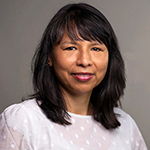 Sulma Farfán Sossa
Directora TFG
FRP Director
Doctora Cum laude en Educación con Premio Extraordinario de Doctorado por la Universidad Nacional de Educación a Distancia (UNED). Licenciada en Informática por la Universidad Mayor de San Andrés-Bolivia. Cuenta con acreditación de la ANECA. Ha cursado los siguientes Maestrias: Ingénierie des Médias pour l’Education-Université de Poitiers-Francia, Ciencias de la Educación. Especialidad Tecnología Educativa-Universidad Técnica de Lisboa-Portugal, Informática Educativa-UNED-España, Ingeniería Informática-Universidad Autónoma Juan Misael Saracho(UAJMS)-Bolivia. Ha sido directora de diversos proyectos de innovación universitaria basados en las TIC y organizadora de diversos congresos y seminarios internacionales relacionados con TIC, Educación y Ciberdelitos.
Sulma Farfán Sossa
Directora TFG
FRP Director
Doctora Cum laude en Educación con Premio Extraordinario de Doctorado por la Universidad Nacional de Educación a Distancia (UNED). Licenciada en Informática por la Universidad Mayor de San Andrés-Bolivia. Cuenta con acreditación de la ANECA. Ha cursado los siguientes Maestrias: Ingénierie des Médias pour l’Education-Université de Poitiers-Francia, Ciencias de la Educación. Especialidad Tecnología Educativa-Universidad Técnica de Lisboa-Portugal, Informática Educativa-UNED-España, Ingeniería Informática-Universidad Autónoma Juan Misael Saracho(UAJMS)-Bolivia. Ha sido directora de diversos proyectos de innovación universitaria basados en las TIC y organizadora de diversos congresos y seminarios internacionales relacionados con TIC, Educación y Ciberdelitos.Ha dirigido proyectos tecnológicos en el ámbito de la educación superior a nivel nacional en Bolivia. Ha sido profesora titular de la carrera de Informática en la UAJMS-Bolivia y ha impartido docencia en el Master de Tecnologías para la Educación y el Conocimiento. UNED-España (2010-2012). Ha sido Asesora en Tecnología Educativa y Evaluación Universitaria en la Saint Louis University Madrid Campus (2007-2020). Ha recibido diversos premios y reconocimientos por su labor en favor de la educación en Bolivia. Colabora como juez externo con las revistas: CEPAL, RAIA-UAI-Argentina y SUMA- UST-Chile.
sfarfan@nebrija.es
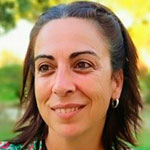 Ana Fernández Alonso
Profesora y Directora TFG
Professor and FRP Director
Maestra especialista en Educación Infantil y Educadora Social por vocación y convicción. Con más de 15 años de experiencia formando parte de distintos proyectos educativos. Como Maestra en Escuelas Infantiles públicas y privadas y en diversos colegios de carácter concertado, desempeñando funciones de tutora, gestión y coordinación y haciéndose cargo de la escuela de padres y de buscar la implicación activa y directa de las familias. Como Educadora Social, participando en proyectos de intervención familiar, ocio y tiempo libre con infancia y juventud e integración social de personas con discapacidad intelectual. El gusto por la educación y la formación, y la búsqueda de la implicación social, le ha llevado en los últimos años a dedicarse a la formación de futuros formadores en diversas Universidades Españolas.
Ana Fernández Alonso
Profesora y Directora TFG
Professor and FRP Director
Maestra especialista en Educación Infantil y Educadora Social por vocación y convicción. Con más de 15 años de experiencia formando parte de distintos proyectos educativos. Como Maestra en Escuelas Infantiles públicas y privadas y en diversos colegios de carácter concertado, desempeñando funciones de tutora, gestión y coordinación y haciéndose cargo de la escuela de padres y de buscar la implicación activa y directa de las familias. Como Educadora Social, participando en proyectos de intervención familiar, ocio y tiempo libre con infancia y juventud e integración social de personas con discapacidad intelectual. El gusto por la educación y la formación, y la búsqueda de la implicación social, le ha llevado en los últimos años a dedicarse a la formación de futuros formadores en diversas Universidades Españolas.
afernandezalo@nebrija.es
 Estela Mª Fernández Pérez
Profesora y Directora TFG
Professor and FRP Director
Graduada en Logopedia. Máster en Atención temprana y Máster en autismo. Ha trabajado como logopeda en centros de intervención en área de atención temprana y atención infanto juvenil. Ha sido profesora en la Universidad Pablo de Olavide y en la Universidad Universidad Anahuac. Actualmente compagina la docencia en Nebrija con la dirección del centro de Logopedia Estela Fernández, así como su trabajo de logopeda en el área de Neurorehabilitación del hospital de Guadalajara.
Estela Mª Fernández Pérez
Profesora y Directora TFG
Professor and FRP Director
Graduada en Logopedia. Máster en Atención temprana y Máster en autismo. Ha trabajado como logopeda en centros de intervención en área de atención temprana y atención infanto juvenil. Ha sido profesora en la Universidad Pablo de Olavide y en la Universidad Universidad Anahuac. Actualmente compagina la docencia en Nebrija con la dirección del centro de Logopedia Estela Fernández, así como su trabajo de logopeda en el área de Neurorehabilitación del hospital de Guadalajara.Investigadora colaboradora en Proyecto dirigido por Miguel Galeote de UMA con UAM sobre desarrollo de lenguaje en síndrome de Down.
efernandezpe@nebrija.es
 Inés Fernández Simón
Directora TFG
FRP Director
Logopeda especializada en trastornos del aprendizaje, del neurodesarrollo y daño cerebral adquirido. Máster en Intervención Logopédica en Motricidad y Sensibilidad Orofacial (UCM) y Grado en Logopedia (UVa). Cuenta con una amplia formación complementaria en autismo y relaciones interpersonales. Desarrolla su labor como profesora universitaria de grado y tutora de prácticas.
Inés Fernández Simón
Directora TFG
FRP Director
Logopeda especializada en trastornos del aprendizaje, del neurodesarrollo y daño cerebral adquirido. Máster en Intervención Logopédica en Motricidad y Sensibilidad Orofacial (UCM) y Grado en Logopedia (UVa). Cuenta con una amplia formación complementaria en autismo y relaciones interpersonales. Desarrolla su labor como profesora universitaria de grado y tutora de prácticas.
Ofrece terapia en inglés.
ifernand@nebrija.es
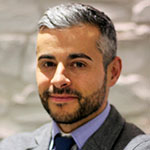 Iván Fernández Suárez
Director TFG
FRP Director
Doctor en Psicosociología Aplicada por la Universidad Pública de Navarra y Licenciado en Pedagogía por la Universidad Nacional de Educación a Distancia (UNED). Profesor asociado en la Universidad Internacional de la Rioja desde 2010 especializado en la docencia online en grados y posgrados, así como en la dirección y evaluación de Trabajos Finales de Máster. Ha participado en diferentes congresos y es autor de distintas publicaciones. Asimismo, ha realizado labores de divulgación científica en distintas conferencias de índole nacional e internacional.
Iván Fernández Suárez
Director TFG
FRP Director
Doctor en Psicosociología Aplicada por la Universidad Pública de Navarra y Licenciado en Pedagogía por la Universidad Nacional de Educación a Distancia (UNED). Profesor asociado en la Universidad Internacional de la Rioja desde 2010 especializado en la docencia online en grados y posgrados, así como en la dirección y evaluación de Trabajos Finales de Máster. Ha participado en diferentes congresos y es autor de distintas publicaciones. Asimismo, ha realizado labores de divulgación científica en distintas conferencias de índole nacional e internacional.
ifernándezsu@nebrija.es
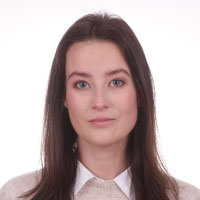 JENNIFER FOLEY
Profesora y Directora de TFG
Professor and FRP Director
Profesora de inglés titulada CELT, con un Máster en Lingüística Aplicada por la Universidad Autónoma de Madrid. Actualmente estoy cursando un doctorado en Lingüística Cognitiva, enfocándome en comunicación de salud mental y redes sociales. Desde 2016 imparto clases de inglés en España a estudiantes universitarios, escolares y profesionales del sector energético, financiero, publicitario y de marketing.
JENNIFER FOLEY
Profesora y Directora de TFG
Professor and FRP Director
Profesora de inglés titulada CELT, con un Máster en Lingüística Aplicada por la Universidad Autónoma de Madrid. Actualmente estoy cursando un doctorado en Lingüística Cognitiva, enfocándome en comunicación de salud mental y redes sociales. Desde 2016 imparto clases de inglés en España a estudiantes universitarios, escolares y profesionales del sector energético, financiero, publicitario y de marketing.
jfoley@nebrija.es
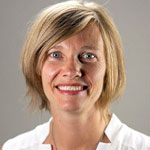 Alice Foucart
Directora TFG
FRP Director
Investigadora principal del Grupo Nebrija en Lingüística Aplicada a la Enseñanza de Lenguas Extranjeras. Doctora por la University of Edinburgh (Reino Unido) y por la Université de Provence (Francia), cuenta con un Máster en Ciencias del Lenguaje por la Université de Provence y la University of York (Reino Unido) y es licenciada en Filología Inglesa por la Université de Lille (Francia). A lo largo de su trayectoria profesional ha trabajado como investigadora postdoctoral en tres instituciones del Reino Unido: Heriot-Watt University, University of Edinburgh y University of Bangor. Además, ha formado parte del claustro de la Universitat Pompeu Fabra y ha dirigido un proyecto Marie Sklodowska-Curie en Ghent University (Bélgica). Es editora asociada de las revistas Second Language Research y Frontiers in Psychology. Como docente, imparte clases en los ámbitos de Lingüística Francesa, Psicología y Neurociencia.
Alice Foucart
Directora TFG
FRP Director
Investigadora principal del Grupo Nebrija en Lingüística Aplicada a la Enseñanza de Lenguas Extranjeras. Doctora por la University of Edinburgh (Reino Unido) y por la Université de Provence (Francia), cuenta con un Máster en Ciencias del Lenguaje por la Université de Provence y la University of York (Reino Unido) y es licenciada en Filología Inglesa por la Université de Lille (Francia). A lo largo de su trayectoria profesional ha trabajado como investigadora postdoctoral en tres instituciones del Reino Unido: Heriot-Watt University, University of Edinburgh y University of Bangor. Además, ha formado parte del claustro de la Universitat Pompeu Fabra y ha dirigido un proyecto Marie Sklodowska-Curie en Ghent University (Bélgica). Es editora asociada de las revistas Second Language Research y Frontiers in Psychology. Como docente, imparte clases en los ámbitos de Lingüística Francesa, Psicología y Neurociencia.
afoucart@nebrija.es
 Alejandro Galán Marín
Profesor y Director de TFG
Professor and FRP Director
Graduado en Educación Primaria con Mención en inglés por la Universidad Nebrija. Profesor de Grado en la Facultad de Lenguas y Educación. Docente en cursos de formación en inglés. Desde 2019, ha sido docente en los niveles de Educación Infantil y Educación Primaria, tanto en España como en un contexto internacional (Dublín). Especialista en Ciencias Sociales y Naturales, entre otras áreas de conocimiento.
Alejandro Galán Marín
Profesor y Director de TFG
Professor and FRP Director
Graduado en Educación Primaria con Mención en inglés por la Universidad Nebrija. Profesor de Grado en la Facultad de Lenguas y Educación. Docente en cursos de formación en inglés. Desde 2019, ha sido docente en los niveles de Educación Infantil y Educación Primaria, tanto en España como en un contexto internacional (Dublín). Especialista en Ciencias Sociales y Naturales, entre otras áreas de conocimiento.
agalamar@nebrija.es
 Carmen Gallego Domínguez
Directora TFG
FRP Director
Doctora en Educación con mención internacional por la Universidad de Sevilla y Texas A&M University (Estados Unidos). Acreditada. Con estancias de investigación en República Dominicana, Texas e Israel durante su formación doctoral. Así mismo posee másteres en dirección de instituciones educativas y E-Learning (aprendizaje a través de Internet). Su formación previa es diplomada en educación primaria y licenciada en psicopedagogía. Docente en Grados de Educación Primaria, Infantil, Pedagogía; Máster en Tecnología y en Orientación Educativa. Directora de Trabajos Fin de Máster y orientadora en tesis doctorales de estudiantes internacionales. Investigadora en colaboración con universidades como Texas A&M o Coastal Carolina (Estados Unidos) y Univesity of Haifa (Israel), entre otras. Algunos de los grupos de investigación en los que forma parte como colaboradora e investigadora son el Grupo IDEA; International Study Association on Teachers and Teaching-ISATT; American Educational Research Association; Teaching, Learning and Culture in the College of Education and Human Development; entre otros. Las publicaciones versan sobre profesorado principiante, mentoría, mejora escolar y tecnologías en educación, teniendo más de ochenta publicaciones en total.
Carmen Gallego Domínguez
Directora TFG
FRP Director
Doctora en Educación con mención internacional por la Universidad de Sevilla y Texas A&M University (Estados Unidos). Acreditada. Con estancias de investigación en República Dominicana, Texas e Israel durante su formación doctoral. Así mismo posee másteres en dirección de instituciones educativas y E-Learning (aprendizaje a través de Internet). Su formación previa es diplomada en educación primaria y licenciada en psicopedagogía. Docente en Grados de Educación Primaria, Infantil, Pedagogía; Máster en Tecnología y en Orientación Educativa. Directora de Trabajos Fin de Máster y orientadora en tesis doctorales de estudiantes internacionales. Investigadora en colaboración con universidades como Texas A&M o Coastal Carolina (Estados Unidos) y Univesity of Haifa (Israel), entre otras. Algunos de los grupos de investigación en los que forma parte como colaboradora e investigadora son el Grupo IDEA; International Study Association on Teachers and Teaching-ISATT; American Educational Research Association; Teaching, Learning and Culture in the College of Education and Human Development; entre otros. Las publicaciones versan sobre profesorado principiante, mentoría, mejora escolar y tecnologías en educación, teniendo más de ochenta publicaciones en total.
cgallego@nebrija.es
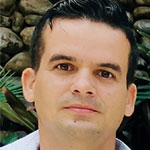 Alién García Hernández
Profesor y Director TFG
Professor and FRP Director
Doctor en Educación por la Universidad de Sevilla. Ingeniero en Ciencias Informáticas por la Universidad de las Ciencias Informáticas (Cuba). Obtuvo el Premio a la Sostenibilidad de la Asociación Universitaria Iberoamericana de Posgrado (AUIP) en la modalidad de Tesis Doctoral 2020. Ha ejercido la docencia en diferentes universidades desde 2009: Universidad de las Ciencias Informáticas (Cuba), Universidad de la Habana (Cuba) y Universidad de Nebrija. Cuenta con experiencia profesional en la dirección, gestión y control de personas y procesos, ocupando cargos como Director de Extensión Universitaria y Director de Departamento. Sus líneas principales de investigación son las Tecnologías en la Educación, la Didáctica de las Matemáticas además de los Métodos de Investigación y Diagnóstico en Educación. Ha publicado artículos, capítulo de libro y participado en congresos internacionales sobre dichas temáticas. Ha participado en el diseño y dirección de proyectos asociados al desarrollo de software educativo.
Alién García Hernández
Profesor y Director TFG
Professor and FRP Director
Doctor en Educación por la Universidad de Sevilla. Ingeniero en Ciencias Informáticas por la Universidad de las Ciencias Informáticas (Cuba). Obtuvo el Premio a la Sostenibilidad de la Asociación Universitaria Iberoamericana de Posgrado (AUIP) en la modalidad de Tesis Doctoral 2020. Ha ejercido la docencia en diferentes universidades desde 2009: Universidad de las Ciencias Informáticas (Cuba), Universidad de la Habana (Cuba) y Universidad de Nebrija. Cuenta con experiencia profesional en la dirección, gestión y control de personas y procesos, ocupando cargos como Director de Extensión Universitaria y Director de Departamento. Sus líneas principales de investigación son las Tecnologías en la Educación, la Didáctica de las Matemáticas además de los Métodos de Investigación y Diagnóstico en Educación. Ha publicado artículos, capítulo de libro y participado en congresos internacionales sobre dichas temáticas. Ha participado en el diseño y dirección de proyectos asociados al desarrollo de software educativo.
agarciahe@nebrija.es
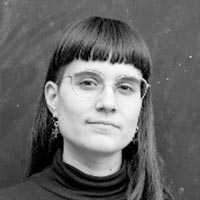 Irene García Herráez
Profesor y Director TFG
Professor and FRP Director
Docente universitaria especializada en teatro y literatura, que combina la enseñanza con la creación dramatúrgica, la dirección escénica y la investigación, con un enfoque particular en el teatro para la infancia y la juventud. Graduada en Lenguas Modernas, Cultura y Comunicación por la Universidad Autónoma de Madrid y en Dramaturgia y Dirección por la Real Escuela Superior de Arte Dramático (RESAD). En 2017, obtuvo el Máster en Teatro y Artes Escénicas por la Universidad Complutense de Madrid, con una investigación sobre la representación femenina en el teatro musical. Ha ampliado su formación en talleres especializados con profesionales como Sandra Vicente, Mariano García, Ignacio del Moral y Carlos Tuñón. Desde 2022, ejerce como profesora en la Universidad Camilo José Cela, impartiendo asignaturas como Danzas del Mundo, Juego, Ritmo y Movimiento, y Cuentos Motores, además de tutelar Trabajos de Fin de Grado. También participa como Embajadora de la Facultad de Educación en el programa La Colmena Experience de la UCJC. Entre sus reconocimientos académicos se incluyen la Beca de Excelencia de la Comunidad de Madrid (2014 y 2015), el Diploma de Reconocimiento al Rendimiento Académico de la UCM (2014) y la Beca del Aula de Verano Ortega y Gasset de la Universidad Internacional Menéndez Pelayo (2013).
Irene García Herráez
Profesor y Director TFG
Professor and FRP Director
Docente universitaria especializada en teatro y literatura, que combina la enseñanza con la creación dramatúrgica, la dirección escénica y la investigación, con un enfoque particular en el teatro para la infancia y la juventud. Graduada en Lenguas Modernas, Cultura y Comunicación por la Universidad Autónoma de Madrid y en Dramaturgia y Dirección por la Real Escuela Superior de Arte Dramático (RESAD). En 2017, obtuvo el Máster en Teatro y Artes Escénicas por la Universidad Complutense de Madrid, con una investigación sobre la representación femenina en el teatro musical. Ha ampliado su formación en talleres especializados con profesionales como Sandra Vicente, Mariano García, Ignacio del Moral y Carlos Tuñón. Desde 2022, ejerce como profesora en la Universidad Camilo José Cela, impartiendo asignaturas como Danzas del Mundo, Juego, Ritmo y Movimiento, y Cuentos Motores, además de tutelar Trabajos de Fin de Grado. También participa como Embajadora de la Facultad de Educación en el programa La Colmena Experience de la UCJC. Entre sus reconocimientos académicos se incluyen la Beca de Excelencia de la Comunidad de Madrid (2014 y 2015), el Diploma de Reconocimiento al Rendimiento Académico de la UCM (2014) y la Beca del Aula de Verano Ortega y Gasset de la Universidad Internacional Menéndez Pelayo (2013).
igarciah@nebrija.es
 PAULA GARCÍA SANZ
Profesora y Directora de TFG
Professor and FRP Director
Graduada en Magisterio de Educación Infantil y Primaria por la UAH. Máster en Atención a la Diversidad y Apoyos educativos en el aula (CES). Profesora de la Mención de Inglés en el Grado de Educación Infantil y Primaria en la Facultad de Lenguas y Educación. Profesora del Grado Bilingüe de Educación Infantil y Primaria en la misma facultad. Autora de la publicación “Health Diagnosis through Drawings in a Tanzanian Child Population” en JSM Central.
PAULA GARCÍA SANZ
Profesora y Directora de TFG
Professor and FRP Director
Graduada en Magisterio de Educación Infantil y Primaria por la UAH. Máster en Atención a la Diversidad y Apoyos educativos en el aula (CES). Profesora de la Mención de Inglés en el Grado de Educación Infantil y Primaria en la Facultad de Lenguas y Educación. Profesora del Grado Bilingüe de Educación Infantil y Primaria en la misma facultad. Autora de la publicación “Health Diagnosis through Drawings in a Tanzanian Child Population” en JSM Central.
pgarcisa@nebrija.es
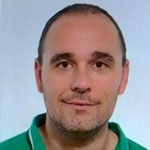 Juan Diego Gómez-Escalonilla Torrijos
Profesor y Director TFG
Professor and FRP Director
Doctor en Educación por la Universidad Camilo José Cela. Maestro de Primaria y especialista en Inglés y Educación Física (UCLM). Línea de investigación e innovación sobre neurociencias aplicadas al proceso de aprendizaje (motivación y lectoescritura). Ha impartido docencia en el Grado de Maestro Infantil y Primaria de UNIR. Durante más de veinte años ha trabajado en el ámbito educativo impartiendo clases a infantil, primaria secundaria y adultos, y ha sido director de TFG y TFM.
Juan Diego Gómez-Escalonilla Torrijos
Profesor y Director TFG
Professor and FRP Director
Doctor en Educación por la Universidad Camilo José Cela. Maestro de Primaria y especialista en Inglés y Educación Física (UCLM). Línea de investigación e innovación sobre neurociencias aplicadas al proceso de aprendizaje (motivación y lectoescritura). Ha impartido docencia en el Grado de Maestro Infantil y Primaria de UNIR. Durante más de veinte años ha trabajado en el ámbito educativo impartiendo clases a infantil, primaria secundaria y adultos, y ha sido director de TFG y TFM.
jgomezescalonilla@nebrija.es
 Mª Isabel Gómez León
Profesora y Directora TFG
Professor and FRP Director
Doctora en Neuropsicología, Licenciada en Psicología clínica y Psicología Educativa, Máster en Atención Temprana, Máster en Logopedia Clínica y Escolar, Especialista en Neuropsicología del TDAH, Especialista en el TEA , Altas Capacidades intelectuales, Neuropsicología de la Educación.
Mª Isabel Gómez León
Profesora y Directora TFG
Professor and FRP Director
Doctora en Neuropsicología, Licenciada en Psicología clínica y Psicología Educativa, Máster en Atención Temprana, Máster en Logopedia Clínica y Escolar, Especialista en Neuropsicología del TDAH, Especialista en el TEA , Altas Capacidades intelectuales, Neuropsicología de la Educación. Gerente de un centro de Neuropsicología infantil, especializado en niños con Altas Capacidades, niños con TDAH, niños con TEA, y niños con Trastornos del Lenguaje y la Comunicación.
Autora de contenidos y profesora de postgrado en las titulaciones de Máster de Educación Especial, Máster de Neuromarketing y Máster de Neuropsicología y Educación en la Universidad Internacional de La Rioja; profesora de postgrado en las titulaciones de Máster de Procesos Educativos de Enseñanza y Aprendizaje y Máster de Atención a la Diversidad, profesora de los grados de Educación Infantil y Educación Primaria en la Universidad Nebrija; y profesora de postgrado en las titulaciones de Máster de Competencias Docentes Avanzadas y del Máster de Orientación e Intervención Psicopedagógica en la Universidad Camilo José Cela.
Especialista en investigación y desarrollo en la Universidad Politécnica de Madrid. mgomezle@nebrija.es
 Jorge González Alonso
Director de TFG
FRP Director
Lingüista y científico cognitivo especializado en el procesamiento del lenguaje y sus correlatos neuronales. Su labor investigadora se centra en el estudio de cómo la mente y el cerebro abordan la compleja tarea de adquirir una nueva lengua desde los primeros momentos de exposición. Actualmente, desarrolla su actividad en el Centro de Investigación Nebrija en Cognición (CINC) y en el AcqVA Aurora Center de la UiT The Arctic University of Norway, donde investiga distintos aspectos del aprendizaje lingüístico desde una perspectiva interdisciplinar que combina lingüística, neurociencia y psicología cognitiva.
jgonzalezal@nebrija.es
Jorge González Alonso
Director de TFG
FRP Director
Lingüista y científico cognitivo especializado en el procesamiento del lenguaje y sus correlatos neuronales. Su labor investigadora se centra en el estudio de cómo la mente y el cerebro abordan la compleja tarea de adquirir una nueva lengua desde los primeros momentos de exposición. Actualmente, desarrolla su actividad en el Centro de Investigación Nebrija en Cognición (CINC) y en el AcqVA Aurora Center de la UiT The Arctic University of Norway, donde investiga distintos aspectos del aprendizaje lingüístico desde una perspectiva interdisciplinar que combina lingüística, neurociencia y psicología cognitiva.
jgonzalezal@nebrija.es
 Manuel Ángel González Berruga
Profesor y Director de TFG
Professor and FRP Director
Doctor en Educación por la U. de Murcia y Doctorando en filosofía por la UNED. Máster en Filosofía teórica y práctica por la UNED. Máster en Actividad físico-deportiva, personas con discapacidad e inclusión social por la U. Autónoma de Madrid. Licenciado en Pedagogía por la U. de Murcia. Diplomado en Educación Física por la U. de Castilla La Mancha. Docente e Investigador a tiempo parcial en la PUCE Sede Esmeraldas, Ecuador. Ha sido Director del Máster en Educación Física y Deporte de la PUCE Sede Esmeraldas. Ha impartido asignaturas de grado y máster sobre investigación, educación inclusiva, atención a la diversidad, modificación de conducta y diseño de proyectos. Ha dirigido y participado en proyectos de investigación acción sobre inclusión y desarrollo escolar. Ha escrito artículos, libros, organizado encuentros y participado en ponencias y mesas redondas sobre educación y filosofía. Líneas de investigación: calidad de la enseñanza, currículum, inclusión educativa.
Manuel Ángel González Berruga
Profesor y Director de TFG
Professor and FRP Director
Doctor en Educación por la U. de Murcia y Doctorando en filosofía por la UNED. Máster en Filosofía teórica y práctica por la UNED. Máster en Actividad físico-deportiva, personas con discapacidad e inclusión social por la U. Autónoma de Madrid. Licenciado en Pedagogía por la U. de Murcia. Diplomado en Educación Física por la U. de Castilla La Mancha. Docente e Investigador a tiempo parcial en la PUCE Sede Esmeraldas, Ecuador. Ha sido Director del Máster en Educación Física y Deporte de la PUCE Sede Esmeraldas. Ha impartido asignaturas de grado y máster sobre investigación, educación inclusiva, atención a la diversidad, modificación de conducta y diseño de proyectos. Ha dirigido y participado en proyectos de investigación acción sobre inclusión y desarrollo escolar. Ha escrito artículos, libros, organizado encuentros y participado en ponencias y mesas redondas sobre educación y filosofía. Líneas de investigación: calidad de la enseñanza, currículum, inclusión educativa.mgonzalb@nebrija.es
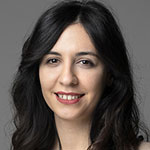 Patricia González Collado
Directora de TFG
FRP Director
Doctora en Educación por la Universidad Autónoma de Madrid con mención Cum Laude. Graduada en Pedagogía por la Universidad de Oviedo y Máster en Calidad y mejora de la Educación por la Universidad Autónoma de Madrid. Cuenta con una amplia experiencia en el ámbito de la formación a distancia, tutorizando proyectos e-learning y gestionando plataformas virtuales aplicadas al proceso de enseñanza-aprendizaje. Una de sus líneas de investigación está centrada en la Pedagogía de la Muerte en el contexto educativo y hospitalario. Es investigadora en proyectos I+D+I como “Innovación e Inclusión de la Muerte en Educación” y “Pedagogía Pandemia y Mejora de la Educación” (Ministerio de Ciencia e Innovación). Co-autora de los libros “La práctica de la pedagogía de la muerte: Guía Educativa y Plan Lector”. Ha presentado diversas comunicaciones y ponencias en Congresos Educativos. Actualmente, es directora del Máster en Dirección y Transformación Digital de Centros Educativos y del Máster en Gobernanza Educativa en la Universidad Antonio de Nebrija. También es docente en el Máster Universitario en Formación del Profesorado de ESO y Bachillerato, FP y Enseñanza de Idiomas (Universidad Antonio de Nebrija).
Patricia González Collado
Directora de TFG
FRP Director
Doctora en Educación por la Universidad Autónoma de Madrid con mención Cum Laude. Graduada en Pedagogía por la Universidad de Oviedo y Máster en Calidad y mejora de la Educación por la Universidad Autónoma de Madrid. Cuenta con una amplia experiencia en el ámbito de la formación a distancia, tutorizando proyectos e-learning y gestionando plataformas virtuales aplicadas al proceso de enseñanza-aprendizaje. Una de sus líneas de investigación está centrada en la Pedagogía de la Muerte en el contexto educativo y hospitalario. Es investigadora en proyectos I+D+I como “Innovación e Inclusión de la Muerte en Educación” y “Pedagogía Pandemia y Mejora de la Educación” (Ministerio de Ciencia e Innovación). Co-autora de los libros “La práctica de la pedagogía de la muerte: Guía Educativa y Plan Lector”. Ha presentado diversas comunicaciones y ponencias en Congresos Educativos. Actualmente, es directora del Máster en Dirección y Transformación Digital de Centros Educativos y del Máster en Gobernanza Educativa en la Universidad Antonio de Nebrija. También es docente en el Máster Universitario en Formación del Profesorado de ESO y Bachillerato, FP y Enseñanza de Idiomas (Universidad Antonio de Nebrija).pgonzalezco@nebrija.es
 Andrea González García
Profesora y Directora TFG
Professor and FRP Director
Doctoranda (FPU) en la Universidad Antonio de Nebrija en el programa de Lingüística Aplicada a la Enseñanza de Lenguas. Su interés se centra en el procesamiento emocional durante la interacción social en una segunda lengua. Graduada en Educación Infantil y Primaria con mención en inglés, obtiene el Máster en Enseñanza Bilingüe en la Universidad Antonio de Nebrija. Además, posee el título Superior de Música en el Real Conservatorio Superior de Música de Madrid. Receptora de la Beca de Excelencia de la Comunidad de Madrid (2015, 2016, 2017, 2018 y 2019) y becada por la Fundación Antonio de Nebrija, realizó prácticas extracurriculares en The British Council Teaching Centre. Finalizó sus estudios de grado obteniendo la Mención Nebrija a mejor expediente académico de Grado de la Facultad de Lenguas y Educación. Obtuvo el premio al mejor Trabajo Fin de Grado en el IV Congreso Internacional Nebrija de Lingüística Aplicada a la Enseñanza de Lenguas. Finalizó simultáneamente sus estudios profesionales de música obteniendo el Premio Fin de Grado Profesional en la especialidad de oboe. Tras finalizar el máster, obtuvo el Premio Nebrija-Santander TFM en líneas de cátedras de Enseñanza del Español como Lengua de Migrantes y Refugiados. Es nativa en español y posee un nivel C2 de inglés. Posee un nivel B2 en francés complementado con estancias lingüísticas en Burdeos y Toulouse. Colabora como oboísta activamente con la Orquesta de Coro y Cámara Sonora y la Friedenscamerata.
agonzalezga@nebrija.es
Andrea González García
Profesora y Directora TFG
Professor and FRP Director
Doctoranda (FPU) en la Universidad Antonio de Nebrija en el programa de Lingüística Aplicada a la Enseñanza de Lenguas. Su interés se centra en el procesamiento emocional durante la interacción social en una segunda lengua. Graduada en Educación Infantil y Primaria con mención en inglés, obtiene el Máster en Enseñanza Bilingüe en la Universidad Antonio de Nebrija. Además, posee el título Superior de Música en el Real Conservatorio Superior de Música de Madrid. Receptora de la Beca de Excelencia de la Comunidad de Madrid (2015, 2016, 2017, 2018 y 2019) y becada por la Fundación Antonio de Nebrija, realizó prácticas extracurriculares en The British Council Teaching Centre. Finalizó sus estudios de grado obteniendo la Mención Nebrija a mejor expediente académico de Grado de la Facultad de Lenguas y Educación. Obtuvo el premio al mejor Trabajo Fin de Grado en el IV Congreso Internacional Nebrija de Lingüística Aplicada a la Enseñanza de Lenguas. Finalizó simultáneamente sus estudios profesionales de música obteniendo el Premio Fin de Grado Profesional en la especialidad de oboe. Tras finalizar el máster, obtuvo el Premio Nebrija-Santander TFM en líneas de cátedras de Enseñanza del Español como Lengua de Migrantes y Refugiados. Es nativa en español y posee un nivel C2 de inglés. Posee un nivel B2 en francés complementado con estancias lingüísticas en Burdeos y Toulouse. Colabora como oboísta activamente con la Orquesta de Coro y Cámara Sonora y la Friedenscamerata.
agonzalezga@nebrija.es
 Alfonso González Garrido
Profesor y Director TFG
Professor and FRP Director
Alfonso González Garrido es Grado de Educación Primaria e Infantil con especialidades en música, audición y lenguaje, pedagogía terapéutica e inglés, máster en psicopedagogía e investigador en materias de inclusión, habiéndose especializado como comunicador de lengua de signos española y con personas con trastorno del espectro autista, dedicándose en la actualidad a formar a maestros y profesores a través del Centro de Formación e Innovación Educativa de Castilla y León. Además de la formación académica es Diplomado en danza clásica especializado en coreografía de la escuela de Víctor Ullate y entrenador de gimnasia rítmica. Ha recibido el premio “Juntos hacemos vida” 2021 por su labor en el ámbito de la inclusión creando espectáculos como: “Musical el Mago de Oz” o las cinco ediciones del “Árbol de los deseos” (considerado de interés turístico nacional por la Junta de Castilla y León). Cuenta además con éxitos deportivos con medallistas autonómicas y gimnastas nacionales.
agonzalezgar@nebrija.es
Alfonso González Garrido
Profesor y Director TFG
Professor and FRP Director
Alfonso González Garrido es Grado de Educación Primaria e Infantil con especialidades en música, audición y lenguaje, pedagogía terapéutica e inglés, máster en psicopedagogía e investigador en materias de inclusión, habiéndose especializado como comunicador de lengua de signos española y con personas con trastorno del espectro autista, dedicándose en la actualidad a formar a maestros y profesores a través del Centro de Formación e Innovación Educativa de Castilla y León. Además de la formación académica es Diplomado en danza clásica especializado en coreografía de la escuela de Víctor Ullate y entrenador de gimnasia rítmica. Ha recibido el premio “Juntos hacemos vida” 2021 por su labor en el ámbito de la inclusión creando espectáculos como: “Musical el Mago de Oz” o las cinco ediciones del “Árbol de los deseos” (considerado de interés turístico nacional por la Junta de Castilla y León). Cuenta además con éxitos deportivos con medallistas autonómicas y gimnastas nacionales.
agonzalezgar@nebrija.es
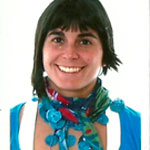 Laura González Saiz
Profesora y Directora TFG
Professor and FRP Director
Licenciada y Doctora en Ciencias de la Actividad Física y del Deporte (ambas por la Universidad Europea de Madrid) posee también un Máster en Actividad Física y Salud.
Laura González Saiz
Profesora y Directora TFG
Professor and FRP Director
Licenciada y Doctora en Ciencias de la Actividad Física y del Deporte (ambas por la Universidad Europea de Madrid) posee también un Máster en Actividad Física y Salud.Es profesora colaboradora en el Máster de Actividad Física y Salud de la Universidad Europea de Madrid y ha trabajado como profesora asociada a la Universidad de Zaragoza impartiendo diversas asignaturas tanto en el Grado de Magisterio de Infantil como de Primaria.
Posee varias publicaciones relacionadas sobre la influencia del ejercicio físico en pacientes con diversas patologías. lgonzalezsa@nebrija.es
 María Concepción Gordo Alonso
Profesora y Directora TFG
Professor and FRP Director
Doctoranda en la Facultad de Formación del Profesorado y Educación de la Universidad Autónoma de Madrid, la línea de investigación es el impacto de la Comunicación No Verbal en docencia. Licenciada en Derecho por la Universidad Complutense de Madrid y Graduada en Psicología por la Universidad Internacional de La Rioja. Máster en Coaching, Inteligencia Emocional y Relacional y Ciencia Cognitiva en la Universidad de Alcalá de Henares. Como otras formaciones estudió Programación Neurolingüística y es experta en Comunicación No Verbal método BodySystemics. Escribe sobre emociones y Comunicación No Verbal en diferentes publicaciones y Blogs. Es ponente del Máster Universitario en Arteterapia y Educación Artística para la inclusión social y trabaja desde hace más de 20 años en el Departamento de Marketing Online de Openbank banco online del Grupo Santander donde es la líder de Personal Skills el club de crecimiento personal para empleados.
mgordo@nebrija.es
María Concepción Gordo Alonso
Profesora y Directora TFG
Professor and FRP Director
Doctoranda en la Facultad de Formación del Profesorado y Educación de la Universidad Autónoma de Madrid, la línea de investigación es el impacto de la Comunicación No Verbal en docencia. Licenciada en Derecho por la Universidad Complutense de Madrid y Graduada en Psicología por la Universidad Internacional de La Rioja. Máster en Coaching, Inteligencia Emocional y Relacional y Ciencia Cognitiva en la Universidad de Alcalá de Henares. Como otras formaciones estudió Programación Neurolingüística y es experta en Comunicación No Verbal método BodySystemics. Escribe sobre emociones y Comunicación No Verbal en diferentes publicaciones y Blogs. Es ponente del Máster Universitario en Arteterapia y Educación Artística para la inclusión social y trabaja desde hace más de 20 años en el Departamento de Marketing Online de Openbank banco online del Grupo Santander donde es la líder de Personal Skills el club de crecimiento personal para empleados.
mgordo@nebrija.es
 María José Gutiérrez Irún
Directora TFG
FRP Director
Historiadora del Arte por la UNED. Tiene un Máster en Investigación en Historia del Arte y dos postgrados: uno, en Formación del Profesorado: Historia del Arte en Femenino. La Mujer Artista en la Historia: Una Propuesta para Educación en Igualdad de Género; y otro sobre Los Centros de Documentación y la Investigación Histórica: Archivos y Bibliotecas. Realizó estudios de Lengua inglesa y francesa en el Algolquin Collage de Ottawa (Canadá). Fue becada por el British Council y la Comunidad de Madrid para la realización del curso Técnicas Pedagógicas para Profesores de Inglés. Con más de 25 años dedicados a la docencia, ha alternado sus clases como profesora de inglés e italiano en organismos gubernamentales con la traducción y la interpretación para el Ministerio del Interior. También ha realizado traducciones para la Editorial Akal y la revista teatral de la Sala Pradillo de Madrid. En el campo de la investigación ha trabajado en el Legado Barbieri (Biblioteca Nacional) colaborando en la publicación Papeles Barbieri. Teatros de los Caños del Peral. Ha publicado, como firma invitada, en el blog de investigadores de la Biblioteca Nacional, el artículo titulado De Teatros y actores. También cuenta con una amplia experiencia en grupos teatrales como escritora, actriz y directora de escena.
mgutierrezi@nebrija.es
María José Gutiérrez Irún
Directora TFG
FRP Director
Historiadora del Arte por la UNED. Tiene un Máster en Investigación en Historia del Arte y dos postgrados: uno, en Formación del Profesorado: Historia del Arte en Femenino. La Mujer Artista en la Historia: Una Propuesta para Educación en Igualdad de Género; y otro sobre Los Centros de Documentación y la Investigación Histórica: Archivos y Bibliotecas. Realizó estudios de Lengua inglesa y francesa en el Algolquin Collage de Ottawa (Canadá). Fue becada por el British Council y la Comunidad de Madrid para la realización del curso Técnicas Pedagógicas para Profesores de Inglés. Con más de 25 años dedicados a la docencia, ha alternado sus clases como profesora de inglés e italiano en organismos gubernamentales con la traducción y la interpretación para el Ministerio del Interior. También ha realizado traducciones para la Editorial Akal y la revista teatral de la Sala Pradillo de Madrid. En el campo de la investigación ha trabajado en el Legado Barbieri (Biblioteca Nacional) colaborando en la publicación Papeles Barbieri. Teatros de los Caños del Peral. Ha publicado, como firma invitada, en el blog de investigadores de la Biblioteca Nacional, el artículo titulado De Teatros y actores. También cuenta con una amplia experiencia en grupos teatrales como escritora, actriz y directora de escena.
mgutierrezi@nebrija.es
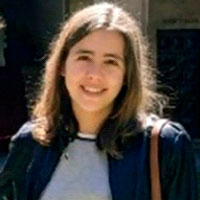 Marina Gutierrez Moronta
Profesora y Directora TFG
Professor and FRP Director
Doctoranda en el Programa de Salud, Discapacidad, Dependencia y Bienestar en la Universidad de Salamanca (USAL). Forma parte del Grupo de Investigación del Instituto de Investigación Biomédica de Salamanca (IBSAL) en el área de Atención Primaria, Salud Pública y Farmacología, con un enfoque en personas con discapacidad y dependencia, bajo la dirección del Dr. José Antonio Mirón Canelo. Actualmente, desempeña el rol de Técnico en Salud y Personal de Soporte Científico-Técnico en la Fundación para la Investigación e Innovación Biosanitaria de Atención Primaria (FIIBAP), donde se encarga del mantenimiento del registro poblacional de enfermedades raras en la Comunidad de Madrid (SIERMA). Previamente, colaboró en el proyecto SpainUDP, orientado a la investigación de enfermedades raras no diagnosticadas. Cuenta con experiencia profesional como logopeda en clínicas y asociaciones, además de haber trabajado como técnico de investigación en diversos proyectos. Desde 2023, ejerce como docente en la Universidad Camilo José Cela (UCJC), impartiendo la asignatura Evaluación e Intervención en los Trastornos de la Lengua Escrita, tutorando Trabajos de Fin de Grado y Máster en la Facultad de Educación, y participando en tribunales académicos. Su formación incluye un Grado en Logopedia y otro en Magisterio de Primaria con especialización en Necesidades Educativas Especiales. Además, ha completado un Máster en Trastornos de la Comunicación: Neurociencia de la Audición y el Lenguaje, y un Máster en Atención Temprana. Su trayectoria profesional combina experiencia clínica, docente e investigadora en los campos de la salud y la educación.
mgutierm@nebrija.es
Marina Gutierrez Moronta
Profesora y Directora TFG
Professor and FRP Director
Doctoranda en el Programa de Salud, Discapacidad, Dependencia y Bienestar en la Universidad de Salamanca (USAL). Forma parte del Grupo de Investigación del Instituto de Investigación Biomédica de Salamanca (IBSAL) en el área de Atención Primaria, Salud Pública y Farmacología, con un enfoque en personas con discapacidad y dependencia, bajo la dirección del Dr. José Antonio Mirón Canelo. Actualmente, desempeña el rol de Técnico en Salud y Personal de Soporte Científico-Técnico en la Fundación para la Investigación e Innovación Biosanitaria de Atención Primaria (FIIBAP), donde se encarga del mantenimiento del registro poblacional de enfermedades raras en la Comunidad de Madrid (SIERMA). Previamente, colaboró en el proyecto SpainUDP, orientado a la investigación de enfermedades raras no diagnosticadas. Cuenta con experiencia profesional como logopeda en clínicas y asociaciones, además de haber trabajado como técnico de investigación en diversos proyectos. Desde 2023, ejerce como docente en la Universidad Camilo José Cela (UCJC), impartiendo la asignatura Evaluación e Intervención en los Trastornos de la Lengua Escrita, tutorando Trabajos de Fin de Grado y Máster en la Facultad de Educación, y participando en tribunales académicos. Su formación incluye un Grado en Logopedia y otro en Magisterio de Primaria con especialización en Necesidades Educativas Especiales. Además, ha completado un Máster en Trastornos de la Comunicación: Neurociencia de la Audición y el Lenguaje, y un Máster en Atención Temprana. Su trayectoria profesional combina experiencia clínica, docente e investigadora en los campos de la salud y la educación.
mgutierm@nebrija.es
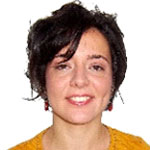 María Victoria Hernández de Riquer
Profesora y Directora TFG
Professor and FRP Director
Doctora Europea en Bioquímica y Biología Molecular por la Universidad Complutense de Madrid. Máster Universitario en Formación del Profesorado de Educación Secundaria Obligatoria y Bachillerato, Formación Profesional y Enseñanza de Idiomas por la Universidad Francisco de Vitoria. Licenciada en Ciencias Biológicas por la Universidad Complutense de Madrid.
Experiencia investigadora en el Centro Nacional de Investigaciones Cardiovasculares (ISCIII) y en el Centro Andaluz de Biología Molecular y Medicina Regenerativa (CSIC). Estancia en la Universidad de Turku-VTT Medical Biotechnology (Finlandia). Coordinadora educativa en COESU Educación. Autora externa en la editorial SM. Publicación de artículos científicos. Actualmente, docente de grado en la Universidad Nebrija.
mhernandezri@nebrija.es
María Victoria Hernández de Riquer
Profesora y Directora TFG
Professor and FRP Director
Doctora Europea en Bioquímica y Biología Molecular por la Universidad Complutense de Madrid. Máster Universitario en Formación del Profesorado de Educación Secundaria Obligatoria y Bachillerato, Formación Profesional y Enseñanza de Idiomas por la Universidad Francisco de Vitoria. Licenciada en Ciencias Biológicas por la Universidad Complutense de Madrid.
Experiencia investigadora en el Centro Nacional de Investigaciones Cardiovasculares (ISCIII) y en el Centro Andaluz de Biología Molecular y Medicina Regenerativa (CSIC). Estancia en la Universidad de Turku-VTT Medical Biotechnology (Finlandia). Coordinadora educativa en COESU Educación. Autora externa en la editorial SM. Publicación de artículos científicos. Actualmente, docente de grado en la Universidad Nebrija.
mhernandezri@nebrija.es
 Amanda Hernández Soto
Profesora y Directora TFG
Professor and FRP Director
Graduada en Educación Infantil por la Universidad de Extremadura y Graduada en Educación Primaria con especialidad en Pedagogía Terapéutica y Audición y Lenguaje por la Universidad Nebrija. Máster en Atención Temprana en la Universidad Camilo José Cela.
Amanda Hernández Soto
Profesora y Directora TFG
Professor and FRP Director
Graduada en Educación Infantil por la Universidad de Extremadura y Graduada en Educación Primaria con especialidad en Pedagogía Terapéutica y Audición y Lenguaje por la Universidad Nebrija. Máster en Atención Temprana en la Universidad Camilo José Cela. Tutora de Practicum y TFG en la Universidad Camilo José Cela en los Grados de Educación Infantil y Primaria desde el 2017, también participando en los Tribunales de evaluación de la asignatura Trabajo Fin de Grado como secretaria y vocal. ahernandezso@nebrija.es
 Antonio Herrero Hernández
Profesor y Director TFG
Professor and FRP Director
Doctor acreditado en Ciencias Geológicas. Inició la carrera docente como Profesor Asociado de varias Áreas de Conocimiento en la Rama de Ciencias en las Universidades de Alcalá de Henares y de León. Posteriormente ha sido Profesor Ayudante Doctor en la Universidad de León. En esta Universidad impartió docencia en el campo de Investigación de Ciencias Aplicadas en varias Licenciaturas, Diplomatura de Magisterio y varios Grados. Desde 2013 imparte docencia en asignaturas del campo de la Metodología de Investigación en Ciencias Sociales en los Grados de Educación Infantil y Primaria y en los Másteres de Formación de Profesorado de Enseñanza Secundaria y en el de Procesos Educativos de Enseñanza y Aprendizaje. Ha dirigido un conjunto numeroso de TFM/TFG. Es autor y coautor de un conjunto amplio de publicaciones en revistas nacionales e internacionales.
Antonio Herrero Hernández
Profesor y Director TFG
Professor and FRP Director
Doctor acreditado en Ciencias Geológicas. Inició la carrera docente como Profesor Asociado de varias Áreas de Conocimiento en la Rama de Ciencias en las Universidades de Alcalá de Henares y de León. Posteriormente ha sido Profesor Ayudante Doctor en la Universidad de León. En esta Universidad impartió docencia en el campo de Investigación de Ciencias Aplicadas en varias Licenciaturas, Diplomatura de Magisterio y varios Grados. Desde 2013 imparte docencia en asignaturas del campo de la Metodología de Investigación en Ciencias Sociales en los Grados de Educación Infantil y Primaria y en los Másteres de Formación de Profesorado de Enseñanza Secundaria y en el de Procesos Educativos de Enseñanza y Aprendizaje. Ha dirigido un conjunto numeroso de TFM/TFG. Es autor y coautor de un conjunto amplio de publicaciones en revistas nacionales e internacionales.
aherreroh@nebrija.es
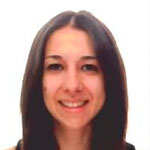 Patricia Hidalgo Cantero
Profesora y Directora TFG
Professor and FRP Director
Graduada en Educación Infantil en 2014 y Graduada en Educación Primaria en 2019. Experiencia laboral vinculada a la educación en aulas de primer y segundo ciclo de Educación Infantil.
Tutora de Practicum en los Grados de Educación de la Universidad Nebrija, así como el Máster de Enseñanza del Español como Lengua extranjera en la Universidad Católica de Murcia. Participación en tribunales de evaluación de TFG como secretaria y vocal en ambas titulaciones.
Actualmente, secretaria de la Revista de Investigación Magister (RDIM) y coordinadora pedagógica en Academia.
Patricia Hidalgo Cantero
Profesora y Directora TFG
Professor and FRP Director
Graduada en Educación Infantil en 2014 y Graduada en Educación Primaria en 2019. Experiencia laboral vinculada a la educación en aulas de primer y segundo ciclo de Educación Infantil.
Tutora de Practicum en los Grados de Educación de la Universidad Nebrija, así como el Máster de Enseñanza del Español como Lengua extranjera en la Universidad Católica de Murcia. Participación en tribunales de evaluación de TFG como secretaria y vocal en ambas titulaciones.
Actualmente, secretaria de la Revista de Investigación Magister (RDIM) y coordinadora pedagógica en Academia.
phidalgo@nebrija.es
 PATRICIA IGLESIAS FERNÁNDEZ
Profesora y Directora TFG
Professor and FRP Director
Grado en Educación Primaria. Máster en Neurociencia y Educación. Docente en centros bilingües de Educación Primaria. Coordinadora de proyectos internacionales Erasmus+ y eTwinning, centrados en innovación metodológica, inclusión y comunicación intercultural. Profesora especializada en enseñanza bilingüe y metodologías activas y recursos didácticos para el aprendizaje de lenguas extranjeras. Autora y diseñadora de materiales educativos vinculados a metodologías activas, aprendizaje cooperativo y neurociencia aplicada a la educación.
PATRICIA IGLESIAS FERNÁNDEZ
Profesora y Directora TFG
Professor and FRP Director
Grado en Educación Primaria. Máster en Neurociencia y Educación. Docente en centros bilingües de Educación Primaria. Coordinadora de proyectos internacionales Erasmus+ y eTwinning, centrados en innovación metodológica, inclusión y comunicación intercultural. Profesora especializada en enseñanza bilingüe y metodologías activas y recursos didácticos para el aprendizaje de lenguas extranjeras. Autora y diseñadora de materiales educativos vinculados a metodologías activas, aprendizaje cooperativo y neurociencia aplicada a la educación.
piglesif@nebrija.es
 María Beatriz Juárez Escribano
Directora TFG
FRP Director
Doctora Cum Laude por unanimidad en Publicidad y Relaciones Públicas, dentro del programa de Educación y Creatividad: Aplicaciones Tecnológicas, Sociales y Psicopedagógicas, por la Universidad Camilo José Cela, con la tesis "Las redes sociales virtuales como medios de comunicación de masas: autopercepción y comportamiento de los usuarios". Es doble licenciada en Comunicación Audiovisual y Ciencias Ambientales, y posee dos másteres: uno en Energías Renovables y Mercado Energético por la Escuela de Organización Industrial; y otro en Prevención de Riesgos Laborales por el Instituto Madrileño de Formación. Actualmente es profesora en la Facultad de Lenguas y Educación de la Universidad Antonio de Nebrija, impartiendo docencia en el Máster de TIC para la Educación. También ha trabajado como coordinadora del Máster de Dirección de Empresas de Comunicación en la Escuela de Administración de Empresas. Además, ha realizado trabajos de producción y docencia en el sector audiovisual y de la comunicación para instituciones públicas y privadas durante varios años.
María Beatriz Juárez Escribano
Directora TFG
FRP Director
Doctora Cum Laude por unanimidad en Publicidad y Relaciones Públicas, dentro del programa de Educación y Creatividad: Aplicaciones Tecnológicas, Sociales y Psicopedagógicas, por la Universidad Camilo José Cela, con la tesis "Las redes sociales virtuales como medios de comunicación de masas: autopercepción y comportamiento de los usuarios". Es doble licenciada en Comunicación Audiovisual y Ciencias Ambientales, y posee dos másteres: uno en Energías Renovables y Mercado Energético por la Escuela de Organización Industrial; y otro en Prevención de Riesgos Laborales por el Instituto Madrileño de Formación. Actualmente es profesora en la Facultad de Lenguas y Educación de la Universidad Antonio de Nebrija, impartiendo docencia en el Máster de TIC para la Educación. También ha trabajado como coordinadora del Máster de Dirección de Empresas de Comunicación en la Escuela de Administración de Empresas. Además, ha realizado trabajos de producción y docencia en el sector audiovisual y de la comunicación para instituciones públicas y privadas durante varios años.
mjuareze@nebrija.es
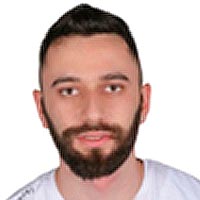 Andreas Kyriakou
Docente y Director de TFG
Professor and FRP Director
Doctor en Lingüística Aplicada a la Enseñanza de Lenguas por la Universidad Nebrija. Licenciado en Ciencias de la Educación, con especialización en Educación Primaria, por la Universidad de Chipre. Cursó el Máster en Didáctica del Español como Lengua Extranjera en la Universidad Nebrija. Ha formado parte del proyecto de investigación Cartografía de la certificación del español como lengua extranjera, liderado por el Instituto Cervantes y el Observatorio Nebrija del español. Su investigación ha sido publicada en revistas internacionales de alto impacto, como International Journal of Bilingual Education and Bilingualism y Cognition and Emotion. Entre sus principales intereses de investigación se encuentran la expresión emocional en L2, el moral foreign language effect, la identidad moral en L2, y los enfoques metodológicos para la enseñanza del léxico en ELE. Actualmente, es docente en la Facultad de Lenguas y Educación de la Universidad Nebrija.
Andreas Kyriakou
Docente y Director de TFG
Professor and FRP Director
Doctor en Lingüística Aplicada a la Enseñanza de Lenguas por la Universidad Nebrija. Licenciado en Ciencias de la Educación, con especialización en Educación Primaria, por la Universidad de Chipre. Cursó el Máster en Didáctica del Español como Lengua Extranjera en la Universidad Nebrija. Ha formado parte del proyecto de investigación Cartografía de la certificación del español como lengua extranjera, liderado por el Instituto Cervantes y el Observatorio Nebrija del español. Su investigación ha sido publicada en revistas internacionales de alto impacto, como International Journal of Bilingual Education and Bilingualism y Cognition and Emotion. Entre sus principales intereses de investigación se encuentran la expresión emocional en L2, el moral foreign language effect, la identidad moral en L2, y los enfoques metodológicos para la enseñanza del léxico en ELE. Actualmente, es docente en la Facultad de Lenguas y Educación de la Universidad Nebrija.
akyriako@nebrija.es
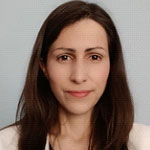 Victoria Eugenia Lamas Álvarez
Profesora y Directora TFG
Professor and FRP Director
Doctora en Filosofía por las Universidades de Valladolid y Salamanca. Máster en Patrimonio Histórico: investigación y gestión por la UCLM; Licenciada en Historia del Arte (UVa). Acreditada por ANECA como Profesora Contratada Doctora.
Coordinadora de Prácticas y TFM del Máster en Metodologías Docentes. Profesora de grado y posgrado de la Facultad de Lenguas y Educación.
Autora de distintas publicaciones y presentaciones en congresos relacionadas con innovación docente, nuevas metodologías para el ecosistema digital educativo y didáctica del patrimonio cultural.
Victoria Eugenia Lamas Álvarez
Profesora y Directora TFG
Professor and FRP Director
Doctora en Filosofía por las Universidades de Valladolid y Salamanca. Máster en Patrimonio Histórico: investigación y gestión por la UCLM; Licenciada en Historia del Arte (UVa). Acreditada por ANECA como Profesora Contratada Doctora.
Coordinadora de Prácticas y TFM del Máster en Metodologías Docentes. Profesora de grado y posgrado de la Facultad de Lenguas y Educación.
Autora de distintas publicaciones y presentaciones en congresos relacionadas con innovación docente, nuevas metodologías para el ecosistema digital educativo y didáctica del patrimonio cultural.
vlamas@nebrija.es
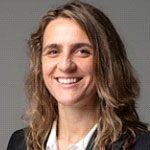 María-Cruz La Chica Delgado
Profesora y Directora TFG
Professor and FRP Director
Doctora y Máster en Literatura Hispanoamericana (UCM). Máster en Derechos Humanos (UC3M). Licenciada en Filología Hispánica (UCM). Coordinadora de TFM en el Departamento de Educación, Facultad de Lenguas y Educación. Docente de grado y postgrado en esa misma facultad en distintos cursos de formación sobre Lengua, Comunicación y Metodología de Investigación. Autora en diversas publicaciones y ponencias de congresos relacionadas con el estudio y análisis de la literatura y la lengua. Miembro del grupo de investigación Literatura y Cultura Hispanoamericanas (Cod.: HUM980). Otras líneas de investigación son: literatura de tradición oral, culturas indígenas americanas y Derechos Humanos.
María-Cruz La Chica Delgado
Profesora y Directora TFG
Professor and FRP Director
Doctora y Máster en Literatura Hispanoamericana (UCM). Máster en Derechos Humanos (UC3M). Licenciada en Filología Hispánica (UCM). Coordinadora de TFM en el Departamento de Educación, Facultad de Lenguas y Educación. Docente de grado y postgrado en esa misma facultad en distintos cursos de formación sobre Lengua, Comunicación y Metodología de Investigación. Autora en diversas publicaciones y ponencias de congresos relacionadas con el estudio y análisis de la literatura y la lengua. Miembro del grupo de investigación Literatura y Cultura Hispanoamericanas (Cod.: HUM980). Otras líneas de investigación son: literatura de tradición oral, culturas indígenas americanas y Derechos Humanos.
mlachica@nebrija.es
 Ana Rosa Lagares Gaitán
Profesora y Directora TFG
Professor and FRP Director
Doctora en Educación por la Universidad Autónoma de Madrid. Máster en Dirección y Gestión para la Calidad de Centros Educativos por la Universidad Francisco de Vitoria. Licenciatura en Ciencias de la Educación por la Universidad Complutense de Madrid.
Docente de distintas titulaciones de grado, máster sobre currículo, investigación educativa, atención a las diferencias individuales, aprendizaje y desarrollo.
Autora de distintas publicaciones sobre competencias, legislación educativa, evaluación, elementos transversales.
Miembro del grupo de investigación Neevolución y personal investigador de la Universidad de Atlántico Medio.
alagares@nebrija.es
Ana Rosa Lagares Gaitán
Profesora y Directora TFG
Professor and FRP Director
Doctora en Educación por la Universidad Autónoma de Madrid. Máster en Dirección y Gestión para la Calidad de Centros Educativos por la Universidad Francisco de Vitoria. Licenciatura en Ciencias de la Educación por la Universidad Complutense de Madrid.
Docente de distintas titulaciones de grado, máster sobre currículo, investigación educativa, atención a las diferencias individuales, aprendizaje y desarrollo.
Autora de distintas publicaciones sobre competencias, legislación educativa, evaluación, elementos transversales.
Miembro del grupo de investigación Neevolución y personal investigador de la Universidad de Atlántico Medio.
alagares@nebrija.es
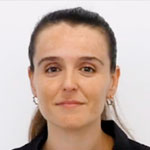 Lidia Lasso Belando
Profesora y Directora TFG
Professor and FRP Director
Licenciada en Psicología y graduada en ciencias de la actividad física y el deporte, Máster en entrenamiento deportivo, Máster universitario en formación del profesorado y Técnico profesional TIC en instalación, configuración, gestión y mantenimiento de aulas virtuales Moodle (on line).
Lidia Lasso Belando
Profesora y Directora TFG
Professor and FRP Director
Licenciada en Psicología y graduada en ciencias de la actividad física y el deporte, Máster en entrenamiento deportivo, Máster universitario en formación del profesorado y Técnico profesional TIC en instalación, configuración, gestión y mantenimiento de aulas virtuales Moodle (on line).Profesora asociada en la University of Wales en las asignaturas de especialización (fitness) y alto rendimiento deportivo.
Docente en diferentes cursos de formación ámbito CCAFD.
Autora de diferentes manuales relacionados con el ámbito CCAFD.
Docente en las titulaciones de formación profesional Técnico Superior en Animación de Actividades Físicas y Deportivas, Técnico Superior en Acondicionamiento Físico, Técnico Superior Integración Social y Técnico Superior en Dietética (modalidad presencial y a distancia)
Jefa de estudios en CDP Medac.
llasso@nebrija.es
 Óscar León Díaz
Profesor y Director TFG
Professor and FRP Director
Doctor en Ciencias de la Actividad Física y el Deporte en la Universidad Autónoma de Madrid. Máster en Formación del Profesorado de Educación Secundaria y Bachillerato y Licenciado en Ciencias de la Actividad Física y el Deporte por la Universidad Politécnica de Madrid. Autor de diversas publicaciones en revistas científicas y en Congresos Nacionales e Internacionales vinculadas con el aprendizaje y enseñanza de la Educación Física a través de metodologías activas. Actualmente, es profesor y responsable de docencia de las materias vinculadas con la EF en la Facultad de Lenguas y Educación de la Universidad de Nebrija y es miembro del equipo de investigadores de la Red de investigación en Aprendizaje y Servicio en Actividad Física y Deporte para la Inclusión Social (RIADIS).
oleon@nebrija.es
Óscar León Díaz
Profesor y Director TFG
Professor and FRP Director
Doctor en Ciencias de la Actividad Física y el Deporte en la Universidad Autónoma de Madrid. Máster en Formación del Profesorado de Educación Secundaria y Bachillerato y Licenciado en Ciencias de la Actividad Física y el Deporte por la Universidad Politécnica de Madrid. Autor de diversas publicaciones en revistas científicas y en Congresos Nacionales e Internacionales vinculadas con el aprendizaje y enseñanza de la Educación Física a través de metodologías activas. Actualmente, es profesor y responsable de docencia de las materias vinculadas con la EF en la Facultad de Lenguas y Educación de la Universidad de Nebrija y es miembro del equipo de investigadores de la Red de investigación en Aprendizaje y Servicio en Actividad Física y Deporte para la Inclusión Social (RIADIS).
oleon@nebrija.es
 Sara María Lladó Sánchez
Directora TFG
FRP Director
Máster en Liderazgo y Dirección de Centros Educativos (UNIR). Experto en Docencia universitaria Online (UNIR). Diplomada en Docentedo de Educación General Básica. Especialidad Preescolar (Universidad Villanueva) Graduada en Educación Primaria (Universidad Internacional Isabel I de Castilla). Docente universitaria en los Grados de Educación Infantil y Educación Primaria. (UNIR).
Sara María Lladó Sánchez
Directora TFG
FRP Director
Máster en Liderazgo y Dirección de Centros Educativos (UNIR). Experto en Docencia universitaria Online (UNIR). Diplomada en Docentedo de Educación General Básica. Especialidad Preescolar (Universidad Villanueva) Graduada en Educación Primaria (Universidad Internacional Isabel I de Castilla). Docente universitaria en los Grados de Educación Infantil y Educación Primaria. (UNIR).
Directora de TFG en el Grado de Maestro en Educación Primaria y de TFM en el Máster de Liderazgo Y Dirección de Centros Educativos (VIU) Treinta años de experiencia en docencia en Educación Infantil y Primaria en centro educativo. Coordinadora de proyectos globales de centro (Coordinadora de Calidad Modelo EFQM, Coordinadora de Nuevas Tecnologías, Coordinadora Innovación Pedagógica y Coordinadora docente de etapa de Primaria). sllado@nebrija.es
 María Picazo Llanos Iniesta
Profesora y Directora TFG
Professor and FRP Director
Licenciada en Filología Clásica, Graduada en Lengua y Literatura Españolas y cuenta con el Máster en Formación del Profesorado. Profesora de Lengua Castellana, Latín y Griego, con más de diez años de experiencia, destacando algunas participaciones en proyectos innovadores de enseñanza. Ha sido correctora de las Pruebas de acceso a la Universidad y ha preparado a grupos con gran éxito. También ha realizado la preparación para las pruebas de acceso a los ciclos de grado medio y superior, las pruebas de acceso a la universidad para mayores de 25 años y las pruebas del certificado de Educación Secundaria. Actualmente, colabora como docente en la Facultad de Lenguas y Educación en la Universidad Nebrija.
mpicazo@nebrija.es
María Picazo Llanos Iniesta
Profesora y Directora TFG
Professor and FRP Director
Licenciada en Filología Clásica, Graduada en Lengua y Literatura Españolas y cuenta con el Máster en Formación del Profesorado. Profesora de Lengua Castellana, Latín y Griego, con más de diez años de experiencia, destacando algunas participaciones en proyectos innovadores de enseñanza. Ha sido correctora de las Pruebas de acceso a la Universidad y ha preparado a grupos con gran éxito. También ha realizado la preparación para las pruebas de acceso a los ciclos de grado medio y superior, las pruebas de acceso a la universidad para mayores de 25 años y las pruebas del certificado de Educación Secundaria. Actualmente, colabora como docente en la Facultad de Lenguas y Educación en la Universidad Nebrija.
mpicazo@nebrija.es
 Ana López García
Profesora y Directora de TFG
Professor and FRP Director
Graduada en Logopedia por la UVA (Universidad de Valladolid). Máster en Daño neurológico por Instituto Superior de Estudios Psicológicos. Posgrado en el Trastorno del Espectro Autista en ISEP. Formación recibida en diferentes cursos como: Lengua de Signos, Disfagia Infantil, Comunicación Activa en Afasia, PECS (sistema alternativo y aumentativo en TEA), Abordaje logopédico en prematuridad y neonatología, Terapia Miofuncional y Dificultades del aprendizaje. Investigaciones sobre la Esclerosis Múltiple y la Musicoterapia como forma de tratamiento en el Trastorno Específico del Lenguaje en niños con publicaciones en revistas.
alopezga@nebrija.es
Ana López García
Profesora y Directora de TFG
Professor and FRP Director
Graduada en Logopedia por la UVA (Universidad de Valladolid). Máster en Daño neurológico por Instituto Superior de Estudios Psicológicos. Posgrado en el Trastorno del Espectro Autista en ISEP. Formación recibida en diferentes cursos como: Lengua de Signos, Disfagia Infantil, Comunicación Activa en Afasia, PECS (sistema alternativo y aumentativo en TEA), Abordaje logopédico en prematuridad y neonatología, Terapia Miofuncional y Dificultades del aprendizaje. Investigaciones sobre la Esclerosis Múltiple y la Musicoterapia como forma de tratamiento en el Trastorno Específico del Lenguaje en niños con publicaciones en revistas.
alopezga@nebrija.es
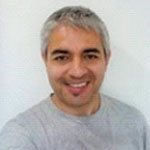 Vicente Luque Centeno
Profesor y Director TFG
Professor and FRP Director
Ingeniero Informático desde 1996 (UPM) y Doctor acreditado Ingeniero en Telecomunicación desde 2003 (UC3M), ha trabajado como investigador y como profesor de Universidad, impartiendo varias asignaturas en el ámbito de las TIC y tutorizando más de 30 proyectos de fin de carrera, trabajos de fin de grado y trabajos de fin de máster.
Vicente Luque Centeno
Profesor y Director TFG
Professor and FRP Director
Ingeniero Informático desde 1996 (UPM) y Doctor acreditado Ingeniero en Telecomunicación desde 2003 (UC3M), ha trabajado como investigador y como profesor de Universidad, impartiendo varias asignaturas en el ámbito de las TIC y tutorizando más de 30 proyectos de fin de carrera, trabajos de fin de grado y trabajos de fin de máster.Su ámbito de investigación está centrado en la ingeniería web, incluyendo aspectos de automatización de tareas, accesibilidad y la aplicación de las TIC al sector de la Educación.
vluque@nebrija.es
 Carlos Alberto Marchena Guiraldes
Profesor y Director TFG
Professor and FRP Director
Doctor en Psicología clínica y de la Salud, Licenciado en Psicología y Máster en Psicología de la Salud por la Universidad Autónoma de Madrid. Profesionalmente, ha ejercido la docencia en diferentes universidades: Universidad Autónoma de Madrid y Universidad Francisco de Vitoria relacionada en el campo de técnicas de intervención psicológica y de investigación en psicología. Cuenta con una dilatada experiencia profesional en centros de intervención psicológica con población infantil, adolescente y adulta.cmarchena@nebrija.es
Carlos Alberto Marchena Guiraldes
Profesor y Director TFG
Professor and FRP Director
Doctor en Psicología clínica y de la Salud, Licenciado en Psicología y Máster en Psicología de la Salud por la Universidad Autónoma de Madrid. Profesionalmente, ha ejercido la docencia en diferentes universidades: Universidad Autónoma de Madrid y Universidad Francisco de Vitoria relacionada en el campo de técnicas de intervención psicológica y de investigación en psicología. Cuenta con una dilatada experiencia profesional en centros de intervención psicológica con población infantil, adolescente y adulta.cmarchena@nebrija.es
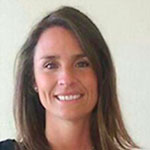 ANA MARÍN DE LA PLAZA
Profesor y Directora TFG
Professor and FRP Director
Licenciada en Psicología. Certificado de aptitud pedagógica (CAP). Experta en Terapia de Conducta Infanto-Juvenil. Lleva desarrollando su actividad profesional tanto en el ámbito infanto-juvenil como de adultos durante más de diez años. Ha sido investigadora en el Servicio de Enfermedades Infecciosas del Hospital Ramón y Cajal de Madrid con pacientes VIH/SIDA, tratando temas de tanto impacto psicosocial como efectos secundarios de fármacos en enfermedad crónica, estigmatización del paciente VIH, psicopatología asociada a enfermedad crónica y adherencia a tratamientos antirretrovirales. Actualmente compagina su trabajo como psicóloga en el Hospital Ramón y Cajal, con la docencia universitaria. Su actividad docente se ha centrado en el diseño e impartición de talleres, charlas y cursos para la prevención de los trastornos del comportamiento alimentario tanto en centros educativos de la Comunidad de Madrid como en Atención Primaria. Así mismo ha participado en diversos congresos como ponente y ha publicado artículos sobre psicología y VIH/SIDA, prevención de Trastornos de Alimentación y educación infantil.amarinp@nebrija.es
ANA MARÍN DE LA PLAZA
Profesor y Directora TFG
Professor and FRP Director
Licenciada en Psicología. Certificado de aptitud pedagógica (CAP). Experta en Terapia de Conducta Infanto-Juvenil. Lleva desarrollando su actividad profesional tanto en el ámbito infanto-juvenil como de adultos durante más de diez años. Ha sido investigadora en el Servicio de Enfermedades Infecciosas del Hospital Ramón y Cajal de Madrid con pacientes VIH/SIDA, tratando temas de tanto impacto psicosocial como efectos secundarios de fármacos en enfermedad crónica, estigmatización del paciente VIH, psicopatología asociada a enfermedad crónica y adherencia a tratamientos antirretrovirales. Actualmente compagina su trabajo como psicóloga en el Hospital Ramón y Cajal, con la docencia universitaria. Su actividad docente se ha centrado en el diseño e impartición de talleres, charlas y cursos para la prevención de los trastornos del comportamiento alimentario tanto en centros educativos de la Comunidad de Madrid como en Atención Primaria. Así mismo ha participado en diversos congresos como ponente y ha publicado artículos sobre psicología y VIH/SIDA, prevención de Trastornos de Alimentación y educación infantil.amarinp@nebrija.es
 Mª del Pilar Ester Mariñoso
Directora TFG
FRP Director
Doctora en Psicología. Especialista en Psicología evolutiva y en el desarrollo del pensamiento matemático en la primera infancia. Investigadora en la línea de didáctica de las matemáticas en pensamiento numérico y resolución de problemas. Autora de distintas publicaciones y presentaciones a congresos relacionados con la enseñanza de las matemáticas en Educación Infantil y Primaria, así como procesos cognitivos implicados en el aprendizaje de las mismas. Actualmente colaboradora de la Universidad de Arizona.mester@nebrija.es
Mª del Pilar Ester Mariñoso
Directora TFG
FRP Director
Doctora en Psicología. Especialista en Psicología evolutiva y en el desarrollo del pensamiento matemático en la primera infancia. Investigadora en la línea de didáctica de las matemáticas en pensamiento numérico y resolución de problemas. Autora de distintas publicaciones y presentaciones a congresos relacionados con la enseñanza de las matemáticas en Educación Infantil y Primaria, así como procesos cognitivos implicados en el aprendizaje de las mismas. Actualmente colaboradora de la Universidad de Arizona.mester@nebrija.es
 José Francisco Martín Alonso
Profesor y Director TFG
Professor and FRP Director
Doctor en Educación por la Universidad Pontificia de Comillas. Licenciado en Psicopedagogía y en Psicología, también ha cursado estudios de Filosofía y Teología. Ha trabajado como profesor en los grados de Educación infantil y Primaria en la Universidad Pontifica Comillas. Igualmente trabaja como Orientador Psicopedagógico en primaria y Bachillerato y como Coordinador de Bienestar y protección del menor. Profesor en el Grado de Educación Primaria en la Universidad Nebrija.
Investigador colaborador en el Grupo de Investigación EDUCOMPET (Grupo de Investigación sobre las competencias clave en el contexto escolar) de la Universidad Pontificia Comillas. Autor de distintas publicaciones y presentaciones en congresos relacionadas con la Competencia Personal, Social y de Aprender a Aprender. Otras líneas de investigación: Competencias docentes, Convivencia escolar.
jmartial@nebrija.es
José Francisco Martín Alonso
Profesor y Director TFG
Professor and FRP Director
Doctor en Educación por la Universidad Pontificia de Comillas. Licenciado en Psicopedagogía y en Psicología, también ha cursado estudios de Filosofía y Teología. Ha trabajado como profesor en los grados de Educación infantil y Primaria en la Universidad Pontifica Comillas. Igualmente trabaja como Orientador Psicopedagógico en primaria y Bachillerato y como Coordinador de Bienestar y protección del menor. Profesor en el Grado de Educación Primaria en la Universidad Nebrija.
Investigador colaborador en el Grupo de Investigación EDUCOMPET (Grupo de Investigación sobre las competencias clave en el contexto escolar) de la Universidad Pontificia Comillas. Autor de distintas publicaciones y presentaciones en congresos relacionadas con la Competencia Personal, Social y de Aprender a Aprender. Otras líneas de investigación: Competencias docentes, Convivencia escolar.
jmartial@nebrija.es
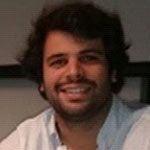 Alberto Martín Barrero
Profesor y Director TFG
Professor and FRP Director
Doctor en Ciencias de la Actividad Física y el Deporte por la Universidad de Huelva. Licenciado en Ciencias de la Actividad Física y el Deporte por la Universidad Pablo de Olavide. Máster en Master Universitario en Profesorado de Enseñanza Secundaria Obligatoria y Bachillerato, Formación Profesional y Enseñanza de Idiomas. Su línea de investigación se centra en los procesos de aprendizaje y enseñanza de la educación física y los deportes. Miembro del Grupo de Investigación HUM-954: Actividad física, promoción de valores y educación de la Universidad de Huelva. Autor de distintos artículos de investigación, libros, capítulos de libros y comunicaciones en congresos internacionales. Actualmente, docente en el Grado en Educación Primaria, en la Mención de Educación Física.
amartinba@nebrija.es
Alberto Martín Barrero
Profesor y Director TFG
Professor and FRP Director
Doctor en Ciencias de la Actividad Física y el Deporte por la Universidad de Huelva. Licenciado en Ciencias de la Actividad Física y el Deporte por la Universidad Pablo de Olavide. Máster en Master Universitario en Profesorado de Enseñanza Secundaria Obligatoria y Bachillerato, Formación Profesional y Enseñanza de Idiomas. Su línea de investigación se centra en los procesos de aprendizaje y enseñanza de la educación física y los deportes. Miembro del Grupo de Investigación HUM-954: Actividad física, promoción de valores y educación de la Universidad de Huelva. Autor de distintos artículos de investigación, libros, capítulos de libros y comunicaciones en congresos internacionales. Actualmente, docente en el Grado en Educación Primaria, en la Mención de Educación Física.
amartinba@nebrija.es
 Jorge Martín de Arriba
Profesor y Director TFG
Professor and FRP Director
Diplomado en Magisterio Especialidad Educación Primaria, Licenciado en Psicopedagogía y Máster oficial TIC en la educación, por la Universidad de Salamanca.
Jorge Martín de Arriba
Profesor y Director TFG
Professor and FRP Director
Diplomado en Magisterio Especialidad Educación Primaria, Licenciado en Psicopedagogía y Máster oficial TIC en la educación, por la Universidad de Salamanca.De su experiencia, destacan sus conocimientos en torno a la aplicación de las TIC en la educación, su formación sobre este campo, la docencia en distintas carreras universitarias, universidades y cursos on-line, así como en otros niveles, y su experiencia en la creación y virtualización de contenidos educativos.
Ha desarrollado su carrera profesional e investigadora principalmente en la Universidad de Salamanca, impartiendo docencia en los Grados de Educación Infantil y Primaria, Máster en Formación del Profesorado de Educación Secundaria, participando en diferentes investigaciones de ámbito nacional y publicando en varias revistas artículos científicos y capítulos de libros, todo ellos en el campo de las TIC en Educación.
Ha trabajado también en la Universidad Isabel I, y en otros centros educativos como escuelas de negocios y centros de formación de empleados y desempleados, donde ha podido crear materiales educativos digitales. jmartinar@nebrija.es
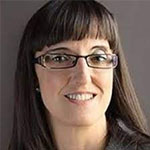 Susana Martín Leralta
Directora TFG
FRP Director
Doctora acreditada por la Universidad de Bielefeld (Alemania) y Licenciada en Ciencias de la Información por la Universidad Complutense de Madrid. Su tesis doctoral obtuvo el Premio de Investigación ASELE 2008. Ha coordinado el Master en Lingüística aplicada a la enseñanza de español como lengua extranjera en la Universidad Nebrija durante siete años, es profesora de postgrado de esta Universidad y colaboradora habitual de otras instituciones. Sus líneas de investigación son la competencia estratégica, la comprensión auditiva y la evaluación. Ha publicado el libro Competencia estratégica para la comprensión auditiva en español como lengua extranjera (2009), el material didáctico Todo oídos (2011) y su Guía didáctica (2012), y diversos artículos. smartinl@nebrija.es
Susana Martín Leralta
Directora TFG
FRP Director
Doctora acreditada por la Universidad de Bielefeld (Alemania) y Licenciada en Ciencias de la Información por la Universidad Complutense de Madrid. Su tesis doctoral obtuvo el Premio de Investigación ASELE 2008. Ha coordinado el Master en Lingüística aplicada a la enseñanza de español como lengua extranjera en la Universidad Nebrija durante siete años, es profesora de postgrado de esta Universidad y colaboradora habitual de otras instituciones. Sus líneas de investigación son la competencia estratégica, la comprensión auditiva y la evaluación. Ha publicado el libro Competencia estratégica para la comprensión auditiva en español como lengua extranjera (2009), el material didáctico Todo oídos (2011) y su Guía didáctica (2012), y diversos artículos. smartinl@nebrija.es
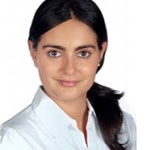 Isabel Martín Ruiz
Profesora y Directora TFG
Professor and FRP Director
Licenciada en Filología Hispánica y Doctora en la misma materia en la especialidad de Teoría de la Literatura y Literatura Comparada. Sus trabajos de investigación se han centrado principalmente en la Posmodernidad, el Español para Extranjeros y la Didáctica de la Lengua y la Literatura. Ha sido durante muchos años docente de Español para Extranjeros y Lengua y Literatura. Ha trabajado en dos universidades: Camilo José Cela y MIUC. También ha trabajado en otros centros,con diferentes niveles y todo tipo de alumnos. Estuvo dos años practicando Home schooling en un barco dando la vuelta al mundo. También ha trabajado como programadora en festivales de cine español y ha comisariado varias muestras artísticas y cinematográficas. Actualmente colabora con el festival Márgenes en su seminario sobre imagen contemporánea.
imartin@nebrija.es
Isabel Martín Ruiz
Profesora y Directora TFG
Professor and FRP Director
Licenciada en Filología Hispánica y Doctora en la misma materia en la especialidad de Teoría de la Literatura y Literatura Comparada. Sus trabajos de investigación se han centrado principalmente en la Posmodernidad, el Español para Extranjeros y la Didáctica de la Lengua y la Literatura. Ha sido durante muchos años docente de Español para Extranjeros y Lengua y Literatura. Ha trabajado en dos universidades: Camilo José Cela y MIUC. También ha trabajado en otros centros,con diferentes niveles y todo tipo de alumnos. Estuvo dos años practicando Home schooling en un barco dando la vuelta al mundo. También ha trabajado como programadora en festivales de cine español y ha comisariado varias muestras artísticas y cinematográficas. Actualmente colabora con el festival Márgenes en su seminario sobre imagen contemporánea.
imartin@nebrija.es
 Daniel Martín Vertedor
Profesor y Director de TFG
Professor and FRP Director
Doctor en Ciencias Biológicas y funcionario de la Junta de Extremadura. Autor y revisor de numerosos artículos científicos, libros y capítulos, así como director de tesis doctorales y trabajos de grado y máster. Docente en cursos y seminarios de educación primaria y secundaria, coordina proyectos de investigación y gestiona iniciativas innovadoras en plataformas online. Profesor en la Universidad Politécnica della Marche (Italia) y la Universidad Politécnica de Braganza (Portugal). Ha participado en congresos y comités científicos internacionales. Es evaluador de proyectos de I+D en la Universidad de la República de Uruguay y experto para la Comisión Europea en el programa Horizonte 2020. Actualmente preside el Grupo de Olivicultura de la Sociedad Española de Ciencias Hortícolas, es “Académico Correspondente” en la Accademia Nazionale dell’Olivo e dell’Olio (Italia) y miembro del grupo de investigación en Calidad y Microbiología de los Alimentos de la Universidad de Extremadura. Apasionado por la familia, la naturaleza y la investigación, su curiosidad y dedicación han impulsado su labor en el ámbito científico y natural de Extremadura.
dmartive@nebrija.es
Daniel Martín Vertedor
Profesor y Director de TFG
Professor and FRP Director
Doctor en Ciencias Biológicas y funcionario de la Junta de Extremadura. Autor y revisor de numerosos artículos científicos, libros y capítulos, así como director de tesis doctorales y trabajos de grado y máster. Docente en cursos y seminarios de educación primaria y secundaria, coordina proyectos de investigación y gestiona iniciativas innovadoras en plataformas online. Profesor en la Universidad Politécnica della Marche (Italia) y la Universidad Politécnica de Braganza (Portugal). Ha participado en congresos y comités científicos internacionales. Es evaluador de proyectos de I+D en la Universidad de la República de Uruguay y experto para la Comisión Europea en el programa Horizonte 2020. Actualmente preside el Grupo de Olivicultura de la Sociedad Española de Ciencias Hortícolas, es “Académico Correspondente” en la Accademia Nazionale dell’Olivo e dell’Olio (Italia) y miembro del grupo de investigación en Calidad y Microbiología de los Alimentos de la Universidad de Extremadura. Apasionado por la familia, la naturaleza y la investigación, su curiosidad y dedicación han impulsado su labor en el ámbito científico y natural de Extremadura.
dmartive@nebrija.es
 Estibaliz Martínez Mora
Profesora y Directora TFG
Professor and FRP Director
Licenciada en Pedagogía por la Universidad Complutense de Madrid, inicia su mundo laboral en un Colegio Concertado, sus funciones eran apoyo Pedagógico a niños con TEA, impartir Curso de Habilidades Sociales y orientación laboral. Además, ha completado su formación con cursos de logopedia, de inteligencia emocional, un curso sobre comunicación eficaz y titulada en pericia caligráfica y documentos copia por IpsigraP. Desde el 2014 hasta hoy, es preparadora de oposiciones en Magister, impartiendo clases presenciales y por videoconferencia de Programación de las tres etapas educativas, de Temas y Prácticos de Primaria y sobre legislación y colaboro elaborando materiales educativos y legislativos.
emartinezmo@nebrija.es
Estibaliz Martínez Mora
Profesora y Directora TFG
Professor and FRP Director
Licenciada en Pedagogía por la Universidad Complutense de Madrid, inicia su mundo laboral en un Colegio Concertado, sus funciones eran apoyo Pedagógico a niños con TEA, impartir Curso de Habilidades Sociales y orientación laboral. Además, ha completado su formación con cursos de logopedia, de inteligencia emocional, un curso sobre comunicación eficaz y titulada en pericia caligráfica y documentos copia por IpsigraP. Desde el 2014 hasta hoy, es preparadora de oposiciones en Magister, impartiendo clases presenciales y por videoconferencia de Programación de las tres etapas educativas, de Temas y Prácticos de Primaria y sobre legislación y colaboro elaborando materiales educativos y legislativos.
emartinezmo@nebrija.es
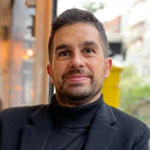 Isaac Martínez Pons
Profesor y Director TFG
Professor and FRP Director
Graduado en Educación Primaria con Mención en Educación Inclusiva por la UAM. Posee también un Máster Universitario en Educación y TIC por la UOC.
Actualmente ejerce su carrera profesional dentro de la Fundación PRODIS, como coordinador del Programa Empresa: Máster adaptado para personas con Discapacidad Intelectual y como profesor de Conectados (primer curso online dirigido a personas con D.I para la adquisición de competencias digitales), de Mundo Digital (formación permanente para personas con Discapacidad Intelectual) y como profesor del programa preuniversitario AVANZAS. Participación en equipo interdisciplinario europeo en proyectos Moonclimbers y B4 Project. Por último, colabora como profesor adjunto de la asignatura de Las Necesidades Educativas en el Aula, Atención Temprana del grado de educación infantil y en la asignatura de TIC en educación en el grado de educación primaria en la Universidad Antonio de Nebrija.
imartinezp@nebrija.es
Isaac Martínez Pons
Profesor y Director TFG
Professor and FRP Director
Graduado en Educación Primaria con Mención en Educación Inclusiva por la UAM. Posee también un Máster Universitario en Educación y TIC por la UOC.
Actualmente ejerce su carrera profesional dentro de la Fundación PRODIS, como coordinador del Programa Empresa: Máster adaptado para personas con Discapacidad Intelectual y como profesor de Conectados (primer curso online dirigido a personas con D.I para la adquisición de competencias digitales), de Mundo Digital (formación permanente para personas con Discapacidad Intelectual) y como profesor del programa preuniversitario AVANZAS. Participación en equipo interdisciplinario europeo en proyectos Moonclimbers y B4 Project. Por último, colabora como profesor adjunto de la asignatura de Las Necesidades Educativas en el Aula, Atención Temprana del grado de educación infantil y en la asignatura de TIC en educación en el grado de educación primaria en la Universidad Antonio de Nebrija.
imartinezp@nebrija.es
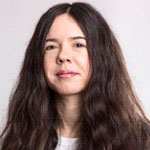 Eirini Mavrou
Directora TFG
FRP Director
Miembro del Grupo de Investigación de Lingüística Aplicada a la Enseñanza de Lenguas Extranjeras y del Centro de Ciencia Cognitiva (C3) ha publicado una investigación en Journal of Second Language Writing (JCR: Q1 en Linguistics, CIRC: A+ en Ciencias Sociales). El artículo titulado Working memory, executive functions, and emotional intelligence in second language writing se enmarca en el Proyecto “Emoción, memoria, identidad lingüística y aculturación emocional: Su influencia en el aprendizaje de español como lengua de migración (EMILIA)” (Ref. FFI2017-83166-C2-2-R, Convocatoria 2017 Proyectos de I+D+i, del Programa Estatal de Investigación, Desarrollo e Innovación Orientada a los Retos de la Sociedad).
emavrou@nebrija.es
Eirini Mavrou
Directora TFG
FRP Director
Miembro del Grupo de Investigación de Lingüística Aplicada a la Enseñanza de Lenguas Extranjeras y del Centro de Ciencia Cognitiva (C3) ha publicado una investigación en Journal of Second Language Writing (JCR: Q1 en Linguistics, CIRC: A+ en Ciencias Sociales). El artículo titulado Working memory, executive functions, and emotional intelligence in second language writing se enmarca en el Proyecto “Emoción, memoria, identidad lingüística y aculturación emocional: Su influencia en el aprendizaje de español como lengua de migración (EMILIA)” (Ref. FFI2017-83166-C2-2-R, Convocatoria 2017 Proyectos de I+D+i, del Programa Estatal de Investigación, Desarrollo e Innovación Orientada a los Retos de la Sociedad).
emavrou@nebrija.es
 David Méndez Coca
Profesor y Director TFG
Professor and FRP Director
Doctor en ciencias de la educación por la UCM. Licenciado en Ingeniería electrónica (UCM). Profesor del Departamento de Educación, Facultad de Lenguas y Educación. Profesor en didáctica de ciencias experimentales y matemáticas. Acreditado por ANECA como profesor titular. Un sexenio de investigación reconocido. Premio extraordinario de doctorado. Estancia en Harvard, MIT y UCLA. Autor de más de veinte artículos en revistas internacionales, diez artículos en revistas indexadas en el Journal Citation Reports. Ha realizado más de veinte comunicaciones en congresos internacionales. Investigador Principal en varios proyectos de investigación en educación de ciencias y matemáticas.
dmendez@nebrija.es
David Méndez Coca
Profesor y Director TFG
Professor and FRP Director
Doctor en ciencias de la educación por la UCM. Licenciado en Ingeniería electrónica (UCM). Profesor del Departamento de Educación, Facultad de Lenguas y Educación. Profesor en didáctica de ciencias experimentales y matemáticas. Acreditado por ANECA como profesor titular. Un sexenio de investigación reconocido. Premio extraordinario de doctorado. Estancia en Harvard, MIT y UCLA. Autor de más de veinte artículos en revistas internacionales, diez artículos en revistas indexadas en el Journal Citation Reports. Ha realizado más de veinte comunicaciones en congresos internacionales. Investigador Principal en varios proyectos de investigación en educación de ciencias y matemáticas.
dmendez@nebrija.es
 Mónica Méndez de la Calle
Directora TFG
FRP Director
Doctora en Pedagogía por la Universidad Complutense de Madrid.
Mónica Méndez de la Calle
Directora TFG
FRP Director
Doctora en Pedagogía por la Universidad Complutense de Madrid.
Profesora en Universidad Nebrija en el Grado en Educación Infantil y en el Máster de Formación del Profesorado. Ha trabajado como docente y Coordinadora de Practicum en otras instituciones, como la Universidad Complutense de Madrid. Ha participado en diferentes proyectos de investigación financiados en colaboración con la Universidad Complutense de Madrid, en distintas temáticas relacionadas con la inclusión del alumnado con discapacidad y el valor añadido en educación y la producción educativa. Ha participado en diferentes congresos nacionales e internacionales y cuenta con una amplia experiencia en el área de intervención educativa, habiendo trabajado a su vez como Formadora de docentes y adolescentes. mmendez@nebrija.es
 José Alberto Monseco Gómez
Profesor y Director TFG
Professor and FRP Director
Licenciado en Psicología por la Universidad Autónoma de Madrid. Máster en Terapia ABA con niños con TEA y otros trastornos del desarrollo. Analista de conducta certificado por la Behavior Analyst Certification Board (BACB®) y por la International Behavior Analysis Organization (IBAO®). Director Académico de Abascool. Codirector, docente y director de TFM en el Máster en Análisis de Conducta Aplicado e Intervención Educativa (UCM-Abascool) y Coordinador y docente de otros cursos presenciales y on line sobre análisis de conducta y trastornos del desarrollo. Director Técnico de Dabadá (centro de atención temprana e infanto juvenil).
Autor de distintas publicaciones y presentaciones en congresos y jornadas relacionados con la educación con alumnos con necesidades educativas especiales, desarrollo del lenguaje y modificación de conducta.
jmonseco@nebrija.es
José Alberto Monseco Gómez
Profesor y Director TFG
Professor and FRP Director
Licenciado en Psicología por la Universidad Autónoma de Madrid. Máster en Terapia ABA con niños con TEA y otros trastornos del desarrollo. Analista de conducta certificado por la Behavior Analyst Certification Board (BACB®) y por la International Behavior Analysis Organization (IBAO®). Director Académico de Abascool. Codirector, docente y director de TFM en el Máster en Análisis de Conducta Aplicado e Intervención Educativa (UCM-Abascool) y Coordinador y docente de otros cursos presenciales y on line sobre análisis de conducta y trastornos del desarrollo. Director Técnico de Dabadá (centro de atención temprana e infanto juvenil).
Autor de distintas publicaciones y presentaciones en congresos y jornadas relacionados con la educación con alumnos con necesidades educativas especiales, desarrollo del lenguaje y modificación de conducta.
jmonseco@nebrija.es
 Elena Muñoz Abad
Profesora y Directora TFG
Professor and FRP Director
Graduada como Maestra de Educación Infantil por la Universidad Complutense de Madrid.
Con amplia trayectoria en el ámbito educativo, lleva más de diez años dedicados a la educación, con experiencia que abarca desde el primer y segundo ciclo de Infantil, pasando por la realización de cursos vinculados al Ministerio de Agricultura, Pesca, Alimentación y Medio Ambiente, impartiendo sesiones formativas teórico-prácticas en Colegios de Educación Primaria y Secundaria, y actualmente colaboradora en diferentes Universidades desde el curso 2018/ 2019.
emunozab@nebrija.es
Elena Muñoz Abad
Profesora y Directora TFG
Professor and FRP Director
Graduada como Maestra de Educación Infantil por la Universidad Complutense de Madrid.
Con amplia trayectoria en el ámbito educativo, lleva más de diez años dedicados a la educación, con experiencia que abarca desde el primer y segundo ciclo de Infantil, pasando por la realización de cursos vinculados al Ministerio de Agricultura, Pesca, Alimentación y Medio Ambiente, impartiendo sesiones formativas teórico-prácticas en Colegios de Educación Primaria y Secundaria, y actualmente colaboradora en diferentes Universidades desde el curso 2018/ 2019.
emunozab@nebrija.es
 Roberto Muñoz Bolaños
Profesor y Director TFG
Professor and FRP Director
Doctor en Historia Contemporánea. Algunas de sus publicaciones: La didáctica del descubrimiento y el conocimiento del medio natural y social en Infantil y Primaria, 2008; La competencia humanística: la competencia social y ciudadana en Educación Infantil, Primaria y Secundaria, 2010; La competencia cultural y artística en Educación Infantil, Primaria y Secundaria, 2010. rmunoz@nebrija.es
Roberto Muñoz Bolaños
Profesor y Director TFG
Professor and FRP Director
Doctor en Historia Contemporánea. Algunas de sus publicaciones: La didáctica del descubrimiento y el conocimiento del medio natural y social en Infantil y Primaria, 2008; La competencia humanística: la competencia social y ciudadana en Educación Infantil, Primaria y Secundaria, 2010; La competencia cultural y artística en Educación Infantil, Primaria y Secundaria, 2010. rmunoz@nebrija.es
 Patricia Muñoz Cañizares
Directora TFG
FRP Director
Graduada en Educación Primaria por la Universidad de Salamanca, con menciones en Inglés y Educación Física. Su trayectoria profesional está estrechamente vinculada al ámbito educativo, especialmente en la enseñanza del inglés como lengua extranjera, con experiencia en aulas de las etapas de Educación Infantil y Primaria.
Patricia Muñoz Cañizares
Directora TFG
FRP Director
Graduada en Educación Primaria por la Universidad de Salamanca, con menciones en Inglés y Educación Física. Su trayectoria profesional está estrechamente vinculada al ámbito educativo, especialmente en la enseñanza del inglés como lengua extranjera, con experiencia en aulas de las etapas de Educación Infantil y Primaria.
Comprometida con la formación continua, ha ampliado su perfil con cursos sobre prevención y mediación de conflictos en el aula, así como sobre enseñanza bilingüe en distintas etapas educativas. Ha colaborado como tutora de Practicum y directora de Trabajos de Fin de Grado y Fin de Máster en diversas universidades a nivel nacional.
Actualmente, desarrolla su labor profesional como especialista en orientación educativa y profesional en un centro de formación docente. pmunozca@nebrija.es
 Antonio Muñoz del Viejo
Profesor y Director TFG
Professor and FRP Director
Doctor en Ciencias (Biología) por la UNEx y acreditado por ANECA y ACAP como profesor contratado doctor y de universidad privada. Profesor de ESO y Bachillerato en materias de Ciencias y Matemáticas, profesor de Grado y Máster y director de tesis doctorales, TFG y TFM en universidades públicas y privadas. Coordinador del Dpto. de Matemáticas y del Equipo de Calidad de un centro de Educación Secundaria. Amplia experiencia en gestión académica universitaria (Secretario de Facultad y de Departamento), así como en la coordinación y ejecución de proyectos de investigación sobre Gestión y Conservación de Recursos Faunísticos. Estancias de investigación e intercambios docentes en diversas instituciones de educación iberoamericanas, publicación de artículos científicos, libros y capítulos de libros y participación en congresos nacionales e internacionales.
Antonio Muñoz del Viejo
Profesor y Director TFG
Professor and FRP Director
Doctor en Ciencias (Biología) por la UNEx y acreditado por ANECA y ACAP como profesor contratado doctor y de universidad privada. Profesor de ESO y Bachillerato en materias de Ciencias y Matemáticas, profesor de Grado y Máster y director de tesis doctorales, TFG y TFM en universidades públicas y privadas. Coordinador del Dpto. de Matemáticas y del Equipo de Calidad de un centro de Educación Secundaria. Amplia experiencia en gestión académica universitaria (Secretario de Facultad y de Departamento), así como en la coordinación y ejecución de proyectos de investigación sobre Gestión y Conservación de Recursos Faunísticos. Estancias de investigación e intercambios docentes en diversas instituciones de educación iberoamericanas, publicación de artículos científicos, libros y capítulos de libros y participación en congresos nacionales e internacionales. amunozvi@nebrija.es
 Marilena Muratori
Profesora y Directora TFG
Professor and FRP Director
Doctora en Educación por la UCM. Licenciada en Ciencias de la Educación (Universidad de Bolonia - Italia). Profesora en el Máster Universitario en Formación del Profesorado de ESO y Bachillerato, FP y Enseñanza de Idiomas. Autora de distintas publicaciones científicas y presentaciones en congresos nacionales e internacionales relacionadas con las artes aplicadas a la educación. Miembro del grupo de investigación MCE (Movimento di Cooperazione Educativa). Otras líneas de investigación: Metodologías activas y Educación intercultural.
Marilena Muratori
Profesora y Directora TFG
Professor and FRP Director
Doctora en Educación por la UCM. Licenciada en Ciencias de la Educación (Universidad de Bolonia - Italia). Profesora en el Máster Universitario en Formación del Profesorado de ESO y Bachillerato, FP y Enseñanza de Idiomas. Autora de distintas publicaciones científicas y presentaciones en congresos nacionales e internacionales relacionadas con las artes aplicadas a la educación. Miembro del grupo de investigación MCE (Movimento di Cooperazione Educativa). Otras líneas de investigación: Metodologías activas y Educación intercultural.
mmurator@nebrija.es
 Gabriel Neila González
Profesor y Director TFG
Professor and FRP Director
Doctor en Educación por la Universidad Internacional de la Rioja, Máster Oficial en Lingüística Aplicada a la Enseñanza de ELE por la Universidad de Jaén, BA in Applied Modern Languages por la University of Northumbria at Newcastle (Reino Unido) y Licenciado en Filología Inglesa por la Universidad de Alcalá. Su ámbito de especialización es la aplicación del Flipped Classroom en el aula de lenguas extranjeras. Ha trabajado como lector en la Universidad de Thammasat (Tailandia) dentro del programa MAEC-AECID. En la actualidad es profesor de ELE en diversas instituciones, profesor en la Universidad Nebrija y asesor pedagógico en la editorial Edinumen. Ha realizado múltiples materiales didácticos para diversas editoriales.
Gabriel Neila González
Profesor y Director TFG
Professor and FRP Director
Doctor en Educación por la Universidad Internacional de la Rioja, Máster Oficial en Lingüística Aplicada a la Enseñanza de ELE por la Universidad de Jaén, BA in Applied Modern Languages por la University of Northumbria at Newcastle (Reino Unido) y Licenciado en Filología Inglesa por la Universidad de Alcalá. Su ámbito de especialización es la aplicación del Flipped Classroom en el aula de lenguas extranjeras. Ha trabajado como lector en la Universidad de Thammasat (Tailandia) dentro del programa MAEC-AECID. En la actualidad es profesor de ELE en diversas instituciones, profesor en la Universidad Nebrija y asesor pedagógico en la editorial Edinumen. Ha realizado múltiples materiales didácticos para diversas editoriales.gneila@nebrija.es
 Verónica Núñez Ossorio
Directora TFG
FRP Director
Doctora en Educación por la Universidad Complutense de Madrid (UCM), con Máster en Pedagogía por la misma universidad y Grado en Educación Especial por el CES Don Bosco. Profesora de grado y máster en CES Don Bosco, donde imparte docencia en materias relacionadas con la Neuroeducación y la Neurodidáctica, especialmente centradas en el impacto de las emociones en el aprendizaje. Actualmente es docente de los Gurdos en Educación de la Universidad Nebrija. Ha participado como autora en diversas publicaciones científicas y ponente en congresos nacionales e internacionales sobre Neurociencia y Educación, con un enfoque especial en el papel de las emociones. Es miembro del grupo de investigación del Dr. Prof. Ortiz (Facultad de Medicina, UCM) y del centro de investigación BCBL (Basque Center on Cognition, Brain and Language).
vnunezo@nebrija.es
Verónica Núñez Ossorio
Directora TFG
FRP Director
Doctora en Educación por la Universidad Complutense de Madrid (UCM), con Máster en Pedagogía por la misma universidad y Grado en Educación Especial por el CES Don Bosco. Profesora de grado y máster en CES Don Bosco, donde imparte docencia en materias relacionadas con la Neuroeducación y la Neurodidáctica, especialmente centradas en el impacto de las emociones en el aprendizaje. Actualmente es docente de los Gurdos en Educación de la Universidad Nebrija. Ha participado como autora en diversas publicaciones científicas y ponente en congresos nacionales e internacionales sobre Neurociencia y Educación, con un enfoque especial en el papel de las emociones. Es miembro del grupo de investigación del Dr. Prof. Ortiz (Facultad de Medicina, UCM) y del centro de investigación BCBL (Basque Center on Cognition, Brain and Language).
vnunezo@nebrija.es
 Francisco Javier Otero García
Profesor y Director TFG
Professor and FRP Director
Doctor en Estudios Teatrales en la Universidad Complutense de Madrid. Máster en Literaturas Hispánicas por la Universidad Autónoma de Madrid y Graduado en Artes Escénicas por la Universidad Antonio de Nebrija. Tras haberse formado con dramaturgos de gran relevancia como Juan Mayorga, Guillermo Heras, Marco Antonio de la Parra y Dirk Laucke, en la actualidad compagina profesionalmente la Dramaturgia con actividades de otros ámbitos, como el de las editoriales, la coordinación deeventos culturales y la Psicopedagogía. Autor polígrafo, entre sus obras destacan: Puerta entre dos aguas, Fiesta real. Basura de banquete, Una ópera sin Groucho, Maritrudis e Informe parala Academia, entre otras. Francisco Javier Otero es dramaturgo, asistente de dirección y actor de la compañía El Duende. jotero@nebrija.es
Francisco Javier Otero García
Profesor y Director TFG
Professor and FRP Director
Doctor en Estudios Teatrales en la Universidad Complutense de Madrid. Máster en Literaturas Hispánicas por la Universidad Autónoma de Madrid y Graduado en Artes Escénicas por la Universidad Antonio de Nebrija. Tras haberse formado con dramaturgos de gran relevancia como Juan Mayorga, Guillermo Heras, Marco Antonio de la Parra y Dirk Laucke, en la actualidad compagina profesionalmente la Dramaturgia con actividades de otros ámbitos, como el de las editoriales, la coordinación deeventos culturales y la Psicopedagogía. Autor polígrafo, entre sus obras destacan: Puerta entre dos aguas, Fiesta real. Basura de banquete, Una ópera sin Groucho, Maritrudis e Informe parala Academia, entre otras. Francisco Javier Otero es dramaturgo, asistente de dirección y actor de la compañía El Duende. jotero@nebrija.es
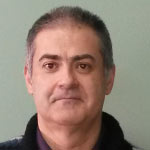 Antonio Palacios Cibrián
Profesor y Director TFG
Professor and FRP Director
Licenciado y Doctor en Psicología por la UAM, con título de especialización didáctica y acreditado como Profesor de Universidad Privada por la ANECA.
Cuenta con Múltiples publicaciones en libros y revistas internacionales en las áreas de la Psicología, la ciencia de la Educación y la Fisioterapia.
Ejerce como profesor de secundaria en el área de Filosofía. Además, ha colaborado como profesor asociado de la Facultad de ciencias de la Salud de la UEM y del Departamento de Psicología de la UNIR. Actualmente, es profesor asociado del Departamento de Educación de la Universidad Nebrija.
apalacios@nebrija.es
Antonio Palacios Cibrián
Profesor y Director TFG
Professor and FRP Director
Licenciado y Doctor en Psicología por la UAM, con título de especialización didáctica y acreditado como Profesor de Universidad Privada por la ANECA.
Cuenta con Múltiples publicaciones en libros y revistas internacionales en las áreas de la Psicología, la ciencia de la Educación y la Fisioterapia.
Ejerce como profesor de secundaria en el área de Filosofía. Además, ha colaborado como profesor asociado de la Facultad de ciencias de la Salud de la UEM y del Departamento de Psicología de la UNIR. Actualmente, es profesor asociado del Departamento de Educación de la Universidad Nebrija.
apalacios@nebrija.es
 Ivana Palibrk
Profesora y Directora TFG
Professor and FRP Director
Doctora en Estudios Literarios por la UCM. Ha compaginado la docencia en la Universidad de Burgos con la docencia y la labor de dirección y coordinación pedagógica en varios centros de idiomas. Ha trabajado como traductora e intérprete de inglés, español y serbio, como coach de idiomas para montajes teatrales y actualmente es traductora del Programa CELA, apoyado por la EACWP. Entre las obras que ha traducido se encuentran monografías de autoras como Gerda Lerner o Michele Wallace. Ha publicado diversos artículos en revistas científicas. Actualmente, docente en la Facultad de Lenguas y Educación de la Universidad Nebrija y colaboradora en el Máster Universitario en Formación del Profesorado de Educación Secundaria en la UDIMA.
ipalibrk@nebrija.es
Ivana Palibrk
Profesora y Directora TFG
Professor and FRP Director
Doctora en Estudios Literarios por la UCM. Ha compaginado la docencia en la Universidad de Burgos con la docencia y la labor de dirección y coordinación pedagógica en varios centros de idiomas. Ha trabajado como traductora e intérprete de inglés, español y serbio, como coach de idiomas para montajes teatrales y actualmente es traductora del Programa CELA, apoyado por la EACWP. Entre las obras que ha traducido se encuentran monografías de autoras como Gerda Lerner o Michele Wallace. Ha publicado diversos artículos en revistas científicas. Actualmente, docente en la Facultad de Lenguas y Educación de la Universidad Nebrija y colaboradora en el Máster Universitario en Formación del Profesorado de Educación Secundaria en la UDIMA.
ipalibrk@nebrija.es
 Irene Parra Lara
Profesora y Directora TFG
Professor and FRP Director
DGraduada en Educación Infantil y en Educación Primaria. Máster Universitario en Enseñanza del Español como Lengua Extranjera. Su experiencia laboral se ha desarrollado principalmente en el ámbito de la Educación Infantil. Desde 2017, es tutora de Practicum para futuros maestros de Infantil. Además, ha dirigido diversos Trabajo Fin de Grado y participado en Tribunales de evaluación bajo el rol de secretaria.
iparra@nebrija.es
Irene Parra Lara
Profesora y Directora TFG
Professor and FRP Director
DGraduada en Educación Infantil y en Educación Primaria. Máster Universitario en Enseñanza del Español como Lengua Extranjera. Su experiencia laboral se ha desarrollado principalmente en el ámbito de la Educación Infantil. Desde 2017, es tutora de Practicum para futuros maestros de Infantil. Además, ha dirigido diversos Trabajo Fin de Grado y participado en Tribunales de evaluación bajo el rol de secretaria.
iparra@nebrija.es
 Katarzyna Barbara Parys
Profesora y Directora TFG
Professor and FRP Director
Doctora en Estudios Artísticos, Literarios y de la Cultura por la Universidad Autónoma de Madrid y en Estudios Literarios por la Universidad de Varsovia (Tesis doctoral: El problema ontológico de los personajes literarios en la narrativa breve de Miguel de Unamuno. 2022). Graduada en Estudios Ibéricos (TFG: El lector modelo en “Ferdydurke” de Witold Gombrowicz y en su traducción al castellano: un análisis comparativo. 2013) y en Warsaw International Studies in Philosophy (TFG: Miguel de Unamuno's theories of fictional characters: a critical overview. 2020), Máster en Filología Ibérica (TFM: El panorama de la metaficción en la literatura española: Cervantes, Unamuno y Muñoz Molina. 2015), todos por la Universidad de Varsovia. Máster en Formación de Profesorado en Educación Secundaria Obligatoria y Bachillerato. Filosofía por la Universidad Autónoma de Madrid (TFM: Filosofía española en Bachillerato: una propuesta para la inclusión del pensamiento filosófico de Miguel de Unamuno en el aula. 2022). Estancias: CEEPUS en Karl-FranzensUniversität Graz (2020), Erasmus: Universidad Autónoma de Madrid (2014/2015), Universidad de Sevilla (2017), Universidade Aberta de Portugal (2017/2018), Universidad Complutense de Madrid (2018/2019). Autora de distintas publicaciones y presentaciones en congresos relacionadas con estudios literarios y didáctica de lenguas extranjeras. Profesora de grado en la Facultad de Lenguas y Educación. Miembro de Philobiblion Asociación de Jóvenes Hispanistas y Madrid Philosophy Network. Otras líneas de investigación: Teoría literaria, Filosofía, Didáctica de lenguas extranjeras.
kparys@nebrija.es
Katarzyna Barbara Parys
Profesora y Directora TFG
Professor and FRP Director
Doctora en Estudios Artísticos, Literarios y de la Cultura por la Universidad Autónoma de Madrid y en Estudios Literarios por la Universidad de Varsovia (Tesis doctoral: El problema ontológico de los personajes literarios en la narrativa breve de Miguel de Unamuno. 2022). Graduada en Estudios Ibéricos (TFG: El lector modelo en “Ferdydurke” de Witold Gombrowicz y en su traducción al castellano: un análisis comparativo. 2013) y en Warsaw International Studies in Philosophy (TFG: Miguel de Unamuno's theories of fictional characters: a critical overview. 2020), Máster en Filología Ibérica (TFM: El panorama de la metaficción en la literatura española: Cervantes, Unamuno y Muñoz Molina. 2015), todos por la Universidad de Varsovia. Máster en Formación de Profesorado en Educación Secundaria Obligatoria y Bachillerato. Filosofía por la Universidad Autónoma de Madrid (TFM: Filosofía española en Bachillerato: una propuesta para la inclusión del pensamiento filosófico de Miguel de Unamuno en el aula. 2022). Estancias: CEEPUS en Karl-FranzensUniversität Graz (2020), Erasmus: Universidad Autónoma de Madrid (2014/2015), Universidad de Sevilla (2017), Universidade Aberta de Portugal (2017/2018), Universidad Complutense de Madrid (2018/2019). Autora de distintas publicaciones y presentaciones en congresos relacionadas con estudios literarios y didáctica de lenguas extranjeras. Profesora de grado en la Facultad de Lenguas y Educación. Miembro de Philobiblion Asociación de Jóvenes Hispanistas y Madrid Philosophy Network. Otras líneas de investigación: Teoría literaria, Filosofía, Didáctica de lenguas extranjeras.
kparys@nebrija.es
 Manuela Pedregal Valle
Profesora y Directora TFG
Professor and FRP Director
Doctora en Ciencias de la Educación por la Universidad Autónoma de Madrid. Máster de Formación de Profesorado en Educación Secundaria por la Universidad Alfonso X el Sabio. Licenciada en Ciencias Geológicas por la Universidad Complutense de Madrid con especialidad en Paleontología. Su línea de investigación se centra en la Pedagogía de la muerte en el contexto educativo. Miembro del Grupo de Investigación P.F.C. (Pedagogía, Formación y Conciencia) de la Universidad Autónoma de Madrid. Ha sido investigadora en Proyectos i+D+I (Ministerio de Ciencia, Economía y Competitividad de España). Autora de diversos trabajos y presentaciones en congresos y seminarios, ha combinado su faceta investigadora con la docencia en la etapa de Educación Secundaria y Bachillerato. Actualmente es profesora en los Grados de Educación Infantil y Primaria y Coordinadora académica de Prácticum en el Máster de Formación de Profesorado.
mpedregal@nebrija.es
Manuela Pedregal Valle
Profesora y Directora TFG
Professor and FRP Director
Doctora en Ciencias de la Educación por la Universidad Autónoma de Madrid. Máster de Formación de Profesorado en Educación Secundaria por la Universidad Alfonso X el Sabio. Licenciada en Ciencias Geológicas por la Universidad Complutense de Madrid con especialidad en Paleontología. Su línea de investigación se centra en la Pedagogía de la muerte en el contexto educativo. Miembro del Grupo de Investigación P.F.C. (Pedagogía, Formación y Conciencia) de la Universidad Autónoma de Madrid. Ha sido investigadora en Proyectos i+D+I (Ministerio de Ciencia, Economía y Competitividad de España). Autora de diversos trabajos y presentaciones en congresos y seminarios, ha combinado su faceta investigadora con la docencia en la etapa de Educación Secundaria y Bachillerato. Actualmente es profesora en los Grados de Educación Infantil y Primaria y Coordinadora académica de Prácticum en el Máster de Formación de Profesorado.
mpedregal@nebrija.es
 Beltrán Pérez Márquez
Profesor
Professor
Licenciado en Ciencias Políticas y de la Administración por la UCM. Máster en Historia y Antropología (UCM).
Coordinador de la Escuela Nacional de Gráfica Popular. Ha realizado trabajos etnográficos en Venezuela, Colombia, Chile y Bolivia. Autor de distintos artículos y publicaciones en congresos internacionales relacionados con antropología y educación.
bperez@nebrija.es
Beltrán Pérez Márquez
Profesor
Professor
Licenciado en Ciencias Políticas y de la Administración por la UCM. Máster en Historia y Antropología (UCM).
Coordinador de la Escuela Nacional de Gráfica Popular. Ha realizado trabajos etnográficos en Venezuela, Colombia, Chile y Bolivia. Autor de distintos artículos y publicaciones en congresos internacionales relacionados con antropología y educación.
bperez@nebrija.es
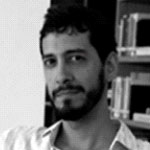 Javier Pérez Martínez
Profesor y Director TFG
Professor and FRP Director
Es profesor e investigador acreditado por la ANECA. Doctor en Estudios Artísticos, Literarios y de la Cultura por la Universidad Autónoma de Madrid; Máster en Estudios Contemporáneos de América Latina (UCM) y Licenciado en Periodismo. Dedicó su tesis a estudiar la evolución de la lírica popular campesina de la costa del Ecuador. Ha publicado varios artículos y estudios en revistas indexadas. Cuenta con la edición del libro: Versos de amor y sátira en el Amorfino. Estudio y clasificación de la copla montubia (2021). Ha ejercido el periodismo como reportero, cronista y redactor de medios en España y Ecuador. En 2020 publicó con el Ángel Editor el poemario Sombra, pálpito y salitre. Actualmente dicta clases en de Literatura en el grado de Educación Primaria en la Universidad Antonio de Nebrija y dirige tesis del Máster Didáctica de la Lengua de la UNIR.
jperezmar@nebrija.es
Javier Pérez Martínez
Profesor y Director TFG
Professor and FRP Director
Es profesor e investigador acreditado por la ANECA. Doctor en Estudios Artísticos, Literarios y de la Cultura por la Universidad Autónoma de Madrid; Máster en Estudios Contemporáneos de América Latina (UCM) y Licenciado en Periodismo. Dedicó su tesis a estudiar la evolución de la lírica popular campesina de la costa del Ecuador. Ha publicado varios artículos y estudios en revistas indexadas. Cuenta con la edición del libro: Versos de amor y sátira en el Amorfino. Estudio y clasificación de la copla montubia (2021). Ha ejercido el periodismo como reportero, cronista y redactor de medios en España y Ecuador. En 2020 publicó con el Ángel Editor el poemario Sombra, pálpito y salitre. Actualmente dicta clases en de Literatura en el grado de Educación Primaria en la Universidad Antonio de Nebrija y dirige tesis del Máster Didáctica de la Lengua de la UNIR.
jperezmar@nebrija.es
 María Raquel Picornell Buendía
Directora TFG
FRP Director
Doctora en Ciencia e Ingeniería Agraria por la UCLM, Licenciada en Ciencias Religiosas, Docente en Infantil, Primaria y Secundaria. Tiene las menciones de Música, Inglés, Pedagogía Terapéutica, Audición y Lenguaje, y Educación Física. Además, es experta en Coaching (Certificado: AECOP + ITA + DISC + ESIN + SKILLS 21) y experta en Igualdad de Género y Oportunidades. Su experiencia profesional educativa abarca las materias de Física, Química, Biología y Geología, Matemáticas, Tecnología, Informática y Religión en la ESO, haciendo uso de las TIC y aplicando Aprendizaje Basado en Proyectos, Aprendizaje Cooperativo, Inteligencias Múltiples, Destrezas de Pensamiento y Proyectos de Comprensión, entre otros.
María Raquel Picornell Buendía
Directora TFG
FRP Director
Doctora en Ciencia e Ingeniería Agraria por la UCLM, Licenciada en Ciencias Religiosas, Docente en Infantil, Primaria y Secundaria. Tiene las menciones de Música, Inglés, Pedagogía Terapéutica, Audición y Lenguaje, y Educación Física. Además, es experta en Coaching (Certificado: AECOP + ITA + DISC + ESIN + SKILLS 21) y experta en Igualdad de Género y Oportunidades. Su experiencia profesional educativa abarca las materias de Física, Química, Biología y Geología, Matemáticas, Tecnología, Informática y Religión en la ESO, haciendo uso de las TIC y aplicando Aprendizaje Basado en Proyectos, Aprendizaje Cooperativo, Inteligencias Múltiples, Destrezas de Pensamiento y Proyectos de Comprensión, entre otros.
mpicorne@nebrija.es
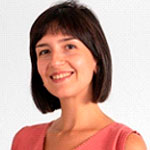 Clara Planchuelo Fernández
Profesora y Directora de TFG
Professor and FRP Director
Directora de los Másteres de Didáctica del Español como Lengua Extranjera y Lingüística Aplicada a la Enseñanza del Español como Lengua Extranjera. Profesora de Máster y en los Grados de Educación. Doctora en Psicolingüística (Educación y Procesos Cognitivos) por Universidad Nebrija. Es graduada en Filología Hispánica (Universidad de Alcalá) y cuenta con el Máster en Formación de Profesores de Español como Lengua Extranjera (UAH), y el Máster en Cognición y Emoción en Contextos Educativos (U. Nebrija). Tras una extensa etapa dedicada a la docencia y formación de alumnos para exámenes oficiales de ELE, actualmente es Directora de los Másteres en Didáctica del Español como Lengua Extranjera y Lingüística Aplicada a la Enseñanza de Español como Lengua Extranjera (Departamento de Lenguas), además de impartir docencia en estos programas y en los Grados de Educación. Asimismo, es investigadora miembro del Centro de Investigación Nebrija en Cognición (CINC) y el Affective Neuroscience and Cognition Group (AFNECO), en Universidad Complutense de Madrid. También ha sido gestora de un proyecto público financiado por la Comunidad de Madrid y el Fondo Social Europeo dedicado al estudio de los procesos de adquisición del conocimiento (SAPIENTIA-CM). Cuenta con diversas publicaciones científicas y divulgativas acerca de la organización mental del léxico. Su gran pasión profesional se centra en las áreas científicas que abordan el aprendizaje de lenguas extranjeras y la neurociencia cognitiva.
Clara Planchuelo Fernández
Profesora y Directora de TFG
Professor and FRP Director
Directora de los Másteres de Didáctica del Español como Lengua Extranjera y Lingüística Aplicada a la Enseñanza del Español como Lengua Extranjera. Profesora de Máster y en los Grados de Educación. Doctora en Psicolingüística (Educación y Procesos Cognitivos) por Universidad Nebrija. Es graduada en Filología Hispánica (Universidad de Alcalá) y cuenta con el Máster en Formación de Profesores de Español como Lengua Extranjera (UAH), y el Máster en Cognición y Emoción en Contextos Educativos (U. Nebrija). Tras una extensa etapa dedicada a la docencia y formación de alumnos para exámenes oficiales de ELE, actualmente es Directora de los Másteres en Didáctica del Español como Lengua Extranjera y Lingüística Aplicada a la Enseñanza de Español como Lengua Extranjera (Departamento de Lenguas), además de impartir docencia en estos programas y en los Grados de Educación. Asimismo, es investigadora miembro del Centro de Investigación Nebrija en Cognición (CINC) y el Affective Neuroscience and Cognition Group (AFNECO), en Universidad Complutense de Madrid. También ha sido gestora de un proyecto público financiado por la Comunidad de Madrid y el Fondo Social Europeo dedicado al estudio de los procesos de adquisición del conocimiento (SAPIENTIA-CM). Cuenta con diversas publicaciones científicas y divulgativas acerca de la organización mental del léxico. Su gran pasión profesional se centra en las áreas científicas que abordan el aprendizaje de lenguas extranjeras y la neurociencia cognitiva.
cplanchuelo@nebrija.es
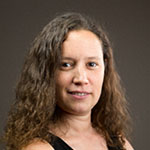 Margarita Planelles Almeida
Directora de TFG
FRP Director
Doctora en Filosofía por la Universidad de Sevilla. Máster en Lingüística aplicada a la enseñanza del español como lengua extranjera por la Universidad Nebrija. Desde 2018 coordina la Cátedra global Nebrija-Santander del Español como lengua de migrantes y refugiados. Profesionalmente, ha trabajado como profesora de ELE en diferentes centros en España y en el extranjero, y como coach online de español con universidades de California (EEUU). También ha colaborado en la elaboración de materiales didácticos en una editorial especializada en materiales de ELE. Actualmente, es profesora en el Departamento de Lenguas Aplicadas de la Universidad Antonio de Nebrija. Como miembro del grupo de investigación LAELE, sus líneas de investigación se centran en los procesos de adquisición, aprendizaje y enseñanza del español como lengua adicional, con especial foco en contextos de migración. Ha participado en proyectos de investigación sobre estas temáticas y cuenta con publicaciones científicas en revistas de impacto y ponencias en diversos congresos internacionales.
Margarita Planelles Almeida
Directora de TFG
FRP Director
Doctora en Filosofía por la Universidad de Sevilla. Máster en Lingüística aplicada a la enseñanza del español como lengua extranjera por la Universidad Nebrija. Desde 2018 coordina la Cátedra global Nebrija-Santander del Español como lengua de migrantes y refugiados. Profesionalmente, ha trabajado como profesora de ELE en diferentes centros en España y en el extranjero, y como coach online de español con universidades de California (EEUU). También ha colaborado en la elaboración de materiales didácticos en una editorial especializada en materiales de ELE. Actualmente, es profesora en el Departamento de Lenguas Aplicadas de la Universidad Antonio de Nebrija. Como miembro del grupo de investigación LAELE, sus líneas de investigación se centran en los procesos de adquisición, aprendizaje y enseñanza del español como lengua adicional, con especial foco en contextos de migración. Ha participado en proyectos de investigación sobre estas temáticas y cuenta con publicaciones científicas en revistas de impacto y ponencias en diversos congresos internacionales.
mplanelles@nebrija.es
 Claudia Poch Pérez Botija
Directora TFG
FRP Director
Doctora acreditada en Neurociencia por la Universidad Autónoma de Madrid Licenciada en Psicología, con la especialidad de Psicología y Ciencia Cognitiva en la Universidad Complutense de Madrid. Beca de investigación en el Centro de Magnetoencefalografía Perez-Modrego de la Universidad Complutense de Madrid y estancia de investigación en el Center for Cognitive Neuroscience (UCL), Londres,
Actualmente forma parte del grupo de investigación que el Dr. Duñabeitia dirige en
la Universidad de Nebrija y mantiene una colaboración activa con el grupo de investigación del Prof. Romei de la Universidad de Boloña (Italia). En relación a su trayectoria investigadora, ésta se ha centrado fundamentalmente en dos proyectos financiados por el Ministerio de Economía y Competitividad. El primero, estudia los procesos neurofisiológicos asociados a la atención dentro de la Memoria Operativa. El segundo se centra en la memoria semántica en pacientes con epilepsia. Como resultado, su producción científica asciende a 21 publicaciones, el 73 % en Q1.
Claudia Poch Pérez Botija
Directora TFG
FRP Director
Doctora acreditada en Neurociencia por la Universidad Autónoma de Madrid Licenciada en Psicología, con la especialidad de Psicología y Ciencia Cognitiva en la Universidad Complutense de Madrid. Beca de investigación en el Centro de Magnetoencefalografía Perez-Modrego de la Universidad Complutense de Madrid y estancia de investigación en el Center for Cognitive Neuroscience (UCL), Londres,
Actualmente forma parte del grupo de investigación que el Dr. Duñabeitia dirige en
la Universidad de Nebrija y mantiene una colaboración activa con el grupo de investigación del Prof. Romei de la Universidad de Boloña (Italia). En relación a su trayectoria investigadora, ésta se ha centrado fundamentalmente en dos proyectos financiados por el Ministerio de Economía y Competitividad. El primero, estudia los procesos neurofisiológicos asociados a la atención dentro de la Memoria Operativa. El segundo se centra en la memoria semántica en pacientes con epilepsia. Como resultado, su producción científica asciende a 21 publicaciones, el 73 % en Q1.
cpoch@nebrija.es
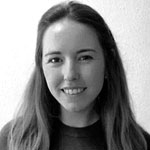 Sara Pulgar Tomás
Profesora y Directora TFG
Professor and FRP Director
Diplomada en Educación Musical y Graduada en Educación Primaria por la Facultad del Profesorado de la Universidad de Oviedo, además del Grado de Educación Infantil por la Universidad Antonio de Nebrija. Formación continua centrada en innovación educativa en el aula. Desarrolla su labor profesional como maestra en Educación Infantil y en Educación Primaria.
Sara Pulgar Tomás
Profesora y Directora TFG
Professor and FRP Director
Diplomada en Educación Musical y Graduada en Educación Primaria por la Facultad del Profesorado de la Universidad de Oviedo, además del Grado de Educación Infantil por la Universidad Antonio de Nebrija. Formación continua centrada en innovación educativa en el aula. Desarrolla su labor profesional como maestra en Educación Infantil y en Educación Primaria.
spulgar@nebrija.es
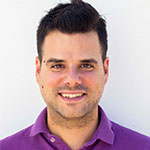 Manuel Reiriz Rojas
Director TFG
FRP Director
Doctor en Biología por la universidad de Sevilla, cursando el Máster oficial de Fisiología y Neurociencia. Ha ejercido docencia en el departamento de Psicobiología de la Universidad de Sevilla y en la Universidad Antonio Nebrija en el Máster de formación del profesorado. Cuenta con experiencia tanto en el campo de la neurociencia y su enseñanza como en el de educación. Posee Igualmente publicaciones en el ámbito de la Psicobiología y en el de la innovación docente.
Manuel Reiriz Rojas
Director TFG
FRP Director
Doctor en Biología por la universidad de Sevilla, cursando el Máster oficial de Fisiología y Neurociencia. Ha ejercido docencia en el departamento de Psicobiología de la Universidad de Sevilla y en la Universidad Antonio Nebrija en el Máster de formación del profesorado. Cuenta con experiencia tanto en el campo de la neurociencia y su enseñanza como en el de educación. Posee Igualmente publicaciones en el ámbito de la Psicobiología y en el de la innovación docente.
mreiriz@nebrija.es
 José Francisco Rocabado Rocha
Profesor y Director TFG
Professor and FRP Director
Profesor e investigador en formación en los Grados de Educación Infantil, Primaria y doble Grado en Educación Primaria y Psicología. Doctorando en Educación y Procesos Cognitivos en la Universidad Nebrija. Graduado en Psicología por la Universidad Católica de Valencia. Máster en Psicología Clínica General en Sanitaria por la Universidad Católica de Valencia. En la actualidad es miembro del Centro de Investigación Nebrija en cognición (CINC) Su actividad investigadora se centra en la implementación y uso de técnicas de Realidad Virtual como puente entre el laboratorio y el mundo real, con el fin de explorar procesos cognitivos ampliamente estudiados en el laboratorio como son el procesamiento del lenguaje, las emociones, el aprendizaje incidental y las funciones ejecutiva en un contexto muy cercano a la realidad. Colabora activamente con grupos de investigación en la Universidad de Valencia y la Universidad de Bournemouth. Es autor de diversos artículos científicos en revistas de alto impacto (Q1 y decil 1) y ponente en congresos nacionales e internacionales.
José Francisco Rocabado Rocha
Profesor y Director TFG
Professor and FRP Director
Profesor e investigador en formación en los Grados de Educación Infantil, Primaria y doble Grado en Educación Primaria y Psicología. Doctorando en Educación y Procesos Cognitivos en la Universidad Nebrija. Graduado en Psicología por la Universidad Católica de Valencia. Máster en Psicología Clínica General en Sanitaria por la Universidad Católica de Valencia. En la actualidad es miembro del Centro de Investigación Nebrija en cognición (CINC) Su actividad investigadora se centra en la implementación y uso de técnicas de Realidad Virtual como puente entre el laboratorio y el mundo real, con el fin de explorar procesos cognitivos ampliamente estudiados en el laboratorio como son el procesamiento del lenguaje, las emociones, el aprendizaje incidental y las funciones ejecutiva en un contexto muy cercano a la realidad. Colabora activamente con grupos de investigación en la Universidad de Valencia y la Universidad de Bournemouth. Es autor de diversos artículos científicos en revistas de alto impacto (Q1 y decil 1) y ponente en congresos nacionales e internacionales.
jrocabado@nebrija.es
 Olga Rodríguez Alejandre
Profesora y Directora TFG
Professor and FRP Director
Licenciada en Psicología. Actualmente es doctoranda en educación y desarrolla su investigación acerca de los trabajadores con discapacidad intelectual frente a los empresarios como un valor añadido. Centra su principal labor en la formación de personas adultas con discapacidad intelectual en proyectos formativos para adultos con discapacidad intelectual (DI). Comparte su tarea docente en varias universidades. Su línea principal de investigación se ha venido desarrollando a nivel internacional y nacional, con el soporte de varias convocatorias I+D+i, centrándose en la investigación de apoyos formativos y tecnológico que favorezcan la calidad de vida de las personas con discapacidad intelectual. Conjuntamente ha participado en diversos congresos del ámbito de la educación inclusiva y la DI aportando diversas comunicaciones.
orodriguez@nebrija.es
Olga Rodríguez Alejandre
Profesora y Directora TFG
Professor and FRP Director
Licenciada en Psicología. Actualmente es doctoranda en educación y desarrolla su investigación acerca de los trabajadores con discapacidad intelectual frente a los empresarios como un valor añadido. Centra su principal labor en la formación de personas adultas con discapacidad intelectual en proyectos formativos para adultos con discapacidad intelectual (DI). Comparte su tarea docente en varias universidades. Su línea principal de investigación se ha venido desarrollando a nivel internacional y nacional, con el soporte de varias convocatorias I+D+i, centrándose en la investigación de apoyos formativos y tecnológico que favorezcan la calidad de vida de las personas con discapacidad intelectual. Conjuntamente ha participado en diversos congresos del ámbito de la educación inclusiva y la DI aportando diversas comunicaciones.
orodriguez@nebrija.es
 Benjamín Rodríguez Expósito
Director TFG
FRP Director
Doctor en Biología. Máster universitario de especialización en Fisiología y Neurociencia, Licenciado en Biología. Actualmente ejerce como docente en diversas asignaturas del Grado de Psicología en la Universidad Nacional de Educación a Distancia (UNED), así como profesor en el Master de Formación del profesorado y el Master en cognición y emoción en contextos educativos de la Universidad Antonio de Nebrija. Asimismo, a lo largo de su carrera como docente ha impartido docencia teórica y práctica en diversas asignaturas troncales, obligatorias y optativas del Grado de Psicología, desarrollando dicha actividad docente en diversas universidades como la Universidad de Sevilla y la Universidad de Huelva; también ha participado como tutor de Trabajos Fin de Master tanto en el máster universitario de Fisiología y Neurociencia de la Universidad de Sevilla, como en el Máster Universitario en Formación del Profesorado de la Universidad Antonio de Nebrija. En cuanto a su producción científica, es autor/coautor de diversas publicaciones científicas en revistas de reconocido prestigio e incluidas en el journal citation report, tales como Behavioural Brain Research, Physiology and Behaviour, Neurobiology of learning and memory y Brain, structure and funtion. Contando las mismas con un alto índice de impacto y con posiciones destacadas dentro del campo de estudio de la neurociencia. Asimismo, ha participado en cursos, seminarios de especialización y congresos científicos tanto nacionales como internacionales, contribuyendo en estos últimos con diversas publicaciones. Ha participado como investigador en varios proyectos de investigación nacionales dentro del Plan Nacional de I+D del Gobierno de España relacionados con el estudio de las bases neurales del aprendizaje y la memoria.
brodrigueze@nebrija.es
Benjamín Rodríguez Expósito
Director TFG
FRP Director
Doctor en Biología. Máster universitario de especialización en Fisiología y Neurociencia, Licenciado en Biología. Actualmente ejerce como docente en diversas asignaturas del Grado de Psicología en la Universidad Nacional de Educación a Distancia (UNED), así como profesor en el Master de Formación del profesorado y el Master en cognición y emoción en contextos educativos de la Universidad Antonio de Nebrija. Asimismo, a lo largo de su carrera como docente ha impartido docencia teórica y práctica en diversas asignaturas troncales, obligatorias y optativas del Grado de Psicología, desarrollando dicha actividad docente en diversas universidades como la Universidad de Sevilla y la Universidad de Huelva; también ha participado como tutor de Trabajos Fin de Master tanto en el máster universitario de Fisiología y Neurociencia de la Universidad de Sevilla, como en el Máster Universitario en Formación del Profesorado de la Universidad Antonio de Nebrija. En cuanto a su producción científica, es autor/coautor de diversas publicaciones científicas en revistas de reconocido prestigio e incluidas en el journal citation report, tales como Behavioural Brain Research, Physiology and Behaviour, Neurobiology of learning and memory y Brain, structure and funtion. Contando las mismas con un alto índice de impacto y con posiciones destacadas dentro del campo de estudio de la neurociencia. Asimismo, ha participado en cursos, seminarios de especialización y congresos científicos tanto nacionales como internacionales, contribuyendo en estos últimos con diversas publicaciones. Ha participado como investigador en varios proyectos de investigación nacionales dentro del Plan Nacional de I+D del Gobierno de España relacionados con el estudio de las bases neurales del aprendizaje y la memoria.
brodrigueze@nebrija.es
 Teresa Rossignoli
Profesora y Directora TFG
Professor and FRP Director
Doctora “Cum laude” en Psicología por la Universidad Complutense de Madrid. Máster en Neuropsicología Infantil y licenciada en Psicopedagogía. Posee amplia experiencia como personal docente-investigador en el Centro Universitario Cardenal Cisneros, profesora asociada en la Universidad Autónoma de Madrid, y docente en Master de Neurospicología en la Universidad Operta de Catalunya. A su vez, cuenta con amplia experiencia en intervención neuropsicológica y coordinación del dto. de Neuropsicología Infantil en el Centro Comunica. Actualmente, es la directora del máster en Cognición y Emoción en Contextos Educativos por la Universidad Antonio de Nebrija.
Su enfoque de trabajo es la aplicación del conocimiento neurocientífico, junto con las bases de desarrollo, es clave en la práctica educativa.
Su investigación está especialmente orientada al entrenamiento cognitivo de la atención y de las funciones ejecutivas en población escolar, entre los que destaca: (1) Rossignoli-Palomeque, T., Perez-Hernandez, E., & González Marqués, J. (2018). Brain training in children and adolescents: Is it scientifically valid? Frontiers in Psychology, 9, 565. (2) Rossignoli, T, Perez-Hernandez, E., Quiros-Godoy, M., González Marqués, J (2019) Schoolchildren’s compensatory strategies during an Executive Function App Training. Frontiers in Psychology 10, 2332. (3) Rossignoli, T, Perez-Hernandez, E., González Marqués, J. (2020) Training effects on attention and EF strategy-based training “Nexxo” in school-age students. Acta Psychologica 210, 103174.
trossignoli@nebrija.es
Teresa Rossignoli
Profesora y Directora TFG
Professor and FRP Director
Doctora “Cum laude” en Psicología por la Universidad Complutense de Madrid. Máster en Neuropsicología Infantil y licenciada en Psicopedagogía. Posee amplia experiencia como personal docente-investigador en el Centro Universitario Cardenal Cisneros, profesora asociada en la Universidad Autónoma de Madrid, y docente en Master de Neurospicología en la Universidad Operta de Catalunya. A su vez, cuenta con amplia experiencia en intervención neuropsicológica y coordinación del dto. de Neuropsicología Infantil en el Centro Comunica. Actualmente, es la directora del máster en Cognición y Emoción en Contextos Educativos por la Universidad Antonio de Nebrija.
Su enfoque de trabajo es la aplicación del conocimiento neurocientífico, junto con las bases de desarrollo, es clave en la práctica educativa.
Su investigación está especialmente orientada al entrenamiento cognitivo de la atención y de las funciones ejecutivas en población escolar, entre los que destaca: (1) Rossignoli-Palomeque, T., Perez-Hernandez, E., & González Marqués, J. (2018). Brain training in children and adolescents: Is it scientifically valid? Frontiers in Psychology, 9, 565. (2) Rossignoli, T, Perez-Hernandez, E., Quiros-Godoy, M., González Marqués, J (2019) Schoolchildren’s compensatory strategies during an Executive Function App Training. Frontiers in Psychology 10, 2332. (3) Rossignoli, T, Perez-Hernandez, E., González Marqués, J. (2020) Training effects on attention and EF strategy-based training “Nexxo” in school-age students. Acta Psychologica 210, 103174.
trossignoli@nebrija.es
 Carmen Cecilia Roz Faraco
Directora TFG
FRP Director
Profesora de la asignatura de Atención Temprana. Doctora en Educación por la Universidad de Alcalá. Máster en psicopedagogía por la Universidad de Alcalá. Licenciada en psicopedagogía título homologado por el Reino de España y Profesora de Educación Especial mención dificultades en el aprendizaje por la Universidad Pedagógica Experimental Libertador. Su línea de investigación se centra en la formación de los maestros/as y psicomotricidad infantil. Experiencia profesional como psicopedagoga en atención temprana por más de 10 años y como psicopedagoga a nivel de instituciones educativas por más de 15 años para el Ministerio de Educación en Venezuela, 6 años de experiencia como profesora universitaria de grado y postgrado tanto en Venezuela, España y México. Autora de distintos artículos de investigación y presentaciones en congresos internacionales. Actualmente, docente en grado en la Universidad Nebrija.
croz@nebrija.es
Carmen Cecilia Roz Faraco
Directora TFG
FRP Director
Profesora de la asignatura de Atención Temprana. Doctora en Educación por la Universidad de Alcalá. Máster en psicopedagogía por la Universidad de Alcalá. Licenciada en psicopedagogía título homologado por el Reino de España y Profesora de Educación Especial mención dificultades en el aprendizaje por la Universidad Pedagógica Experimental Libertador. Su línea de investigación se centra en la formación de los maestros/as y psicomotricidad infantil. Experiencia profesional como psicopedagoga en atención temprana por más de 10 años y como psicopedagoga a nivel de instituciones educativas por más de 15 años para el Ministerio de Educación en Venezuela, 6 años de experiencia como profesora universitaria de grado y postgrado tanto en Venezuela, España y México. Autora de distintos artículos de investigación y presentaciones en congresos internacionales. Actualmente, docente en grado en la Universidad Nebrija.
croz@nebrija.es
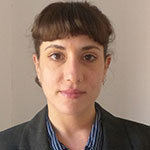 María Dolores Rueda Montero
Profesora y Directora TFG
Professor and FRP Director
Doctor en Literatura en Inglés (Estudios Filológicos) por la Universidad de Sevilla
Profesora en el grado en Educación Infantil y Mención en Lengua Extranjera en nuestra Universidad, también enseña Inglés presencialmente en los grados de ESNE (Escuela Universitaria de Diseño). Colabora además en las universidades Francisco de Vitoria y Camilo José Cela en diversos másters oficiales online centrados en la enseñanza de las segundas lenguas, psicopedagogía, y competencias docentes.
Doctora en Literatura en Inglés y licenciada en Filología Inglesa por la Universidad de Sevilla. Su investigación doctoral en la Universidad de Sevilla se centra en el campo de los Discursos de la Postmodernidad, que es su especialidad, y su tesis en inglés se titula "Identity as Alterity in Paul Auster's The New York Trilogy and Martin Amis's London Fields", mientras que su tesina versaba sobre viajes en el tiempo a la Segunda Guerra Mundial.
Ha realizado el Máster Universitario de formación de profesorado de Educación Secundaria, Obligatoria y Bachillerato, Formación Profesional y Enseñanza de Idiomas en inglés y cursado estudios de postgrado en la enseñanza de las segundas lenguas en EEUU.
Anteriormente ha sido profesora de ELE y GRC (Graduate Research Consultant) en la UNC at Chapel Hill (Universidad de Carolina del Norte), además de tener amplia experiencia como profesora en todo tipo de contextos bilingües.
mrueda@nebrija.es
María Dolores Rueda Montero
Profesora y Directora TFG
Professor and FRP Director
Doctor en Literatura en Inglés (Estudios Filológicos) por la Universidad de Sevilla
Profesora en el grado en Educación Infantil y Mención en Lengua Extranjera en nuestra Universidad, también enseña Inglés presencialmente en los grados de ESNE (Escuela Universitaria de Diseño). Colabora además en las universidades Francisco de Vitoria y Camilo José Cela en diversos másters oficiales online centrados en la enseñanza de las segundas lenguas, psicopedagogía, y competencias docentes.
Doctora en Literatura en Inglés y licenciada en Filología Inglesa por la Universidad de Sevilla. Su investigación doctoral en la Universidad de Sevilla se centra en el campo de los Discursos de la Postmodernidad, que es su especialidad, y su tesis en inglés se titula "Identity as Alterity in Paul Auster's The New York Trilogy and Martin Amis's London Fields", mientras que su tesina versaba sobre viajes en el tiempo a la Segunda Guerra Mundial.
Ha realizado el Máster Universitario de formación de profesorado de Educación Secundaria, Obligatoria y Bachillerato, Formación Profesional y Enseñanza de Idiomas en inglés y cursado estudios de postgrado en la enseñanza de las segundas lenguas en EEUU.
Anteriormente ha sido profesora de ELE y GRC (Graduate Research Consultant) en la UNC at Chapel Hill (Universidad de Carolina del Norte), además de tener amplia experiencia como profesora en todo tipo de contextos bilingües.
mrueda@nebrija.es
 Sandra Ruiz Ambit
Profesora y Directora TFG
Professor and FRP Director
Coordinadora Máster Estudios Avanzados en Altas Capacidades y Desarrollo del Talento y Coordinadora Máster en Desarrollo del Lenguaje y Dificultades en la Comunicación. Doctora en Educación, compagina la docencia universitaria con la investigación y participación en distintos proyectos de innovación relacionados con la atención a las necesidades específicas de apoyo educativo y la pedagogía. Tiene experiencia en la formación de jóvenes y adultos con necesidades específicas de apoyo educativo y la formación de docentes.
sruizam@nebrija.es
Sandra Ruiz Ambit
Profesora y Directora TFG
Professor and FRP Director
Coordinadora Máster Estudios Avanzados en Altas Capacidades y Desarrollo del Talento y Coordinadora Máster en Desarrollo del Lenguaje y Dificultades en la Comunicación. Doctora en Educación, compagina la docencia universitaria con la investigación y participación en distintos proyectos de innovación relacionados con la atención a las necesidades específicas de apoyo educativo y la pedagogía. Tiene experiencia en la formación de jóvenes y adultos con necesidades específicas de apoyo educativo y la formación de docentes.
sruizam@nebrija.es
 Eduardo San Martín Navas
Profesor y Director TFG
Professor and FRP Director
Máster Universitario en Didácticas Específicas en el Aula, Museos y Espacios Naturales (Universidad Autónoma de Madrid). Graduado en Magisterio en Educación Primaria (Universidad Autónoma de Madrid). Profesor de “Aprendizaje de la lengua española” en Máster de Enseñanza de Chino como Lengua Extranjera para Niños Hispanohablantes (Universidad Pontificia Comillas). Profesor de chino en Humanitas Bilingual School, Alaria Nursery Schools (Grupo ARCADIA), Colegio Mirasur – Centro Privado Bilingüe, Mirabal International School, Colegio Público Ciudad de Nejapa, CEIP Cardenal Herrera Oria, Eurocolgio Casvi, Trinity College. Profesor de Aula enlace (español para extranjeros) en Colegio Mirasur – Centro Privado Bilingüe.
esanmart@nebrija.es
Eduardo San Martín Navas
Profesor y Director TFG
Professor and FRP Director
Máster Universitario en Didácticas Específicas en el Aula, Museos y Espacios Naturales (Universidad Autónoma de Madrid). Graduado en Magisterio en Educación Primaria (Universidad Autónoma de Madrid). Profesor de “Aprendizaje de la lengua española” en Máster de Enseñanza de Chino como Lengua Extranjera para Niños Hispanohablantes (Universidad Pontificia Comillas). Profesor de chino en Humanitas Bilingual School, Alaria Nursery Schools (Grupo ARCADIA), Colegio Mirasur – Centro Privado Bilingüe, Mirabal International School, Colegio Público Ciudad de Nejapa, CEIP Cardenal Herrera Oria, Eurocolgio Casvi, Trinity College. Profesor de Aula enlace (español para extranjeros) en Colegio Mirasur – Centro Privado Bilingüe.
esanmart@nebrija.es
 Natalia Sancho Cubino
Profesora y Directora TFG
Professor and FRP Director
Doctor en Bellas Artes por la Universidad Complutense de Madrid. Profesora de inglés y organizadora de estancias en el Reino Unido. Antigua línea de investigación: reproducción de pigmentos de cobre a nivel de laboratorio. Nueva línea de investigación: estudio del bilingüismo en edades tempranas. Evolución.
nsancho@nebrija.es
Natalia Sancho Cubino
Profesora y Directora TFG
Professor and FRP Director
Doctor en Bellas Artes por la Universidad Complutense de Madrid. Profesora de inglés y organizadora de estancias en el Reino Unido. Antigua línea de investigación: reproducción de pigmentos de cobre a nivel de laboratorio. Nueva línea de investigación: estudio del bilingüismo en edades tempranas. Evolución.
nsancho@nebrija.es
 José Javier Sanz Gil
Director TFG
FRP Director
Doctor acreditado sobresaliente Cum Laude en Ciencias de la Salud por la Universidad Camilo José Cela (UCJC, 2010). Experto Universitario en el Desarrollo del Aprendizaje y Conocimiento en entorno TIC (UCJC, 2011/12) y Experto en creación de Contenidos Didácticos Multimedia Interactivos” (UCJC, 2012/13). Desde septiembre de 1988, Profesor Titular en los Centros de Enseñanza "San Estanislao de Kostka, Ciudalcampo” y "SEK International School Castillo” combinando esta actividad con la creación y asesoramiento de contenidos educativos digitales e interactivos para la Empresa “Advance Educational Entertainment” S.L. (Freelance). Asimismo, es profesor en el Máster Oficial de Educación Secundaria de la Universidad UNIR y ha sido docente en el Máster Oficial Universitario en eLearning y Tecnología Educativa de Bureau Veritas, UCJC. Miembro del Consejo de redacción de diferentes revistas científicas y evaluador de diversas revistas científicas sobre educación, formación docente y TIC. Ha participado en diferentes proyectos de investigación, así como de innovación y mejora docente a través del uso de plataformas digitales educativas para alumnado universitario y de Bachillerato.
José Javier Sanz Gil
Director TFG
FRP Director
Doctor acreditado sobresaliente Cum Laude en Ciencias de la Salud por la Universidad Camilo José Cela (UCJC, 2010). Experto Universitario en el Desarrollo del Aprendizaje y Conocimiento en entorno TIC (UCJC, 2011/12) y Experto en creación de Contenidos Didácticos Multimedia Interactivos” (UCJC, 2012/13). Desde septiembre de 1988, Profesor Titular en los Centros de Enseñanza "San Estanislao de Kostka, Ciudalcampo” y "SEK International School Castillo” combinando esta actividad con la creación y asesoramiento de contenidos educativos digitales e interactivos para la Empresa “Advance Educational Entertainment” S.L. (Freelance). Asimismo, es profesor en el Máster Oficial de Educación Secundaria de la Universidad UNIR y ha sido docente en el Máster Oficial Universitario en eLearning y Tecnología Educativa de Bureau Veritas, UCJC. Miembro del Consejo de redacción de diferentes revistas científicas y evaluador de diversas revistas científicas sobre educación, formación docente y TIC. Ha participado en diferentes proyectos de investigación, así como de innovación y mejora docente a través del uso de plataformas digitales educativas para alumnado universitario y de Bachillerato.
jsanzgi@nebrija.es
 Victor Joan Tietje Fonollosa
Profesor y Tutor de TFG
Professor and FRP Director
Graduado Educación Primaria por la Universidad de Alicante, con formación adicional en diversos grados en el ámbito educativo. Experiencia como docente de lengua castellana para estudiantes extranjeros en distintas academias.
Victor Joan Tietje Fonollosa
Profesor y Tutor de TFG
Professor and FRP Director
Graduado Educación Primaria por la Universidad de Alicante, con formación adicional en diversos grados en el ámbito educativo. Experiencia como docente de lengua castellana para estudiantes extranjeros en distintas academias.
vtietje@nebrija.es
 Natalia Toledo Maestro
Profesora y Directora TFG
Professor and FRP Director
Graduada en logopedia por la UCM. Técnico superior (CFGS) en Integración social Escuelas profesionales Padre Piquer. Técnico Superior (CFGS) Audiología protésica Escuela MOPE. Logopeda en atención temprana y centros de logopedia multidisciplinares para el tratamiento de trastornos de la comunicación y alimentación en personas de todas las edades: trastornos de habla, lenguaje, voz y deglución atípica, así como estimulación precoz. (Zaragoza, Logroño y Madrid). Logopeda en centros escolares CEIP, para el tratamiento e intervención de trastornos de audición y lenguaje en etapa escolar.
Natalia Toledo Maestro
Profesora y Directora TFG
Professor and FRP Director
Graduada en logopedia por la UCM. Técnico superior (CFGS) en Integración social Escuelas profesionales Padre Piquer. Técnico Superior (CFGS) Audiología protésica Escuela MOPE. Logopeda en atención temprana y centros de logopedia multidisciplinares para el tratamiento de trastornos de la comunicación y alimentación en personas de todas las edades: trastornos de habla, lenguaje, voz y deglución atípica, así como estimulación precoz. (Zaragoza, Logroño y Madrid). Logopeda en centros escolares CEIP, para el tratamiento e intervención de trastornos de audición y lenguaje en etapa escolar.
ntoledo@nebrija.es
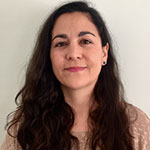 María Cruz Tornay Márquez
Directora TFG
FRP Director
Acreditada Contratado Doctor (Aneca). Doctora en Comunicación, mención internacional, calificación Cum Laude por la Universidad de Sevilla; máster en Estudios de Género y Desarrollo Profesional de la Universidad de Sevilla, y licenciada en Ciencias de Comunicación, especialidad Periodismo, por el Centro Andaluz de Estudios Empresariales (CEADE) (España). Miembro del Grupo Interdisciplinario de Estudios en Comunicación, Política y Cambio Social (COMPOLÍTICAS). Colaboradora honoraria del departamento de Publicidad y Comunicación Audiovisual de la Universidad de Sevilla y revisora científica de la revista Comunicar. Miembro de la Asociación Española de Investigación de la Comunicación (AE-IC); de la Unión Latina de Economía Política de la Información, la Comunicación y la Cultura (ULEPICC); de la Red Interuniversitaria Euroamericana de Investigación sobre Competencias Mediáticas para la Ciudadanía (Red AlfaMed) y de la Red de Investigación en Comunicación Comunitaria, Alternativa y Participativa (RICCAP). Ha realizado una estancia doctoral en el Programa Universitario de Estudios de Género (PUEG) de la Universidad Nacional Autónoma de México (UNAM), con beca del Programa de Movilidad de la Asociación Universitaria Iberoamericana de Postgrado. Sus líneas de investigación se enfocan en la alfabetización mediática y la comunicación para el desarrollo y el cambio social con énfasis en la perspectiva de género. Cuenta con varias publicaciones y capítulos en libros, y ha participado en diversos congresos internacionales como ponente y panelista. Ha residido y desarrollado su labor investigadora en España, El Salvador, R.B. de Venezuela, Ecuador y Ciudad de México. Se ha desempeñado como docente investigadora en diferentes universidades de grado y postgrado. Actualmente es docente colaboradora en la Universidad de Nebrija y en el Centro San Isidoro, adscrito a la Universidad Pablo de Olavide, y profesora colaborada en el Magíster en Comunicación y Cambio Social de la Universidad Católica de la Santísima Concepción (Chile).
María Cruz Tornay Márquez
Directora TFG
FRP Director
Acreditada Contratado Doctor (Aneca). Doctora en Comunicación, mención internacional, calificación Cum Laude por la Universidad de Sevilla; máster en Estudios de Género y Desarrollo Profesional de la Universidad de Sevilla, y licenciada en Ciencias de Comunicación, especialidad Periodismo, por el Centro Andaluz de Estudios Empresariales (CEADE) (España). Miembro del Grupo Interdisciplinario de Estudios en Comunicación, Política y Cambio Social (COMPOLÍTICAS). Colaboradora honoraria del departamento de Publicidad y Comunicación Audiovisual de la Universidad de Sevilla y revisora científica de la revista Comunicar. Miembro de la Asociación Española de Investigación de la Comunicación (AE-IC); de la Unión Latina de Economía Política de la Información, la Comunicación y la Cultura (ULEPICC); de la Red Interuniversitaria Euroamericana de Investigación sobre Competencias Mediáticas para la Ciudadanía (Red AlfaMed) y de la Red de Investigación en Comunicación Comunitaria, Alternativa y Participativa (RICCAP). Ha realizado una estancia doctoral en el Programa Universitario de Estudios de Género (PUEG) de la Universidad Nacional Autónoma de México (UNAM), con beca del Programa de Movilidad de la Asociación Universitaria Iberoamericana de Postgrado. Sus líneas de investigación se enfocan en la alfabetización mediática y la comunicación para el desarrollo y el cambio social con énfasis en la perspectiva de género. Cuenta con varias publicaciones y capítulos en libros, y ha participado en diversos congresos internacionales como ponente y panelista. Ha residido y desarrollado su labor investigadora en España, El Salvador, R.B. de Venezuela, Ecuador y Ciudad de México. Se ha desempeñado como docente investigadora en diferentes universidades de grado y postgrado. Actualmente es docente colaboradora en la Universidad de Nebrija y en el Centro San Isidoro, adscrito a la Universidad Pablo de Olavide, y profesora colaborada en el Magíster en Comunicación y Cambio Social de la Universidad Católica de la Santísima Concepción (Chile).
mtornay@nebrija.es
 Victoria Tornel Bastida
Profesora y Directora de TFG
Professor and FRP Director
Doctoranda en Educación por la Escuela Internacional de Doctorado de la Universidad Católica de Murcia (UCAM), con formación en Pedagogía por la Universidad de Murcia (UMU) y en Educación Primaria con mención en Pedagogía Terapéutica por la UCAM. Posee un Máster en Tratamiento Educativo de la Diversidad por la Universidad Nacional de Educación a Distancia (UNED). Es profesora universitaria y formadora en programas de desarrollo de competencias profesionales en el ámbito educativo y socio-cultural. Sus principales líneas de investigación incluyen la aplicación de la Inteligencia Artificial en la educación, la Atención a la Diversidad, y la Inclusión e Integración educativa.
Victoria Tornel Bastida
Profesora y Directora de TFG
Professor and FRP Director
Doctoranda en Educación por la Escuela Internacional de Doctorado de la Universidad Católica de Murcia (UCAM), con formación en Pedagogía por la Universidad de Murcia (UMU) y en Educación Primaria con mención en Pedagogía Terapéutica por la UCAM. Posee un Máster en Tratamiento Educativo de la Diversidad por la Universidad Nacional de Educación a Distancia (UNED). Es profesora universitaria y formadora en programas de desarrollo de competencias profesionales en el ámbito educativo y socio-cultural. Sus principales líneas de investigación incluyen la aplicación de la Inteligencia Artificial en la educación, la Atención a la Diversidad, y la Inclusión e Integración educativa.
vtornel@nebrija.es
 Julia Valero Lendínez
Profesora y Directora de TFG
Professor and FRP Director
Graduada en Pedagogía por la Universidad de Granada. Máster en Formación y Orientación para el Trabajo por la Universidad de Sevilla, Máster en Formación del Profesorado de Educación Secundaria, Bachillerato y FP en la especialidad de Orientación Educativa (UGR) y Máster en Tecnología Digital aplicada a la Práctica Docente (UCJC).
Julia Valero Lendínez
Profesora y Directora de TFG
Professor and FRP Director
Graduada en Pedagogía por la Universidad de Granada. Máster en Formación y Orientación para el Trabajo por la Universidad de Sevilla, Máster en Formación del Profesorado de Educación Secundaria, Bachillerato y FP en la especialidad de Orientación Educativa (UGR) y Máster en Tecnología Digital aplicada a la Práctica Docente (UCJC).
Ha desarrollado su labor profesional en el ámbito de la orientación educativa y profesional, así como en el ámbito de la formación e-learning, participando además en Tribunales de evaluación de Trabajo Fin de Grado en diferentes universidades.
jvalerole@nebrija.es
 Cristina Villalonga Gómez
Profesora y Directora de TFG
Professor and FRP Director
Doctora en Comunicación y Educación en Entornos Digitales, Máster en Comunicación y Educación en la Red y Máster en Redes Sociales y Aprendizaje Digital por la UNED y Licenciada en Periodismo por la UAB. Directora de Global Campus Nebrija. Su actividad profesional e investigadora gira en torno a dos ejes: el desarrollo de competencias mediáticas y digitales en entornos móviles y ubicuos y las metodologías de enseñanza y aprendizaje e-Learning y b- Learning, centrándose en el empoderamiento mediático y digital a través de la renovación pedagógica. Forma parte del Grupo de Investigación Nebrija en Cognición, Educación y Diferencias Individuales y colabora con el Grupo de Investigación en Comunicación e Información Digital (GICID) de la Universidad de Zaragoza y. Ha puesto en marcha un modelo de educación digital que cuenta con numerosos reconocimientos, como el Premio de Excelencia Educativa 2017 a la Mejor Universidad Online, otorgado por la Fundación Mundo Ciudad. Cuenta con el Diploma en Alta Dirección de Universidades y es representante en el Grupo de Trabajo en Formación Online y Tecnología Educativa (FOLTE) de la Sectorial CRUE-TIC, colaborando en los proyectos relacionados con la Competencia Digital Docente y la Formación EdTech.
Cristina Villalonga Gómez
Profesora y Directora de TFG
Professor and FRP Director
Doctora en Comunicación y Educación en Entornos Digitales, Máster en Comunicación y Educación en la Red y Máster en Redes Sociales y Aprendizaje Digital por la UNED y Licenciada en Periodismo por la UAB. Directora de Global Campus Nebrija. Su actividad profesional e investigadora gira en torno a dos ejes: el desarrollo de competencias mediáticas y digitales en entornos móviles y ubicuos y las metodologías de enseñanza y aprendizaje e-Learning y b- Learning, centrándose en el empoderamiento mediático y digital a través de la renovación pedagógica. Forma parte del Grupo de Investigación Nebrija en Cognición, Educación y Diferencias Individuales y colabora con el Grupo de Investigación en Comunicación e Información Digital (GICID) de la Universidad de Zaragoza y. Ha puesto en marcha un modelo de educación digital que cuenta con numerosos reconocimientos, como el Premio de Excelencia Educativa 2017 a la Mejor Universidad Online, otorgado por la Fundación Mundo Ciudad. Cuenta con el Diploma en Alta Dirección de Universidades y es representante en el Grupo de Trabajo en Formación Online y Tecnología Educativa (FOLTE) de la Sectorial CRUE-TIC, colaborando en los proyectos relacionados con la Competencia Digital Docente y la Formación EdTech.
cvillalo@nebrija.es
 Alicia Villán Rodríguez
Profesora y Directora TFG
Professor and FRP Director
Doctora en Educación por la Universidad Complutense de Madrid. Máster Especialista en Dirección de Centros Educativos y Gestión para la Calidad, Certificado en Estudios Avanzados en Creatividad Aplicada, Master Especialista en Terapia Psicomotora.
Alicia Villán Rodríguez
Profesora y Directora TFG
Professor and FRP Director
Doctora en Educación por la Universidad Complutense de Madrid. Máster Especialista en Dirección de Centros Educativos y Gestión para la Calidad, Certificado en Estudios Avanzados en Creatividad Aplicada, Master Especialista en Terapia Psicomotora. Profesora dentro del Grado en Educación Infantil en Universidad Nebrija. Ha trabajado como Profesora Adjunta de Ciclo Formativo de Grado Superior de Educación y Psicología (Desarrollo Socio-Emocional e Intervención con Familias, Autonomía y Desarrollo Personal y Salud, Desarrollo Cognitivo, Integración Social, Formación y Orientación Laboral). A su vez, también ha ejercido su labor docente en las asignaturas Psicología del Desarrollo, Psicología de la Educación, Atención a Necesidades Educativas Especiales, Desarrollo Psicomotor.
avillan@nebrija.es
Tutores
Tutors
 Andrea Cereto Urdiales
Tutora del 4º curso (Grado en Educación Primaria; Doble Grado en Educación Primaria y en Educación Infantil; Doble Grado en Educación Primaria y Psicología
Tutor
Coordinadora Máster Estudios Avanzados en Altas Capacidades y Desarrollo del Talento y Coordinadora Máster en Desarrollo del Lenguaje y Dificultades en la Comunicación. Doctora en Educación, compagina la docencia universitaria con la investigación y participación en distintos proyectos de innovación relacionados con la atención a las necesidades específicas de apoyo educativo y la pedagogía. Tiene experiencia en la formación de jóvenes y adultos con necesidades específicas de apoyo educativo y la formación de docentes.
Andrea Cereto Urdiales
Tutora del 4º curso (Grado en Educación Primaria; Doble Grado en Educación Primaria y en Educación Infantil; Doble Grado en Educación Primaria y Psicología
Tutor
Coordinadora Máster Estudios Avanzados en Altas Capacidades y Desarrollo del Talento y Coordinadora Máster en Desarrollo del Lenguaje y Dificultades en la Comunicación. Doctora en Educación, compagina la docencia universitaria con la investigación y participación en distintos proyectos de innovación relacionados con la atención a las necesidades específicas de apoyo educativo y la pedagogía. Tiene experiencia en la formación de jóvenes y adultos con necesidades específicas de apoyo educativo y la formación de docentes.
acereto@nebrija.es
 IRENE GARCÍA HERRÁEZ
Tutora del 3º curso (Grado en Educación Primaria; Doble Grado en Educación Primaria y en Educación Infantil; Doble Grado en Educación Primaria y Psicología).
Tutor
Docente universitaria especializada en teatro y literatura, que combina la enseñanza con la creación dramatúrgica, la dirección escénica y la investigación, con un enfoque particular en el teatro para la infancia y la juventud. Graduada en Lenguas Modernas, Cultura y Comunicación por la Universidad Autónoma de Madrid y en Dramaturgia y Dirección por la Real Escuela Superior de Arte Dramático (RESAD). En 2017, obtuvo el Máster en Teatro y Artes Escénicas por la Universidad Complutense de Madrid, con una investigación sobre la representación femenina en el teatro musical. Ha ampliado su formación en talleres especializados con profesionales como Sandra Vicente, Mariano García, Ignacio del Moral y Carlos Tuñón. Desde 2022, ejerce como profesora en la Universidad Camilo José Cela, impartiendo asignaturas como Danzas del Mundo, Juego, Ritmo y Movimiento, y Cuentos Motores, además de tutelar Trabajos de Fin de Grado. También participa como Embajadora de la Facultad de Educación en el programa La Colmena Experience de la UCJC. Entre sus reconocimientos académicos se incluyen la Beca de Excelencia de la Comunidad de Madrid (2014 y 2015), el Diploma de Reconocimiento al Rendimiento Académico de la UCM (2014) y la Beca del Aula de Verano Ortega y Gasset de la Universidad Internacional Menéndez Pelayo (2013).
IRENE GARCÍA HERRÁEZ
Tutora del 3º curso (Grado en Educación Primaria; Doble Grado en Educación Primaria y en Educación Infantil; Doble Grado en Educación Primaria y Psicología).
Tutor
Docente universitaria especializada en teatro y literatura, que combina la enseñanza con la creación dramatúrgica, la dirección escénica y la investigación, con un enfoque particular en el teatro para la infancia y la juventud. Graduada en Lenguas Modernas, Cultura y Comunicación por la Universidad Autónoma de Madrid y en Dramaturgia y Dirección por la Real Escuela Superior de Arte Dramático (RESAD). En 2017, obtuvo el Máster en Teatro y Artes Escénicas por la Universidad Complutense de Madrid, con una investigación sobre la representación femenina en el teatro musical. Ha ampliado su formación en talleres especializados con profesionales como Sandra Vicente, Mariano García, Ignacio del Moral y Carlos Tuñón. Desde 2022, ejerce como profesora en la Universidad Camilo José Cela, impartiendo asignaturas como Danzas del Mundo, Juego, Ritmo y Movimiento, y Cuentos Motores, además de tutelar Trabajos de Fin de Grado. También participa como Embajadora de la Facultad de Educación en el programa La Colmena Experience de la UCJC. Entre sus reconocimientos académicos se incluyen la Beca de Excelencia de la Comunidad de Madrid (2014 y 2015), el Diploma de Reconocimiento al Rendimiento Académico de la UCM (2014) y la Beca del Aula de Verano Ortega y Gasset de la Universidad Internacional Menéndez Pelayo (2013).
igarciah@nebrija.es
 Patricia González Collado
Tutora del Grupo 2EPP (Grado en Educación Primaria; Doble Grado en Educación Primaria y en Educación Infantil)
Tutor
Doctora en Educación por la Universidad Autónoma de Madrid con mención Cum Laude. Graduada en Pedagogía por la Universidad de Oviedo y Máster en Calidad y mejora de la Educación por la Universidad Autónoma de Madrid. Su principal línea de investigación está centrada en la Pedagogía de la Muerte en el contexto educativo y hospitalario. Es investigadora en proyectos I+D+I como “Innovación e Inclusión de la Muerte en Educación” y “Pedagogía, Pandemia y Mejora de la Educación” (Ministerio de Ciencia e Innovación). Co-autora de los libros “La práctica de la pedagogía de la muerte: Guía Educativa y Plan Lector”. Ha presentado diversas comunicaciones y ponencias en Congresos Educativos. Actualmente, es directora del Máster en Dirección y Transformación Digital de Centros Educativos y del Máster en Gobernanza Educativa en la Universidad Antonio de Nebrija. También es docente en el Máster Universitario en Formación del Profesorado de ESO y Bachillerato, FP y Enseñanza de Idiomas (Universidad Antonio de Nebrija).
Patricia González Collado
Tutora del Grupo 2EPP (Grado en Educación Primaria; Doble Grado en Educación Primaria y en Educación Infantil)
Tutor
Doctora en Educación por la Universidad Autónoma de Madrid con mención Cum Laude. Graduada en Pedagogía por la Universidad de Oviedo y Máster en Calidad y mejora de la Educación por la Universidad Autónoma de Madrid. Su principal línea de investigación está centrada en la Pedagogía de la Muerte en el contexto educativo y hospitalario. Es investigadora en proyectos I+D+I como “Innovación e Inclusión de la Muerte en Educación” y “Pedagogía, Pandemia y Mejora de la Educación” (Ministerio de Ciencia e Innovación). Co-autora de los libros “La práctica de la pedagogía de la muerte: Guía Educativa y Plan Lector”. Ha presentado diversas comunicaciones y ponencias en Congresos Educativos. Actualmente, es directora del Máster en Dirección y Transformación Digital de Centros Educativos y del Máster en Gobernanza Educativa en la Universidad Antonio de Nebrija. También es docente en el Máster Universitario en Formación del Profesorado de ESO y Bachillerato, FP y Enseñanza de Idiomas (Universidad Antonio de Nebrija).
pgonzalezco@nebrija.es
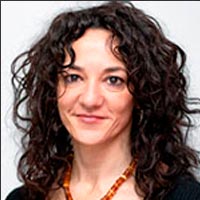 MARÍA PAZ PEÑA GARCÍ
Tutora del 2º curso (Grado en Educación Primaria; Doble Grado en Educación Primaria y en Educación Infantil; Doble Grado en Educación Primaria y Psicología).
Tutor
Doctora acreditada (ANECA) en Antropología y Trabajo Social y Licenciada en Pedagogía por la Universidad de Granada. Su investigación se enfoca en temas de Educación Intercultural, mediación, etnicidad, identidades, interseccionalidad y género, así como en la investigación e implementación de metodologías activas y emergentes para la inclusión. Es miembro activo del Grupo de Investigación Social Media y Educación Mediática Inclusiva y Ubicua (SMEMIU) en Madrid, así como del grupo de investigación “Innovación y mejora de la educación en Andalucía (HUM126)”. Además, ha participado como investigadora en varios proyectos europeos y de I+D, incluyendo el proyecto Knowledge Building Andalucía. También es autora de diversos artículos y capítulos de libros publicados en revistas y libros reconocidos en los campos de estudio.
MARÍA PAZ PEÑA GARCÍ
Tutora del 2º curso (Grado en Educación Primaria; Doble Grado en Educación Primaria y en Educación Infantil; Doble Grado en Educación Primaria y Psicología).
Tutor
Doctora acreditada (ANECA) en Antropología y Trabajo Social y Licenciada en Pedagogía por la Universidad de Granada. Su investigación se enfoca en temas de Educación Intercultural, mediación, etnicidad, identidades, interseccionalidad y género, así como en la investigación e implementación de metodologías activas y emergentes para la inclusión. Es miembro activo del Grupo de Investigación Social Media y Educación Mediática Inclusiva y Ubicua (SMEMIU) en Madrid, así como del grupo de investigación “Innovación y mejora de la educación en Andalucía (HUM126)”. Además, ha participado como investigadora en varios proyectos europeos y de I+D, incluyendo el proyecto Knowledge Building Andalucía. También es autora de diversos artículos y capítulos de libros publicados en revistas y libros reconocidos en los campos de estudio.
mpenaga@nebrija.es
 María del Pilar Salvá Soria
Tutora del 1º curso (Grado en Educación Primaria; Doble Grado en Educación Primaria y en Educación Infantil; Doble Grado en Educación Primaria y Psicología).
Tutor
Doctora en Filosofía con Mención Internacional por la Universidad Complutense de Madrid (UCM). Máster Universitario en Epistemología de las Ciencias Naturales y las Ciencias Sociales (UCM). Máster en Formación del Profesorado de Educación Secundaria Obligatoria y Bachillerato (Pontificia Comillas). Actualmente es Profesora Ayudante Doctora acreditada (ANECA). Sus áreas de investigación son la epistemología, la metodología de la investigación científica y el pragmatismo americano. Ha publicado en diversas revistas y editoriales especializadas de prestigio internacional. Ha participado en tres proyectos de innovación educativa financiados por la UCM, y actualmente es miembro del Grupo de Investigación financiado por el Ministerio, Cognitive Vulnerability, Verisimilitude and Truth (FFI2017-84826-P). Ha sido también cofundadora y presidenta de la Asociación de Epistemología de la Universidad Complutense de Madrid y miembro de la Sociedad Richard Rorty. Actualmente, coordina el Máster Propio en Ciencia y Filosofía: Construyendo el Futuro (UCM) y colabora con distintas universidades impartiendo clases y seminarios.
María del Pilar Salvá Soria
Tutora del 1º curso (Grado en Educación Primaria; Doble Grado en Educación Primaria y en Educación Infantil; Doble Grado en Educación Primaria y Psicología).
Tutor
Doctora en Filosofía con Mención Internacional por la Universidad Complutense de Madrid (UCM). Máster Universitario en Epistemología de las Ciencias Naturales y las Ciencias Sociales (UCM). Máster en Formación del Profesorado de Educación Secundaria Obligatoria y Bachillerato (Pontificia Comillas). Actualmente es Profesora Ayudante Doctora acreditada (ANECA). Sus áreas de investigación son la epistemología, la metodología de la investigación científica y el pragmatismo americano. Ha publicado en diversas revistas y editoriales especializadas de prestigio internacional. Ha participado en tres proyectos de innovación educativa financiados por la UCM, y actualmente es miembro del Grupo de Investigación financiado por el Ministerio, Cognitive Vulnerability, Verisimilitude and Truth (FFI2017-84826-P). Ha sido también cofundadora y presidenta de la Asociación de Epistemología de la Universidad Complutense de Madrid y miembro de la Sociedad Richard Rorty. Actualmente, coordina el Máster Propio en Ciencia y Filosofía: Construyendo el Futuro (UCM) y colabora con distintas universidades impartiendo clases y seminarios.
msalva@nebrija.es
 Marina Serrano Carot
Profesora y Tutor de TFG
Professor
Investigadora y profesora en la Facultad de Lenguas y Educación de la Universidad Nebrija. Doctoranda en Educación y Procesos Cognitivos en la misma universidad. Graduada en Psicología y Máster en Psicología Clínica General Sanitaria por la Universidad Complutense de Madrid. Como psicóloga clínica y social, ha colaborado con organizaciones sin ánimo de lucro ofreciendo apoyo a personas en situación de vulnerabilidad. Su experiencia abarca la atención a problemas de salud mental como depresión, ansiedad y enfermedad mental grave, así como el acompañamiento en gestión emocional, mediación familiar, hábitos de autocuidado y orientación económica en población adulta, adolescente y también infantil en situación de vulnerabilidad. Autora de publicaciones y ponente en congresos sobre procesos cognitivos, aprendizaje y desarrollo de la lectura. Miembro del grupo de investigación CINC (Centro de Investigación Nebrija en Cognición). Sus otras líneas de investigación incluyen psicología social, desigualdad, salud y educación.
Marina Serrano Carot
Profesora y Tutor de TFG
Professor
Investigadora y profesora en la Facultad de Lenguas y Educación de la Universidad Nebrija. Doctoranda en Educación y Procesos Cognitivos en la misma universidad. Graduada en Psicología y Máster en Psicología Clínica General Sanitaria por la Universidad Complutense de Madrid. Como psicóloga clínica y social, ha colaborado con organizaciones sin ánimo de lucro ofreciendo apoyo a personas en situación de vulnerabilidad. Su experiencia abarca la atención a problemas de salud mental como depresión, ansiedad y enfermedad mental grave, así como el acompañamiento en gestión emocional, mediación familiar, hábitos de autocuidado y orientación económica en población adulta, adolescente y también infantil en situación de vulnerabilidad. Autora de publicaciones y ponente en congresos sobre procesos cognitivos, aprendizaje y desarrollo de la lectura. Miembro del grupo de investigación CINC (Centro de Investigación Nebrija en Cognición). Sus otras líneas de investigación incluyen psicología social, desigualdad, salud y educación.mserranc@nebrija.es
More Academic Information
Official Degree:Bachelor's Degree in Primary Education
Profession regulated by the Order ECI / 3857/2007.
Possibility of obtaining a Concentration in: Foreign Language: English, Foreign Language: French, Hearing and Language, Therapeutic Pedagogy or Physical Education.
- Interest for knowledge in general.
- Respect for culture.
- Intellectual curiosity for the acquisition of new knowledge.
- Interest in acquiring international experience and expanding one's vision of the world.
- Interest in communicating in several languages, particularly in English, and knowing the cultures associated with these languages.
- Interest and sensitivity for literature, a taste for reading.
- Concern and curiosity about the manifestations of contemporary art, literature and culture and, in general, the humanities.
- Vocation for pedagogy.
- Interest in becoming proficient professionally.
- Respect for human rights and equality between people.
- Sensitivity towards people with disabilities.
The graduate in Primary Education from the Nebrija University will be trained for the educational attention to Primary Education students and for the preparation and monitoring of the pedagogical proposal referred to in Article 16 of the Organic Law 2/2006.
240 ECTS credits.
- Full-time:
Minimum: 45 créditos ECTS
Maximum: 90 créditos ECTS
- Part-time:
Minimum 12 créditos ECTS
Maximum: 45 créditos ECTS.
Access from professional vocational training: - According to the agreement signed with the CAM, a total of 42 ECTS credits will be recognized - For professional experience, a maximum of 36 ECTS credits will be recognized (RD 861/2010).
 Accredited
Accredited Degree
Center responsible:School of Language and Education
Branch of knowledge: Social Sciences
Available places: - Classroom attendance: 100
- Online: 450
Places will be offered for the bilingual modality only in Classroom attendance mode, in total 50 of the 100 verified places.
Places for each concentration in the classroom attendance modality:
- Concentration in Foreign Language English: 30
- Concentration in Therapeutic Pedagogy: 20
- Concentration in Hearing and Language: 20
- Concentration in Physical Education: 20
- Students who will not take the elective subjects linked to a concentration: 10
Places for each concentration in the online mode:
- Concentration in Foreign Language English: 100
- Concentration in Foreign Language French: 30
- Concentration in Therapeutic Pedagogy: 100
- Concentration in Hearing and Language: 50
- Concentration in Physical Education: 50
- Students who will not take the elective subjects linked to a concentration: 120
Academic year of verification by ANECA: 2011 - 2012
Academic year in which it was implemented:2012 – 2013
Type of Education: Classroom attendance / Online
Languages: This degree is taught in Spanish and English.
- Minimum level of English required upon admission:
A2 (monolingual modality).
B2 (Bilingual modality)
The English level tests consist of a written exam with multiple choice questions, oral and written comprehension, and use of the language. They are taken in person and are held in the computer rooms of the campus. It lasts approx. 60 minutes.
- Level of Spanish for non-Spanish speakers:
B2 (CEFR) in Spanish.
University Services: [+info]
Skills
Basic Skills- That students know how to possess and understand knowledge in an area of study that is part of general secondary education, and is usually found at a level that, although supported by advanced textbooks, also includes some aspects that imply knowledge coming from the vanguard of their field of study.
- That students know how to apply their knowledge to their work or vocation in a professional manner and have the competences that are usually demonstrated through the elaboration and defense of arguments and the resolution of problems within their area of study.
- That students have the ability to gather and interpret relevant data (usually within their area of study) to make judgments that include a reflection on relevant issues of social, scientific or ethical nature.
- That students can transmit information, ideas, problems and solutions to a specialized and non-specialized public.
- That the students have developed the necessary learning skills to undertake further studies with a high degree of autonomy.
The following are identified as General-Transversal Competences of the Undergraduate Degree in Primary Education:
- Ability to make use of the skills of intellectual work (understand, synthesize, outline, explain, expose, organize).
- Ability to use a basic methodology for researching sources: analysis, interpretation and synthesis.
- Ability to manage information.
- Ability to clearly explain, orally and in writing, complex problems and projects within their field of study.
- Ability for learning and autonomous work.
- Ability to work as a team, integrate into multidisciplinary groups and collaborate with professionals from other fields.
- Ability for self-initiative, self-motivation and perseverance.
- Heuristic and speculation ability to solve problems in a creative and innovative way.
- Ability to carry out new projects and action strategies in real situations and in different areas of application, from a humanistic perspective.
- Ability for interpersonal communication, awareness of the capabilities and own resources.
- Ability for adapting to new situations.
- Ability to recognize diversity and respect multiculturalism.
- Sensitivity towards environmental issues and towards cultural and linguistic heritage.
- Ability to document one's own culture and acquire the knowledge and ability to communicate with other cultures.
- Ability to acquire and fulfill a professional ethical commitment.
- Ability to integrate, through critical reflection, what has been learned in its theoretical and practical dimensions and apply it to mediation in intercultural conflicts and multilingual spaces.
- Ability to use new information and knowledge technologies for the organization, planning and development of academic and professional activities.
- Ability to use self-evaluation and co-evaluation.
- Have the necessary training base to continue postgraduate studies (Master's degree), nationally or internationally.
- Knowledge and respect for fundamental rights and equality between men and women.
- Respect for the principles of equal opportunities, non-discrimination and universal accessibility for people with disabilities.
The block of specific competences can be grouped into two sections. On the one hand, Common Specific Competences referred to the Undergraduate Degree in Primary Education and, on the other hand, Specific Modular Competences, being these either basic training, didactic-disciplinary training or belonging to the practicum.
Common Specific skills:
- Know the curricular areas of Primary Education, the interdisciplinary relationship between them, the evaluation criteria and the body of didactic knowledge around the respective teaching and learning procedures.
- Design, plan and evaluate teaching and learning processes, both individually and in collaboration with other teachers and professionals of the center.
- Effectively address situations of language learning in multicultural and multilingual contexts.
- Encourage reading and critical commentary of texts from the various scientific and cultural domains contained in the school curriculum.
- Design and regulate learning spaces in contexts of diversity that address gender equality, equity and respect for human rights that make up the values of citizenship education.
- Promote coexistence in the classroom and outside of it, solve discipline problems and contribute to the peaceful resolution of conflicts.
- Stimulate and value the effort, perseverance and personal discipline of the students.
- Know the organization of primary schools and the diversity of actions that comprise its operation.
- Perform tutoring and guidance functions with students and their families, addressing the unique educational needs of students.
- Assume that exercising the teaching function has to be perfected and adapted to scientific, pedagogical and social changes throughout life.
- Collaborate with the different sectors of the educational community and the social environment.
- Assume the educational dimension of the teaching function and promote democratic education for active citizenship.
- Maintain a critical and autonomous relationship with respect to public and private knowledge, values and social institutions.
- Value individual and collective responsibility in achieving a sustainable future.
- Reflect on practical classroom lessons to innovate and improve teaching.
- Acquire habits and skills for autonomous and cooperative learning and promote it among students.
- Know and apply information and communication technologies in the classroom.
- Selectively discern audiovisual information that contributes to learning, civic education and cultural wealth.
- Understand the role, possibilities and limits of education in today's society and the fundamental competences that affect primary schools and their professionals.
- Know models of quality improvement with application to educational centers.
Specific modular skills
Next, the Specific Modular Competences of the Undergraduate Degree in Primary Education are listed. These Specific Modular Competences are detailed below organized by modules, according to whether they belong to the block of basic training, didactic-disciplinary or the practicum.
Module: Learning and personality development
- Understand the learning processes related to 6-12 period in the family, social and school contexts.
- Know the characteristics of these students, as well as the characteristics of their motivational and social contexts.
- Master the necessary knowledge to understand the personality development of these students and identify dysfunctions.
- Identify learning difficulties, inform about them and collaborate in their treatment.
- Know the proposals and current developments based on the learning of competences.
- Identify and plan the resolution of educational situations that affect students with different abilities and different learning paces.
Module: Educational processes and contexts
- Understand the learning processes related to the 6-12 period in the family, social and school contexts.
- Know the basics of primary education.
- Analyze the teaching practice and the institutional conditions that frame it.
- Know the historical evolution of the educational system in our country and the political and legislative conditions of the educational activity.
- Know the processes of interaction and communication in the classroom.
- Address and solve discipline problems.
- Promote cooperative work as well as individual work and effort.
- Promote education actions in values oriented to the preparation of an active and democratic citizenship.
- Know and deal with school situations in multicultural contexts.
- Design, plan and evaluate teaching activity and learning in the classroom.
- Know and apply innovative experiences in primary education.
- Participate in the definition of the educational project and in the general activity of the center according to quality management criteria.
- Know and apply methodologies and basic techniques of educational research and be able to design innovation projects by identifying evaluation indicators.
Module: Society, family and school
- Show social skills to understand families and make themselves understood by them.
- Know how to exercise the functions of tutor and counselor in relation to family education in the 6-12 period.
- Relate education with the environment, and cooperate with families and the community.
- Critically analyze and incorporate the most relevant issues of current society that affect family and school education: the social and educational impact of audiovisual languages and screens; changes in gender and intergenerational relationships; multiculturalism and interculturality; discrimination and social inclusion and sustainable development.
- Know the historical evolution of the family, the different types of families, lifestyles and education in the family context.
Module: Teaching and Learning Experimental Sciences
- Understand the basic principles and fundamental laws of the experimental sciences (Physics, Chemistry, Biology and Geology).
- Know the school curriculum of these sciences.
- Pose and solve problems associated with science in everyday life.
- Value the sciences as a cultural fact.
- Recognize the mutual influence between science, society and technological development, as well as relevant citizen behaviors, in order to achieve a sustainable future.
- Develop and evaluate curriculum contents through appropriate teaching resources and promote the acquisition of basic skills in students.
Module: Teaching and learning Social Sciences
- Understand the basic principles of the social sciences.
- Know the school curriculum of the social sciences.
- Integrate historical and geographical study from an instructive and cultural orientation.
- Promote the democratic education of citizens and the practice of critical social thinking.
- Value the relevance of public and private institutions for peaceful coexistence among peoples.
- Know religion throughout history and its relationship with culture.
- Develop and evaluate curriculum contents through appropriate teaching resources and promote the acquisition of basic skills in students.
Module: Mathematics
- Acquire basic mathematical skills (numerical, calculation, geometric, spatial representations, estimation and measurement, organization and interpretation of information, etc.).
- Know the math school curriculum.
- Analyze, reason and communicate mathematical proposals.
- Pose and solve problems related to everyday life.
- Value the relationship between mathematics and science as one of the pillars of scientific thought.
- Develop and evaluate curriculum contents through appropriate teaching resources and promote the acquisition of basic skills in students.
Module: Languages
- Understand the basic principles of language and communication sciences.
- Acquire literary training and learn about children's literature.
- Know the school curriculum of languages and literature.
- Speak, read and write correctly and appropriately in the official languages of the corresponding Autonomous Community.
- Know the learning process of written language and its teaching.
- Encourage reading and encourage writing.
- Know the difficulties for learning the official languages of students of other languages.
- Address situations of language learning in multilingual contexts.
- Express themselves orally and in writing in a foreign language (English) (at C1 level in the bilingual modality and B1 in the monolingual modality).
- Develop and evaluate curriculum contents through appropriate teaching resources and promote the acquisition of basic skills in students.
Module: Musical, plastic and visual education
- Understand the principles that contribute to the cultural, personal and social formation from the arts.
- Know the school curriculum of artistic education, in its plastic, audiovisual and musical aspects.
- Acquire resources to encourage participation throughout life in musical and plastic activities inside and outside the school.
- Develop and evaluate curriculum contents through appropriate teaching resources and promote the acquisition of basic skills in students.
Module: Physical Education
- Understand the principles that contribute to cultural, personal and social formation from physical education.
- Know the physical education school curriculum.
- Acquire resources to encourage participation throughout life in sports activities inside and outside the school.
- Develop and evaluate curriculum contents through appropriate teaching resources and promote the acquisition of basic skills in students.
Practicum Module:
- Acquire practical knowledge of the classroom and its management.
- Know and apply the processes of interaction and communication in the classroom and master the social skills and abilities needed to foster a classroom climate that facilitates learning and coexistence.
- Control and monitor the educational process and in particular the teaching-learning process by mastering the necessary techniques and strategies.
- Relate theory and practice to the reality of the classroom and the center.
- Participate in the teaching activity and learn how to carry it out, acting and reflecting from practice.
- Participate in the improvement proposals in the different areas of action that can be established in a center.
- Regulate interaction and communication processes in groups of students aged 6-12.
- Know ways of collaboration with the different sectors of the educational community and the social environment. These competences, together with those of the other subjects, will be reflected in the Final Research Project that summarizes the training acquired throughout all the teachings described.
Online Studies
The suitability of the distance learning modality for the Bachelor's Degree in Primary Education is justified due to the existing need to grant access to the teachings of this degree to all those people who, for personal or professional reasons, have difficulties in traveling to a university campus, either due to lack of time, physical mobility problems, because the degree is not taught in their city or a nearby one, etc.
Likewise, with this distance learning modality, the aim is to give access to the Bachelor's Degree in Primary Education to people who are active, from other related areas, who wish to complement their studies with this degree, or who wish to begin these studies.
Certain social conditions, such as geographical isolation, lack of mobility, lack of time, have a negative impact on the possibility of obtaining studies. These situations can be resolved with the help of electronic means aimed at distance education, since the student is freed from the constraints of time and space, which makes the student's dedication more flexible, regulating it according to their context.
The advantages of the distance learning modality are many: the autonomy of the student in terms of learning, self-assessment and updating of knowledge, the usefulness of teamwork, as well as the quantity and quality of educational resources. In addition, this modality reaches students with different cognitive styles and different learning strategies.
Additionally, this modality acquires great importance due to the social and professional demand for proposals and implementation of digital learning resources for curricular planning with an open, flexible and distance methodology.
The student must take 240 credits.
The admission profile is that of a student who wants to prepare for the regulated profession of Primary Education. The student acquires personal and professional experience of inestimable value for their subsequent entry into the labor market through internships in different educational centers.
Calendar
Academic Calendar Education Academic Calendar
Schedules
Schedules first semester Schedules second semester Academic agenda of the online modalityAdmission criteria
The access channels to study the Undergraduate degree level courses are those indicated in art. 3 of Royal Decree 412/2014, of June 6, which establishes the basic regulations for the admission procedures to the official undergraduate university courses. In addition, at Nebrija University it is necessary to pass the specific Admission Tests of each degree, whose content and specific procedure will be listed in section 4.2. Access requirements and admission criteria of this section number 4.
From academic years 2014/2015 to 2016/2017 and as established in RD 412/2014, for students who have passed the 2nd year of Baccalaureate, Nebrija University respects the provisions of Article 13 of RD 1892/2008 and its subsequent modifications about passing the university entrance exam:
“Access to the Spanish university, both public and private, to attend the courses leading to obtaining the various degrees of the official university degree programs valid throughout the national territory will require, in general, the passing of the test. referred to in article 38 of the Organic Law 2/2006, of May 3, on Education, which is regulated in this royal decree, without prejudice to the other cases provided for in article 3 of this royal decree.”
“The students who hold degrees of Senior Technician of Vocational Training, Senior Technician of Plastic Arts and Design or Senior Sports Technician, as well as students coming from foreign educational systems and those who hold the European Baccalaureate degree or the International Baccalaureate Diploma may access Nebrija University only after passing the entrance tests of the University, without it being necessary to pass the University Entrance Exam (PAU).”
With respect to the entrance of non-native speaking students of Spanish, the same profile as that of Spanish speakers will be required and they must also demonstrate their communicative competence in oral and written Spanish language at a B2 level of the Common European Framework of Reference for teaching, learning and evaluation of languages.
As of the 2017/2018 academic year, all students who meet the access requirements legally established in RD 412/2014 will be able to access the Undergraduate studies after passing the University's own Entrance Tests.
Students who are in any of the following academic situations can apply for admission in the first year of the Undergraduate Degree in Primary Education:
- Students from 2nd year of Baccalaureate and University Entrance Exam, or COU (College Preparation Courses) and University Entrance Exam (academic year 2014/2015, 2015/2016 and 2016/2017).
- Students holding the Baccalaureate degree of the Spanish Educational System or of another declared equivalent (academic year 2017/2018 and later).
- Students holding Baccalaureate degrees, diplomas or studies from educational systems of Member States of the European Union or other States with which international agreements applicable in this regard have been signed.
- Students holding degrees, diplomas or studies recognized as the Baccalaureate degree of the Spanish Educational System obtained in educational systems of member states that are not members of the EU with which no international agreements have been signed for the recognition of the Bachelor's degree. In this case, the prior approval of the degree will be necessary.
- Students holding the official degrees of Senior Vocational Training Technician, Senior Plastic Arts and Design Technician or Senior Sports Technician, belonging to the Spanish Educational System or degrees, diplomas or studies declared equivalent or homologated to said degrees.
- Students holding degrees other than those indicated in the previous sections, when said students meet the academic requirements demanded in said State to access their Universities.
- Persons over 25 years of age who pass the access test established in RD 412/2014.
- Persons over 40 years of age with work or professional experience in relation to the education for which they request admission.
- Persons over 45 years of age who pass the access test established in RD 412/2014.
- Students holding an official Undergraduate Degree, Master's Degree or equivalent degree.
- Students holding the official university degree of University Associate's Degree, Technical Architect, Technical Engineer, Undergraduate Degree, Architect or Engineer, corresponding to the previous organization of university education or equivalent degree.
- Students who have completed partial foreign or Spanish university studies or who, having completed foreign university studies, have not obtained their homologation in Spain. It will be an indispensable requirement that the university has recognized at least 30 ECTS credits. In the cases in which the homologation of any degree, diploma or study obtained abroad for access to the University is required, the Antonio de Nebrija University may admit students conditionally who prove having submitted the corresponding application of the homologation while the procedure of said homologation is resolved. Within the Academic Planning Plan currently in force at the University, the "POA_7 Conditional Enrollment Procedure" has been developed, which includes these cases.
- Students who were able to access the university according to ordinances of the Spanish Educational System prior to the Organic Law 8/2013, of December 9.
- In case of students with special educational needs derived from disability, the need for possible curricular adaptations, itineraries or alternative studies will be evaluated.
Teachings that are taught in other modalities: "blended" or "distance learning".
Students who access the University to study in the blended modality will have the same mechanisms of prior information as those in the classroom attendance modality (web page and brochures, among others). The Department of Promotion and Admissions is responsible for providing personalized academic information to those who request it, to monitor and facilitate collaboration in the different phases of prior information and access to the University.
Students who study this modality require a more complete information process, since the students must know precisely what is the teaching methodology used, the teaching-learning method, the available means, documentation, resources, software, etc. However, the University website, in each degree taught in blended or distance learning modalities, provides detailed information on the methodology and activities to be carried out throughout the academic years of the curriculum.
To do this, during the week of the start of the academic year, the student will receive through the virtual campus a technical guide with information related to resources, the use of the campus, and general information about the academic year. An academic guide will also be sent for each of the subjects.
Finally, it is important to point out that prior to enrollment, students will be informed that in order to comply with section 5 of ORDER ECI/3857/2007, the Practicum will be carried out in primary education centers recognized as practices training centers through agreements between the Educational Administrations and the Universities, providing -prior to enrollment- the students with information about the Autonomous Communities with which the university has signed an agreement and the requirements.
Access requirements
The access channels to the Undergraduate Degree in Primary Education have been described previously in the section Information Systems prior to enrollment.
The Antonio de Nebrija University will make public on its website the offer of places available for the first year of the Undergraduate Degree in Primary Education, distributing as best it considers the number of places awarded for each modality of the degree.
Admission criteria
At the Antonio de Nebrija University, the admission procedures established by university legislation will be carried out with particular reference to the guiding principles of access to the Spanish university: equality, merit, ability, universal accessibility and adjustment to the criteria of the European Space of Higher Education.
The admission process consists of several phases that are described below:
- 1.- Submitting documentation
All candidates wishing to apply for admission must submit the following documentation:- 1.- Admission application duly completed and signed.
- 2.- Receipt of payment of registration fees.
- 3.- Photocopy of DNI (on both sides) or passport.
- 4.- Two passport-size photographs.
- 5.- Although it is not a mandatory document, a letter of introduction from a teacher/tutor from the center of origin where the student has completed the studies is recommended, and that it be accompanied by the academic documents presented for the candidacy.
In addition, according to the access channel of the student to the Undergraduate Degree, the following documentation will be requested:
- 6.- Academic record of Baccalaureate
- 7.- University Access Test (PAU)
- 8.- Access credentials to the Spanish University issued by the UNED, for students coming from the International Baccalaureate or with a Baccalaureate Degree in the European Community.
- 9.- Specific University Entrance test for international students
- 10.- For candidates with university degrees or with Higher Level Education Cycles, academic record of the degree studied.
- 11.- For the students that come by transfer of records, academic record of the studies taken and curriculum of each one of the subjects passed
- 2.- Admission Tests
For the purposes of pre-admission and admission, the evaluation of the candidate will be carried out taking into account the following criteria and percentages:
- 1.- Academic transcript/record of the student's route of origin: 60%
- 2.- Personal interview: 20%
The candidate's suitability will be assessed by virtue of their experience, knowledge, technical and professional skills required for the successful progress in the studies they intend to take. Their motivation and attitudes will also be assessed, as well as other personal aspects that contribute to their adequate adjustment to the chosen studies. The interview may be conducted in the language in which the studies are taught and in writing. - 3.- Candidate presentation document: 20%
In a personally prepared document, candidates will present their motivation and interest in the studies requested, as well as any other personal circumstance that they consider relevant to the selection process.
Specific Admission Procedures:
English Language Placement Test
In addition, candidates who wish to enroll in bilingual programs or programs that include an English-language track at Nebrija University must take an English placement test as part of the admissions process. This assessment, administered by the university's Institute of Modern Languages, consists of a written examination with multiple-choice questions that evaluate both oral and written comprehension. The test lasts 60 minutes.
The primary objective of the placement test is to evaluate applicants' language proficiency in order to determine their suitability for the bilingual or monolingual program. It also provides a general assessment of each student's English level, which enables the university to offer appropriate support and ensure academic success.
To access the monolingual program, candidates must demonstrate at least an A2 level according to the Common European Framework of Reference for Languages (CEFR). For the bilingual program, a B2 level or higher is required.
Applicants whose native language is not Spanish must present a recognized certificate demonstrating a B2 level of Spanish in order to be admitted to the program. Likewise, those whose native language is not English must provide certification of a B2 level of English in order to access the bilingual program.
All placement test results, together with candidates' academic records, are reviewed by the Bachelor's Degree Admissions Committee. This committee makes admission decisions based on the criteria established in the "Procedure for the Operation of the Bachelor's Degree Admissions Committee," which forms part of the internal regulations governing access to the university.The psychometric abilities test, administered by the Psychopedagogical Guidance Office, is designed to evaluate key competencies and skills in candidates beyond their academic performance. This assessment focuses on areas such as verbal aptitude, reasoning, numerical aptitude, and spelling. It provides a comprehensive overview of each applicant's profile in order to assess their suitability for and ability to adapt to the university environment, particularly within the field of education.
The total estimated duration of the test is 88 minutes, including instructions. - 3.- Completion of enrollment
Once the profile of each candidate has been assessed and studied and the admission tests have been passed, the candidate is informed of the admission, in such a way that the student can begin to formalize their enrollment. Enrollment consists of the following phases:- Pre-enrollment
Candidates must make reserve a place. This economic pre-enrollment guarantees the place of the candidate at the University. - Enrollment
The pre-enrolled candidates who wish to formalize their academic enrollment in the University must, within the indicated periods, follow the following steps:- 1.- Submit documentation: prove that he/she meets the requirements established by Spanish university legislation to be able to start university studies.
- 2.- Formalize of the enrollment process via the Internet: The self-enrollment service of the Nebrija website allows admitted students to complete all the academic, economic and administrative procedures within the established deadlines. To do this, they will receive at their address, along with their admission letter, the personal access code and password necessary to carry out their self-enrollment. Once the self-enrollment is completed, the candidate acquires the condition of student of Nebrija University
- Pre-enrollment
Only candidates who have submitted the required documentation within the deadlines established by the Admissions Department will be processed. In addition, the student will be asked for all the additional information considered appropriate to know the suitability of the candidate for the Undergraduate degree.
Change of modality
The Undergraduate Degree in Primary Education from the Antonio de Nebrija University does not allow the simultaneity of teaching modalities, but rather the change of modality from classroom attendance to blended learning, or vice versa. The following are the specific regulations for the change of modality, Article 7 of the General Regulations of the Student Body:
General Regulations of the Student Body
Article 7. Changes in enrollment
Si el alumno, estando matriculado en determinada titulación, materia, opción o programa decidiera cambiar su matrícula, deberá solicitarlo mediante escrito dirigido a la Secretaría General de Cursos para su autorización.
If the student is enrolled in a certain degree, subject, option or program and decides to change his/her enrollment, he/she must request it by writing to the General Secretary of Courses for authorization.
Students who wish to change the modality in which they study a degree, from classroom attendance to distance learning modality, or vice versa, must request it in writing to the Courses Secretary that will authorize it or not, after having the report from the Department that will conduct a personal interview with the student who wants to change the modality, in which the interviewer will assess whether the candidate's work and personal situation, his/her availability of time, etc. is compatible with the normal development of the process and teaching-learning activities with the expected teaching load. As a result of this joint analysis, which will entail a mutual exchange of information, students can be guided on their real possibilities, the recommended annual enrollment fee, the mandatory presence in some activities (exams, etc.) or even reject their candidacy if a probable impossibility to carry out the programmed formative activities satisfactorily is detected.
In no case may the quota for each of the verified modalities be exceeded.
The objective criteria that will be used to authorize or not change the modality will be the following:
- First, the availability of authorized places in the destination modality will be assessed. If the number of candidates is greater than the number of places available, the following preference criteria will be applied to authorize the change of modality:
- Priority will be given to the best academic record assessed by means of the average grade of the subjects passed up to that moment in the original modality.
- Preference will then be given to duly accredited changes of residence, which justify the need to change the modality.
- As a third criterion, priority will be given to those who accredit changes in the employment situation that justify the need to change the modality.
- The change of option, program or modality in no case supposes any right of the student to request the refund of any amount already paid or that he/she was obliged to pay.
Specific access tests
Also, to access the Undergraduate Degrees in Primary Education they must pass a specific test of access, coordinated by the Commission created for this purpose in the Community of Madrid, which will aim to assess the knowledge, skills and competences that are considered essential to be able to successfully carry out the educational activities of the curriculum. The test, which will take place in each university, can be done in several calls.
The Specific Access Test will be set according to the criteria established by the Commission, which will publish the calendar and conditions for pre-registration and testing, a detailed description of its contents and the evaluation criteria. In the organization of the test, full respect of the principles of equality, merit and ability will be guaranteed, in all cases adjusting to what the basic state regulations establish, in accordance with articles 38 LOE and 42.3 LOU.
Until the introduction of the Specific Access Test, said test will be considered as passed, obtaining a grade equal to or greater than 5 in the Spanish Language and Literature of the general phase of the University Entrance Exam, or when the final grade of admission for Primary Education was equal to or greater than 9. Those students who want to access the University through access channels other than the University Entrance Exam must accredit an admission grade equal to or greater than 6.
These requirements will not apply when the access channel to the Undergraduate Degree in Primary Education is by transfer or change of the record that has its origin in other higher education than the Undergraduate Degree in Early Childhood Education or Primary Education.
Employability
Career Opportunities
Profession regulated by ORDER ECI/3857/2007, of December 27.
This degree qualifies one for the regulated profession of Teacher in Primary Education.
Graduates of this degree will be able to work as teachers in Primary Education with children from 6 to 12 years old, in:
On the other hand, they can go into sectors of different nature, but require the knowledge of a graduate in Primary Education, such as:
International
After studying the curriculum map of Nebrija University's Bachelor's degrees, the Secretariat of Higher Education, Science, Technology and Innovation of Ecuador (SENESCYT) recognizes this Bachelor's degree through document number SENESCYT-SGES-SFA-2019-0722-O
The International Mobility Office of Nebrija University makes a constant effort to monitor the agreements with the most prestigious universities. Students may study an annual or semi-annual period in universities in Europe, America, Asia and Australia. This option will expand their vision of the world as well as their linguistic training, and will prepare them to rigorously perform their professional work anywhere in the world. Some of the Universities with which Nebrija University has established agreements are:
NOTE: The host universities offered by degree may vary according to the International Mobility Program. For more up-to-date information, students can consult the online information in the International Mobility Program.
The information published here is for guidance only and may be subject to modification.
Several universities have special academic or linguistic requirements. For more information, consult the Department of International Programs
For more information about academic and linguistic requirements, contact the Faculty's international coordinator: Cristina Herrero Fernández.
Specialized Classroom for Education
Nebrija University Education students undergo training at the newly renovated Madrid-Arturo Soria Languages and Education Campus, equipped with modern facilities tailored for teaching and learning. An exemplary feature of this campus is the specialized classroom, designed for students to hone and apply techniques essential for their future careers as educators.
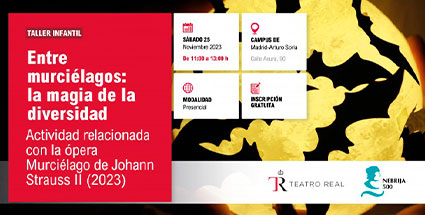
Children's Workshop "Among Bats"
As part of the activities alongside the Royal Theater project, students enrolled in the Education Degrees have organized a workshop centered around Johann Strauss II's opera, "The Bat.".
See articleLet’s talk about Education
Second chapter of the video podcast specialized in Education, which discusses emotions in the classroom and how they affect language learning.
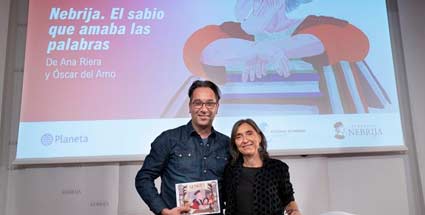
Nebrija, the wise man who loved words
Presentation of the illustrated book on Antonio de Nebrija aimed at children between 8 and 11 years old. A graphic and educational approach to the life of the father of Spanish grammar.
See news
Minors and Social Networks
Study published by Mónica Moreno and Mercedes Pedrajas, professors at the University, on the addiction of minors to Social Networks and the possible solutions available to families.
See news



